
Prologue: The Girl in the Flames

The fire seared her skin.
The flames danced before her eyes like a living creature, writhing and twisting as they wrapped around her small, fragile body.
Iron chains bit into her arms, binding her to the stake.
And yet, she looked only to the sky.
Someone was crying.
Someone was screaming.
But none of it reached her.
—It was silent.
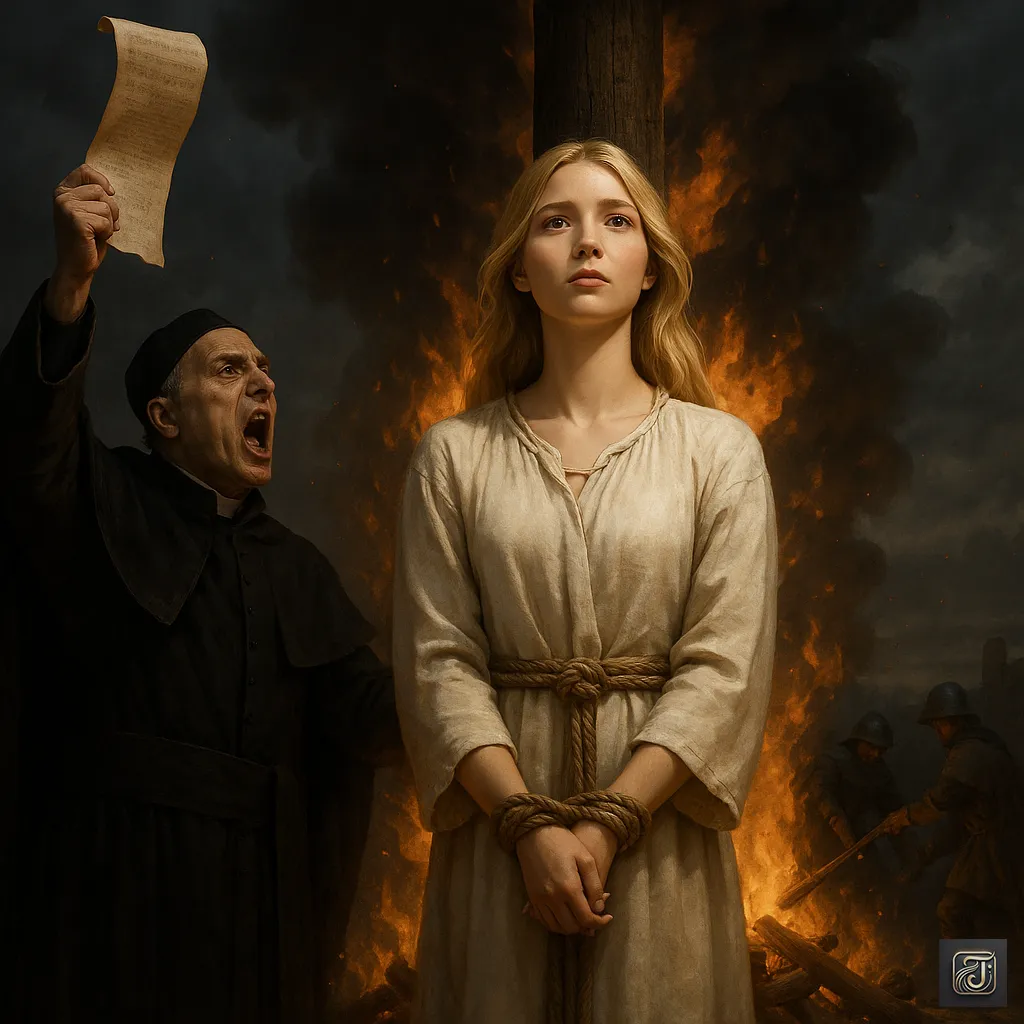
“This woman, a relapsed heretic—shall be burned!”
Behind the priest’s cry, a soldier tossed more wood onto the fire.
Thick black smoke tore through the sky.
The girl’s lips moved—just barely.
“God… please… save France…”
Her voice was devoured by the flames.
But the words—they were there.
Her name was Joan of Arc.
A peasant girl.
The one they called the Maid of Orléans.
The savior of France.
Her story was supposed to end there—
With the king saved, the nation delivered,
and the girl betrayed… then burned.
—Supposed to.
But within the fire,
Her soul still speaks.

Joan of Arc:
“I… heard the voice of God.”
And so, the story turns back in time—
to the day when she was still a nameless girl,
unknown to the world,
But already been chosen by fate.
Chapter 1: The Shadow of the Prince

In the year 1420, King Charles VI of France passed away.
His son, the Dauphin—Charles VII—should have inherited the throne.
But France did not recognize him as king.
Standing in his way were the English army and the powerful Burgundian faction.
They refused to acknowledge Charles VII’s legitimacy,
and instead sought to place the King of England on the French throne.

The young Charles was riddled with doubt.
And who could blame him?
His mother, Isabeau of Bavaria, was infamous throughout the French court for her indulgent ways—
so much so that she was known as the wanton queen.
And it was this very mother who had once said to him—
to her own son—
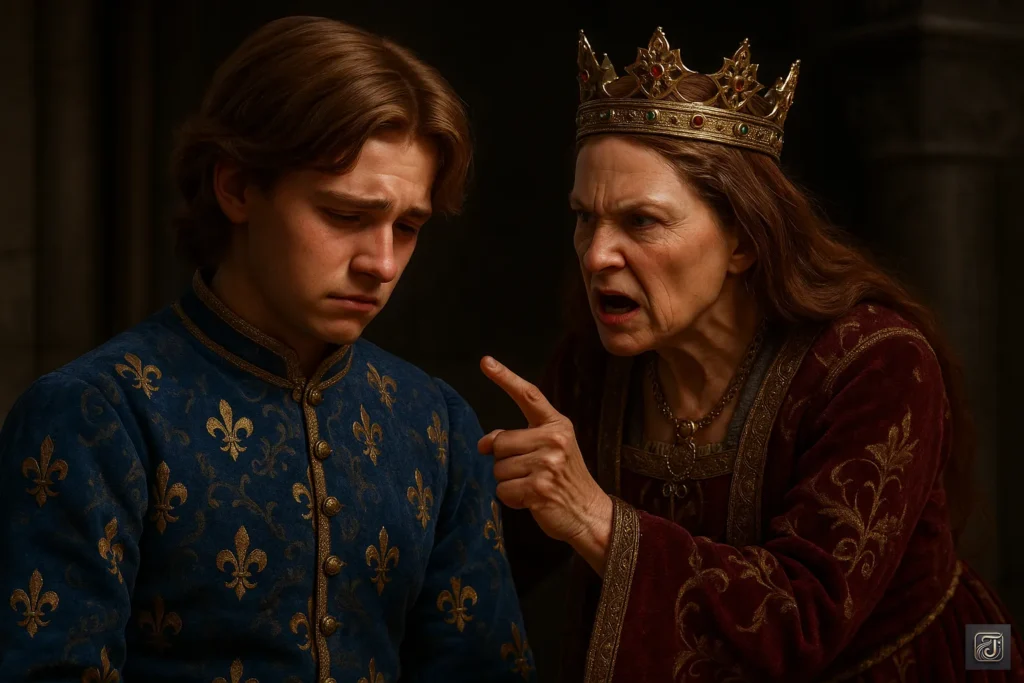
Isabeau of Bavaria:
“You are a child born of sin.”
“You are not the king’s son.”
“Therefore, you have no right to the throne!”
…Too cruel.
How could a boy, told such words by his own mother,
Ever believe he was meant to be king?
How could he carry the weight of France on his shoulders?
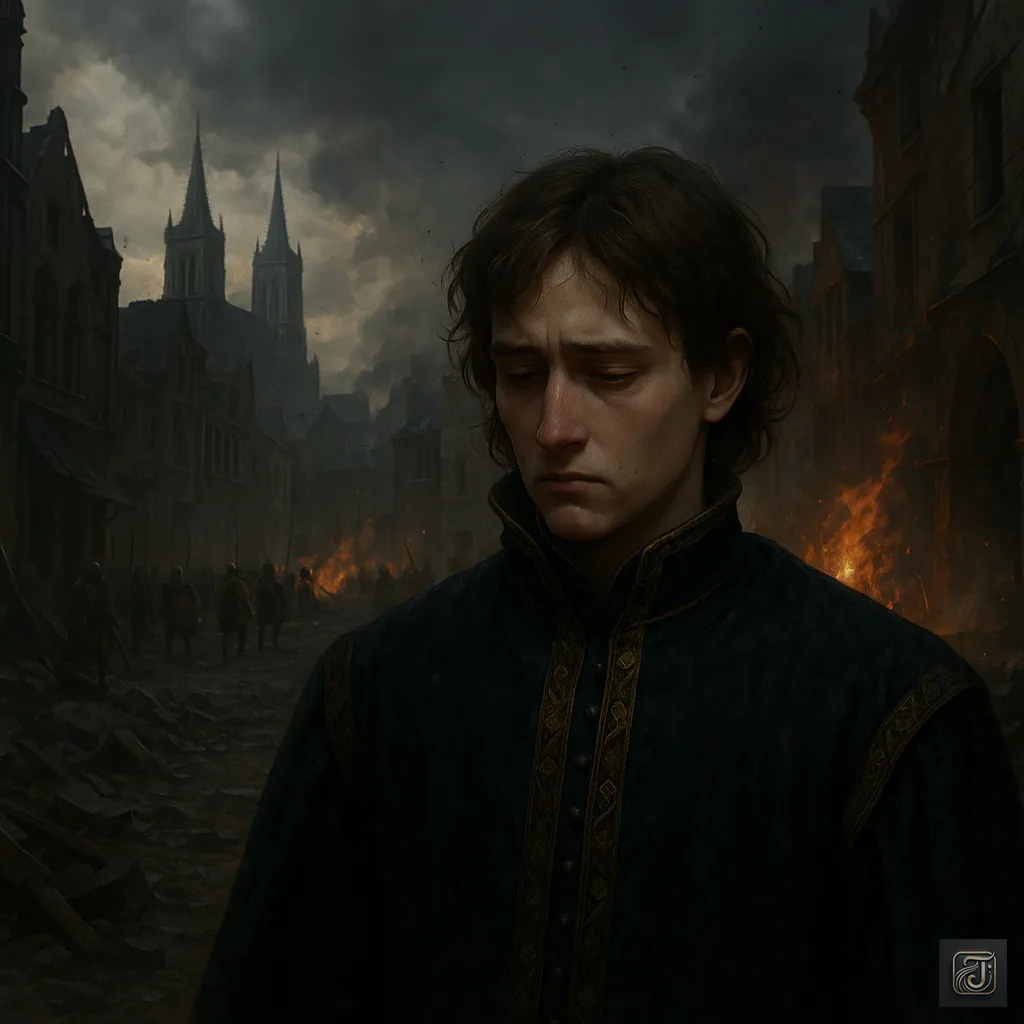
Charles was losing—again and again.
Half of France had fallen under English occupation, and he had little support from the people.
He had nothing to be proud of.
No sense of pride, no confidence.
Could such a man ever rise as king amidst the fires of war?
And so, this story begins—
In the shadow of a dark and broken France.
Chapter 2: The Girl Who Heard the Voice of God

Domrémy, in the region of Lorraine.
Though the scent of war drifted on the wind, the village remained quiet.
Only the bleating of goats and the rustling waves of wheat filled the air.
At the edge of the golden field, Jeanne knelt and made the sign of the cross.

Joan of Arc:
“…Please, let no one die today.”
It was her daily prayer.
For Jeanne, who had just turned thirteen, prayer was more essential than food itself.
As she listened to the distant sound of the church bells, she looked up at the sky.
That was when it happened.
A voice echoed—not from afar, but from deep within her mind.

Someone:
“Jeanne. You will save France.”
—Huh?
At first, she thought it was the wind.
But no—it was real. She had heard it.
The meaning of the words, the weight of the voice—
It echoed with the same power and clarity as a priest’s sermon in church.

Joan of Arc:
“…God?”
She trembled—but not from fear.
It felt as though a fire had been lit deep within her chest.
From that day on, Jeanne began to hear the voices again and again.
Michael, Catherine, Margaret—
saints who spoke to her, one after another, calling her by name.
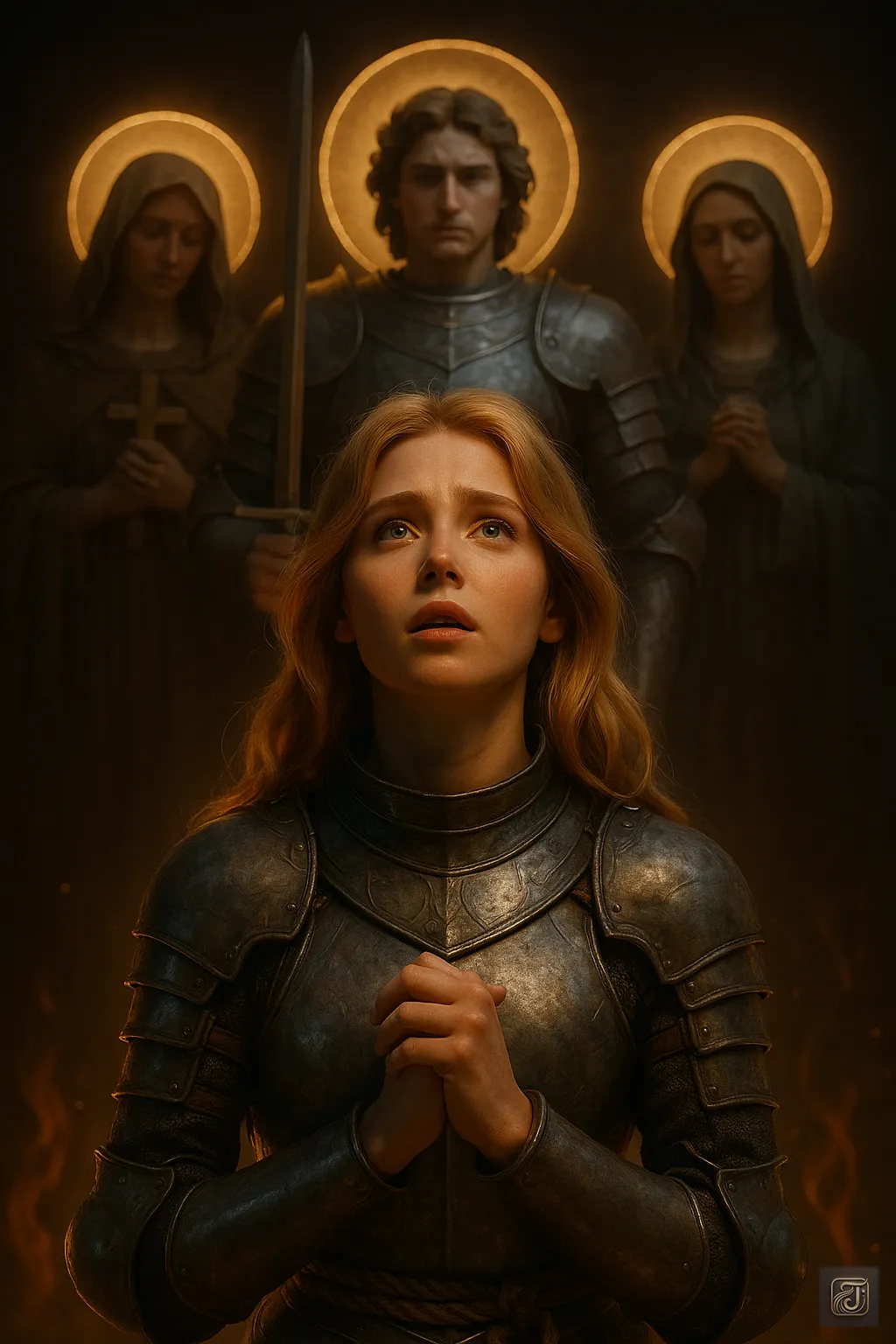
Gods:
“You are the one who has been chosen.”
“Crown Charles as king.”
“Save Orléans.”
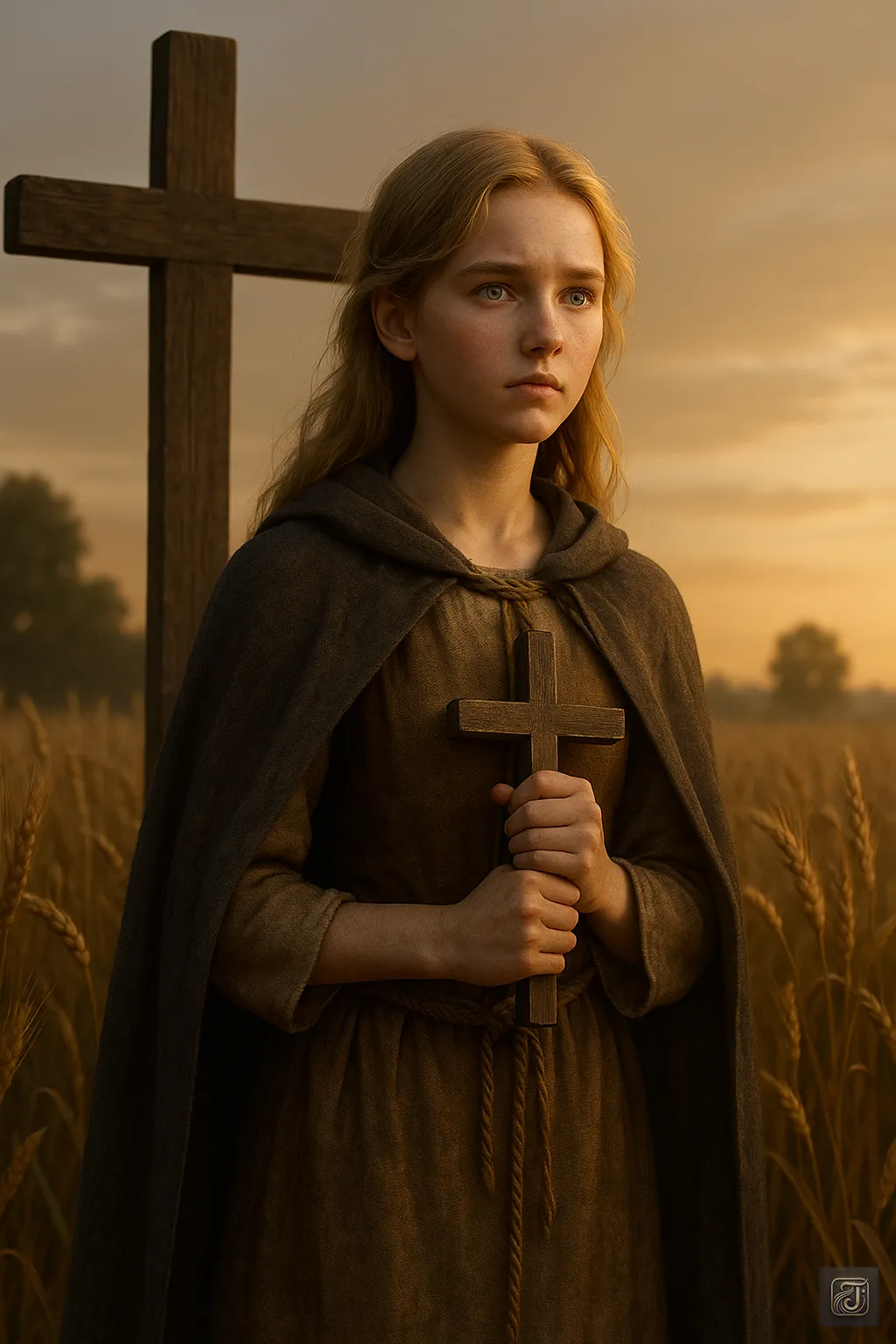
Joan of Arc:
“Chosen? Me?”
“A girl who bakes bread in the village, tends to her little sister, and hangs laundry by the river—me?”
Night after night, Jeanne prayed, seeking answers.
This was no dream.
It was the will of God.
And with that conviction,
She rose.

Joan of Arc:
“I must go.
I must meet the Dauphin Charles.
I must save France.”

At first, the villagers laughed.
People:
“Go to war? A girl? Meet the king? How?”
But the light in Jeanne’s eyes burned brighter than anyone else’s in the village.
Before long, the whispers began.

Joan of Arc:
“…Maybe Jeanne really did hear the voice of God.”
“Maybe… she could work a miracle.”
And so the young peasant girl set out, guided by faith alone.
No sword. No shield.
Only a single divine mission:
“Save France.”
Chapter 3: The Miraculous Visitor

In the final days of winter, 1429,
Jeanne d’Arc set out on her journey.
At the end of the road waited the Dauphin, Charles.
To reach him, she would have to pass through battle-hardened soldiers,
and endure the scornful laughter of nobles.
Her first stop was the town of Vaucouleurs.
There, she made a direct appeal to the local garrison commander—
Robert de Baudricourt.
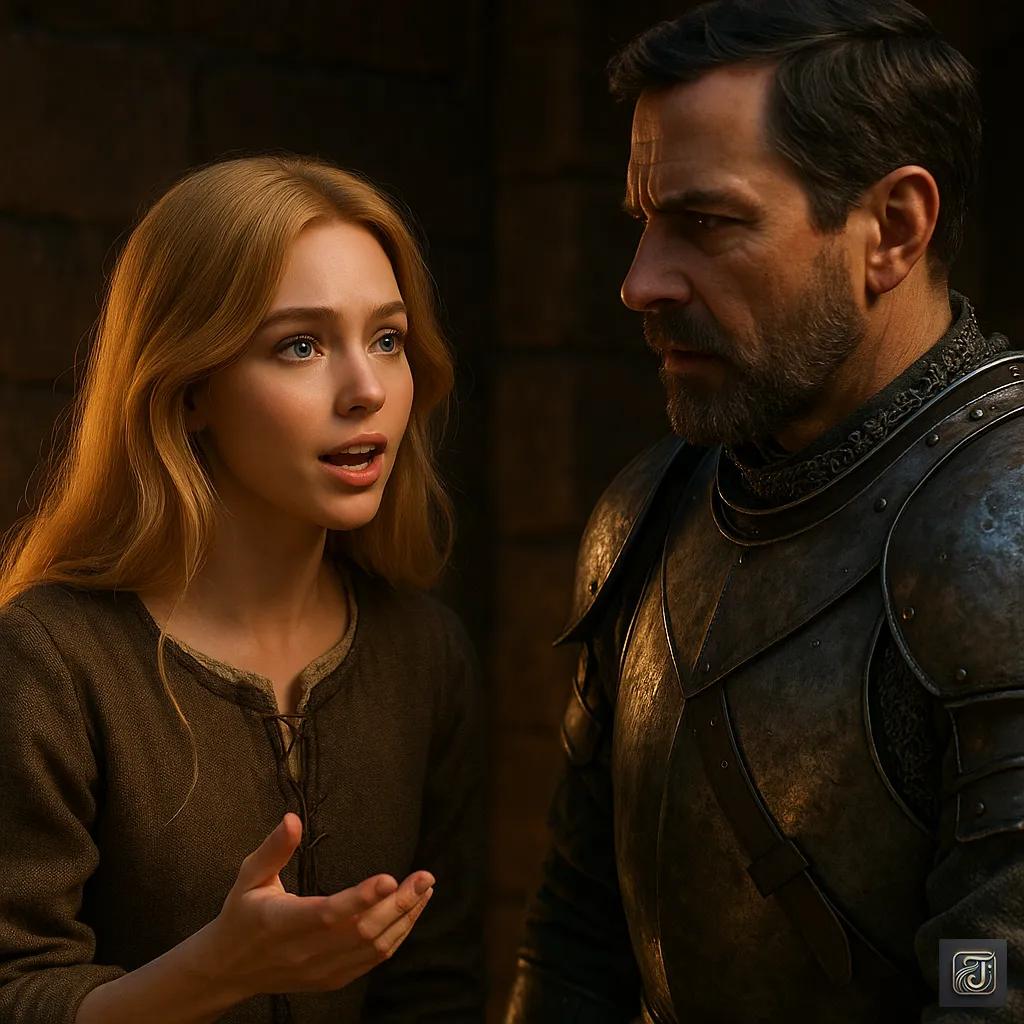
Joan of Arc:
“I wish to see the Dauphin, Charles!”
Baudricourt:
“…Excuse me?”
“Do you even know who you are? You’re just a peasant girl.”
“I have heard the voice of God.”
“I have been commanded to save France.”
“…Listen, no woman has ever gone to war.”
”This is madness. Who would believe such nonsense?”
She was turned away at the gate.
But Jeanne did not give up.
On her third visit, she returned—
This time, accompanied by villagers.
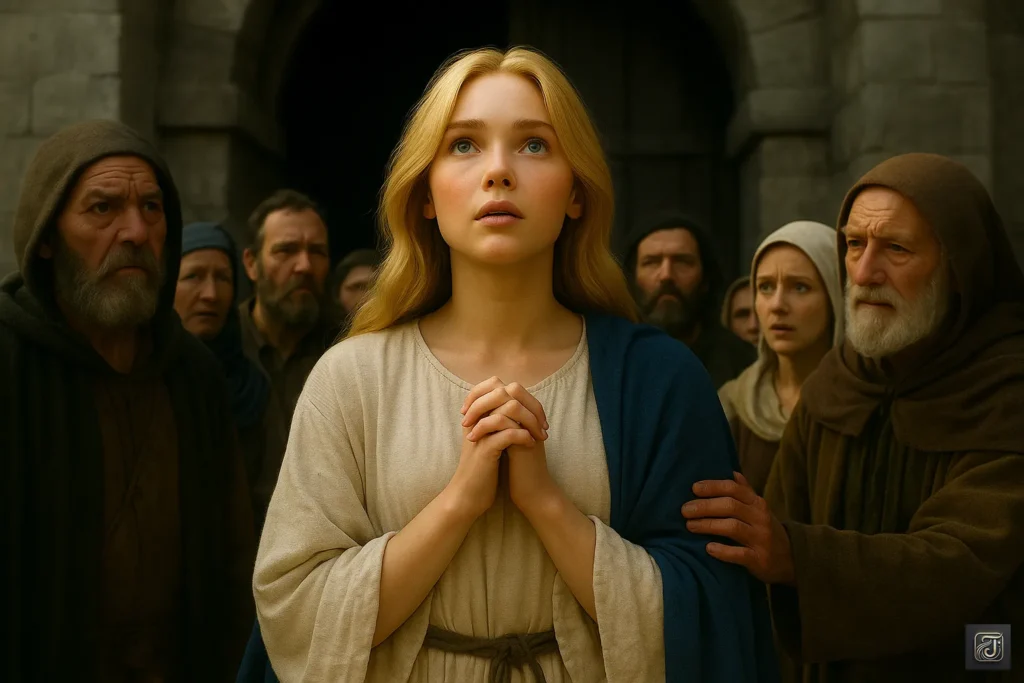
People:
“She’s the real thing.”
“I saw it with my own eyes—a light surrounded her.”
“Jeanne is the one chosen by God.”
At last, Baudricourt gave in.

Baudricourt:
“…Fine—fine! I get it!”
“If she wants to meet him so badly, then let her meet him!”

He assigned an escort to accompany Jeanne and sent her on her way to Chinon Castle—
where the Dauphin, Charles, resided.
But Charles had no intention of meeting her.
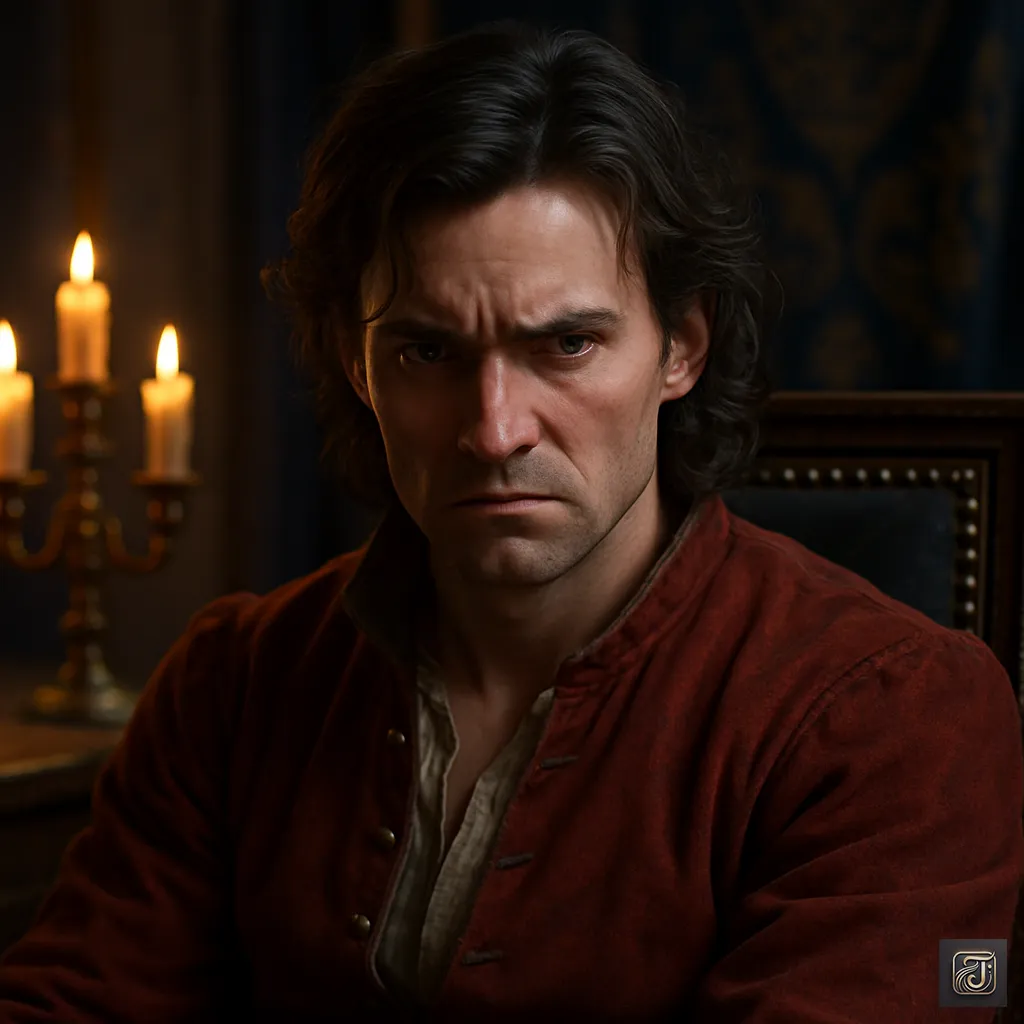
Charles:
“She heard the voice of God?”
“You’ve got to be joking.”
“Ridiculous.”
“And what if she’s an assassin?”
“Maybe this whole story is just a clever excuse to get close enough to kill me!”
The words his mother once hurled at him—
“You are not the king’s son”—
still festered in his heart.
No one believed in him.
He couldn’t even believe in himself.
And then—
Jeanne arrived at the castle.

Charles:
“All right, let’s test her.”
“I’ll have someone else wear my clothes, and I’ll blend in with the crowd.”
“If she’s an assassin, it won’t be me who dies—it’ll be him.”
Then Jeanne stepped before the man dressed as the king,
and with perfect calm, she said:

Joan of Arc:
“Are you the Dauphin?”
“No, I’m not.”
Charles:
“What…?”
Jeanne’s eyes scanned the crowd.
And there—standing quietly against the wall—
was a young man holding his breath.

Joan of Arc:
“It is you.”
“You are the one chosen by God to be the King of France.”
Charles:
“How… how did you know…?”
“The voice of God led me to you.”
In that moment, the air shifted.
Every noble in the court turned their gaze to her, stunned.
And Charles—speechless—stood frozen.
For the first time,
He understood how deeply the eyes of someone who truly believes
can shatter even the loneliest doubt.

Charles:
“…Your name?”
Joan of Arc:
“Jeanne. Jeanne d’Arc of Domrémy.”
And so, the fate of the Kingdom of France began to shift.
Chapter 4: Holy Fire — Orléans

Just weeks after Jeanne appeared before the Dauphin Charles—
The royal court was in uproar.
A country girl had claimed to hear the voice of God,
identified the true heir to the throne,
and proclaimed the salvation of France.
“The Maid of Miracles.”
“Saint Jeanne.”
Such names spread like wildfire.
But of course, there were skeptics.
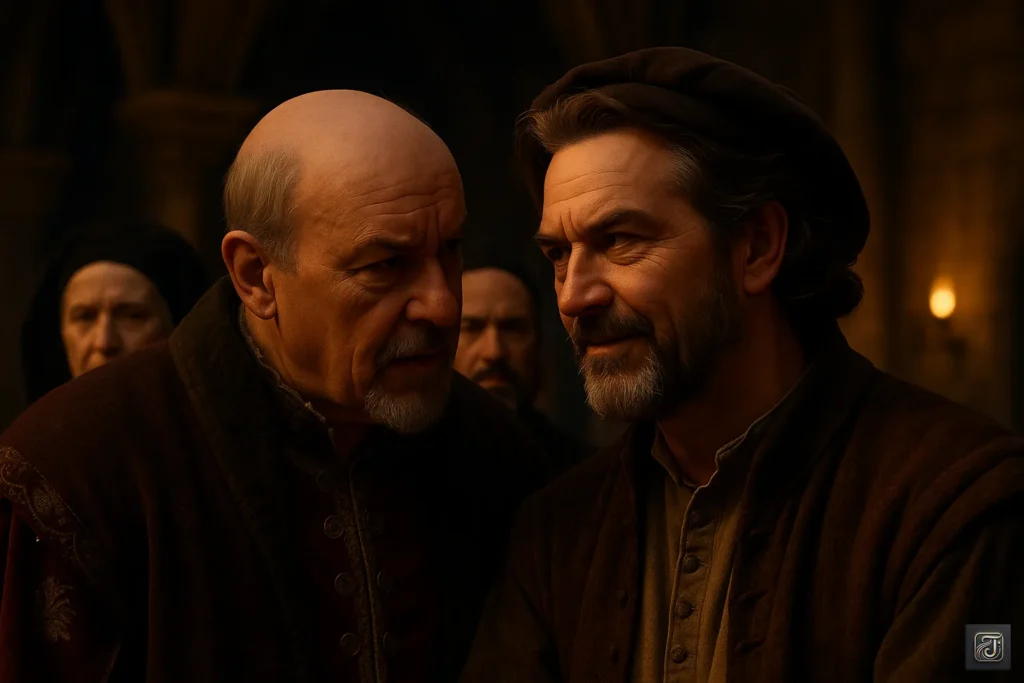
Skeptics:
“It’s just her imagination.”
“Nothing but the fantasies of a young girl.”
“She might be useful… but nothing more.”
Meanwhile, Charles was torn.
—Should I believe her?
Or is this just another deception?
The question echoed again and again in his mind.
But there was no lie in Jeanne’s eyes.
And more than anything,
What Charles longed for—
was someone who believed in him.

Charles:
“Very well.”
“Go to Orléans.”
“Save France, Jeanne d’Arc—if you truly can.”
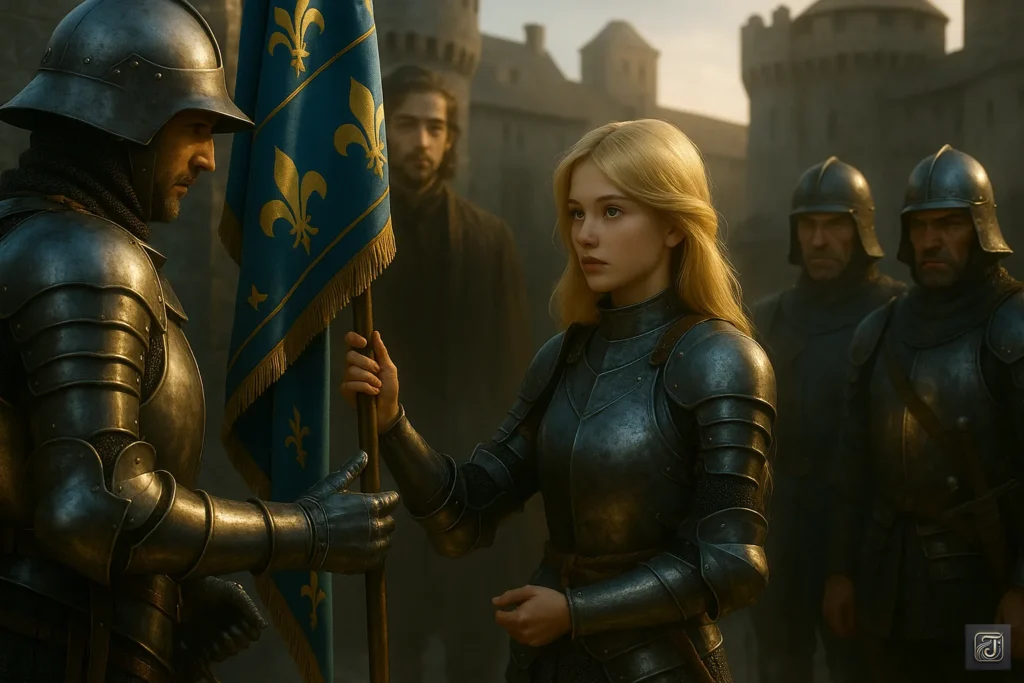
Jeanne was given a banner, a suit of armor,
and a small contingent of soldiers.
But it was enough.
She set out for Orléans.
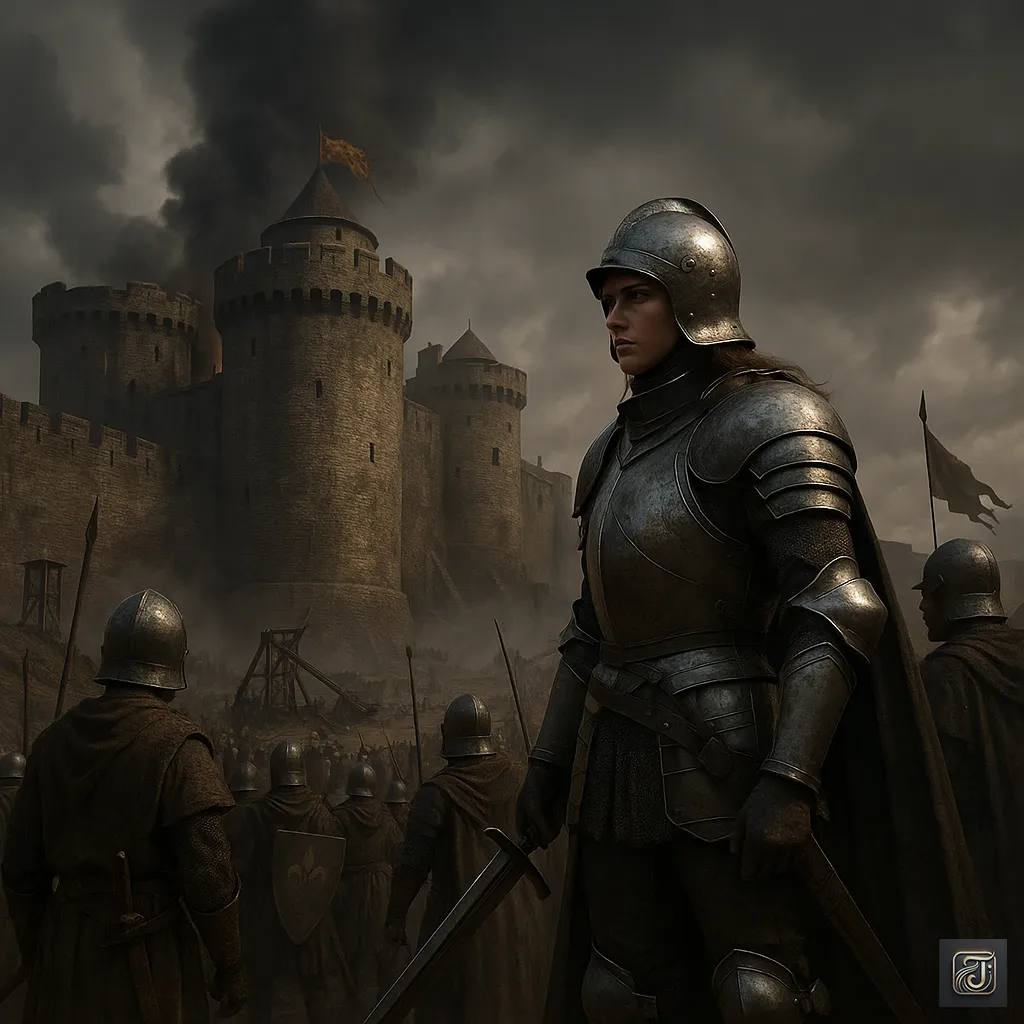
It was a place drowned in despair—Orléans, under siege by the English.
The French forces had lost their spirit,huddled behind the walls, waiting for the end.
And then, before them, appeared a girl—bearing a white banner.
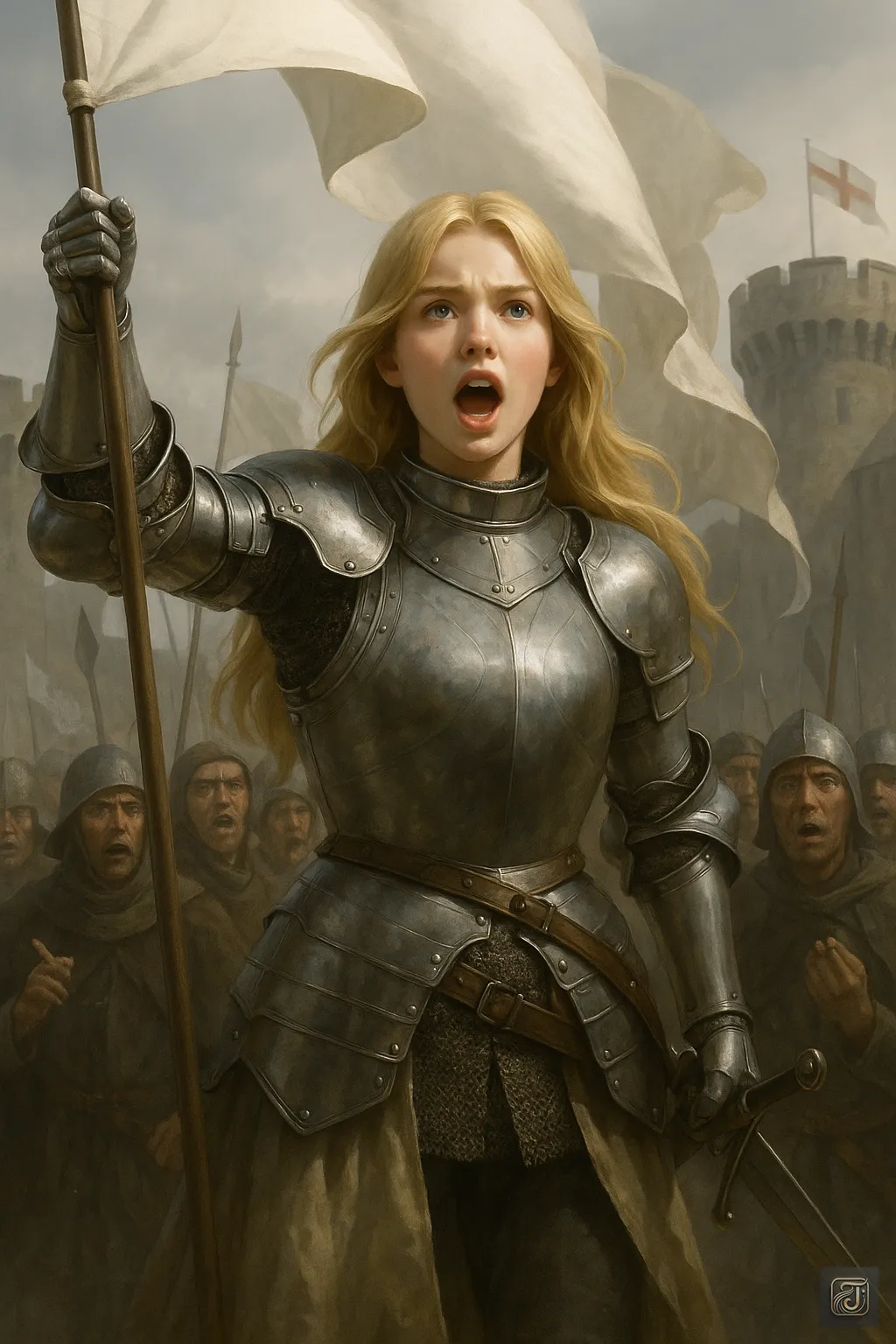
Joan of Arc:
“My name is Jeanne! I come in the name of God! Do not be afraid! The day of our victory has come!”
—Who is that?
—A… girl?
Both the English and the French troops stared in disbelief.
Yet that day, for some inexplicable reason,
the French soldiers were suddenly filled with vigor.
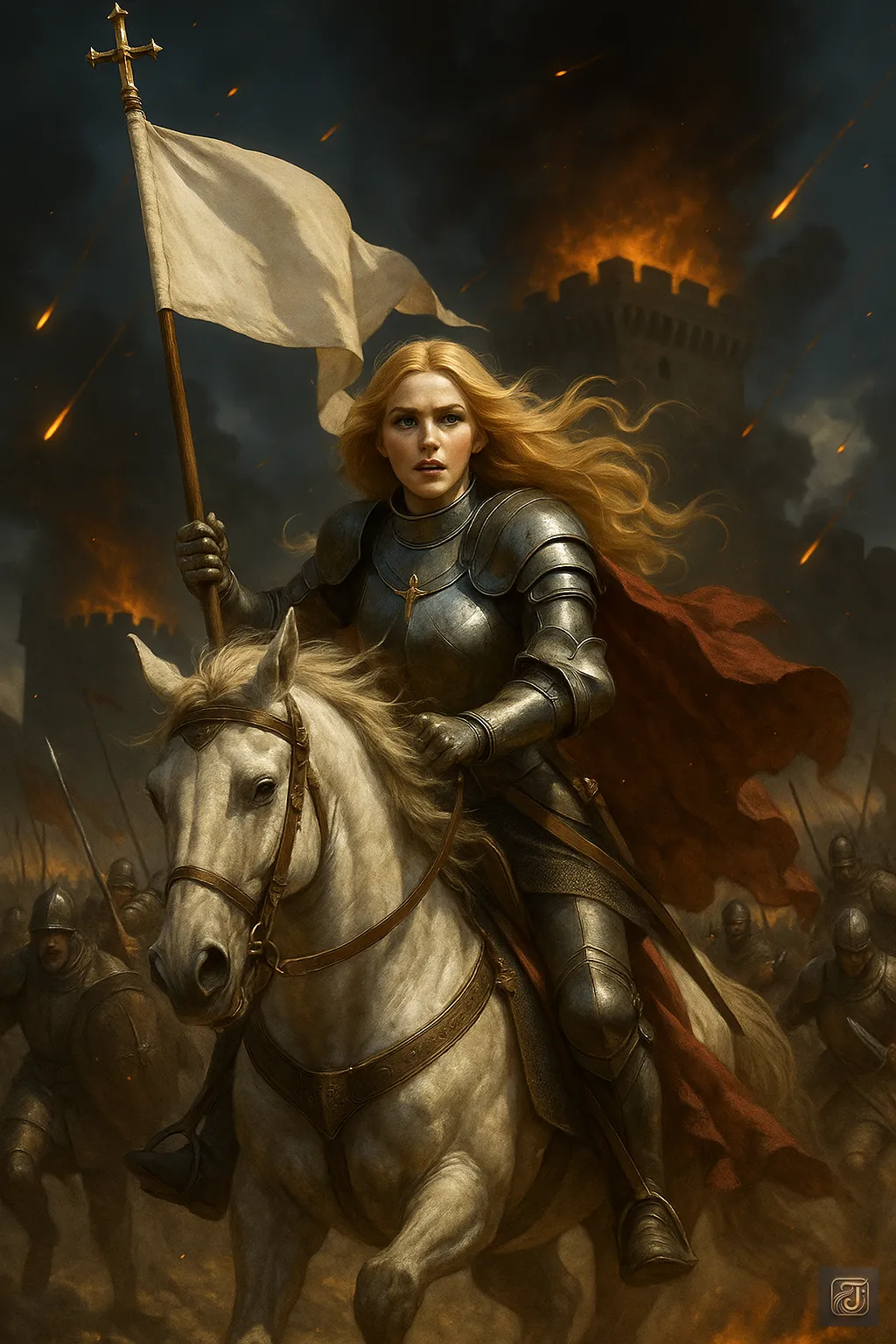
Joan of Arc:
“Jeanne is here! The Maiden of God has come!”
At her words, the soldiers rose.
They entrusted their lives to her banner.
Men who had grown used to defeat, who had once turned their backs—
now faced forward as one.
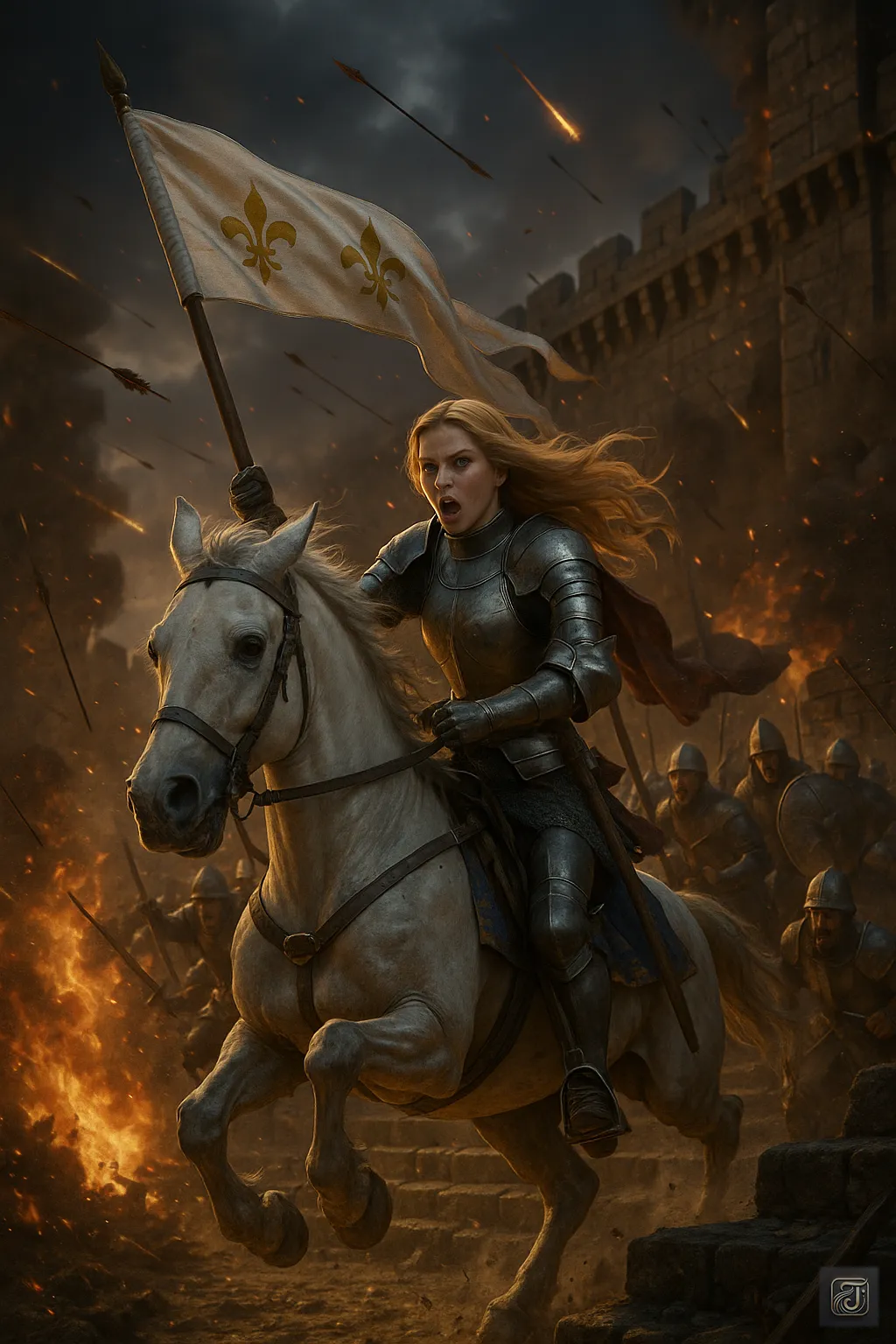
Joan of Arc:
“Charge, now!!”
Jeanne led the charge.
Raising her banner high, she stormed up the fortress steps—
Amidst a storm of arrows and falling fire.
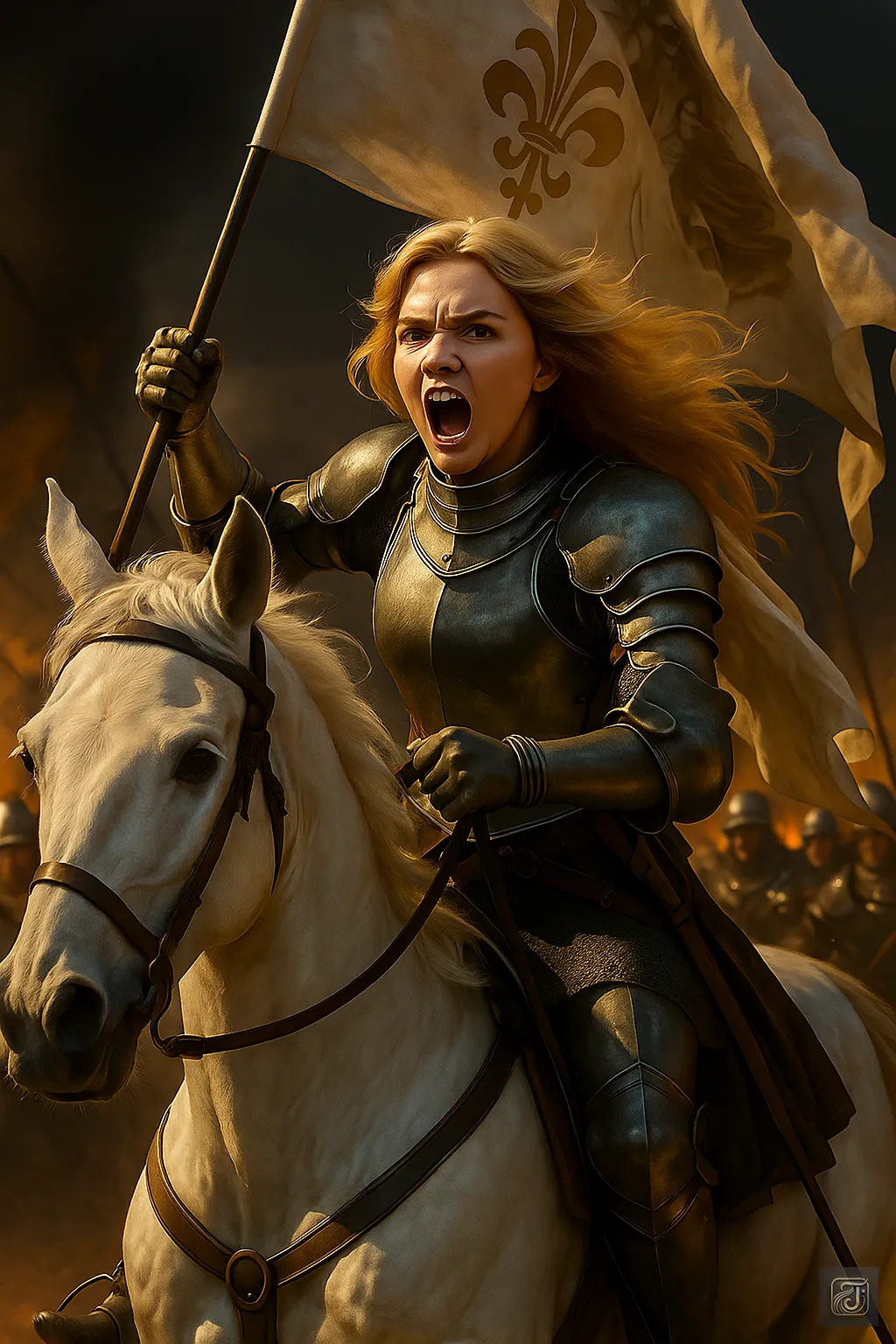
Joan of Arc:
“God is with us!!”
And just a few hours later—
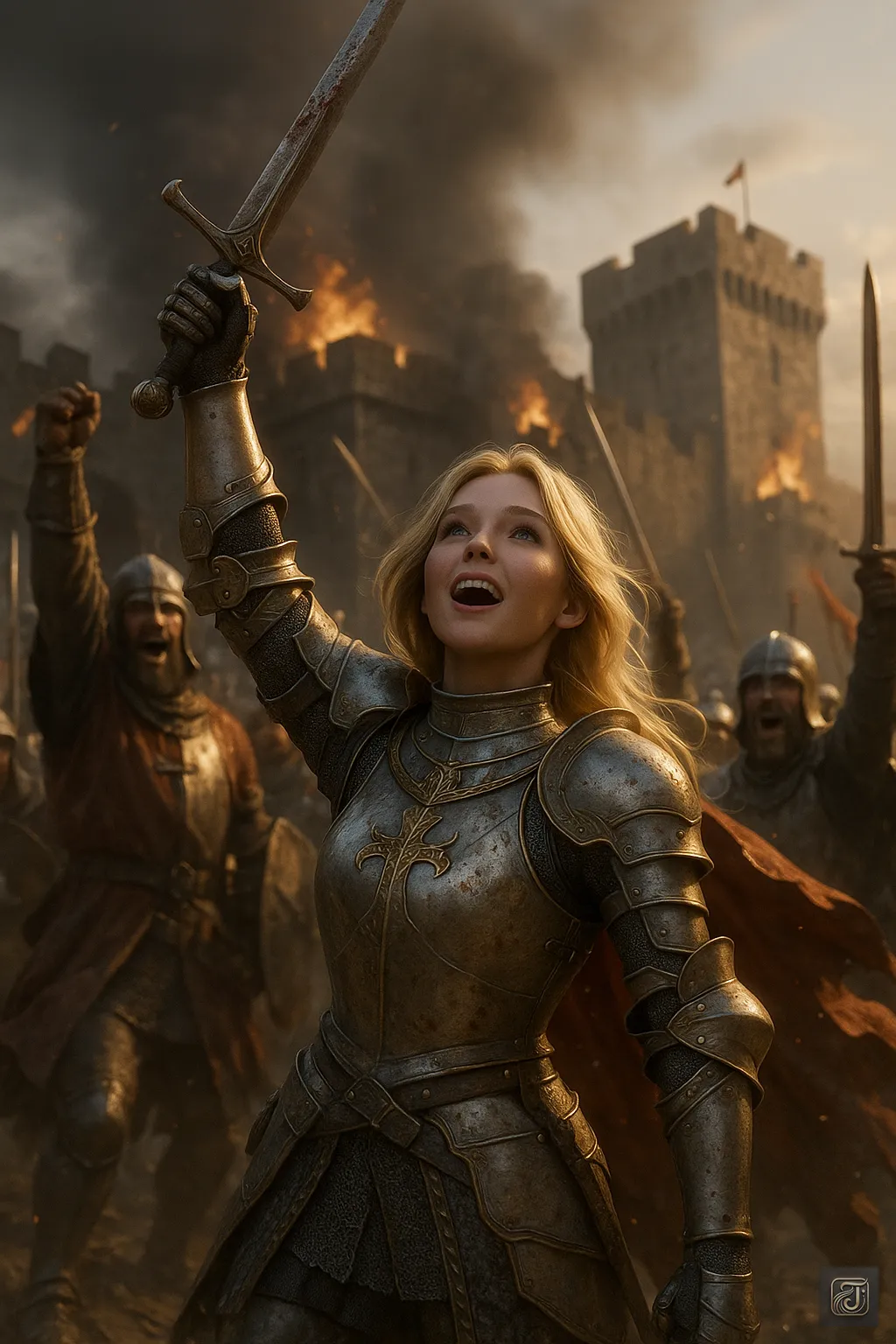
The southern fortress of Orléans fell.
The English, thrown into disarray, began to retreat.
The counterattack had been too sudden—
the victory, too overwhelming.
—It was nothing short of a miracle.

People:
“With her, we can win—”
From that day forward, Jeanne became the very embodiment of hope.
Wherever she appeared, the people fell to their knees in prayer,
and the soldiers were ready to lay down their lives.
But Jeanne’s battle—
was only just beginning.
Chapter 5: The Invincible Maiden

The victory at Orléans struck France like a bolt of lightning.
“Jeanne has driven back the English!”
“The Holy Maiden has begun to save France!”
“She truly is the one chosen by God!”
Her name echoed from royal courts to humble farmlands.
Merely speaking it was enough to revive hope.
And soldiers flocked to her banner.
Jeanne did not stop.
The Battle of Jargeau

Their next target was Jargeau, a strategic stronghold along the Loire River.
The English had fortified it, blocking the French army’s advance.
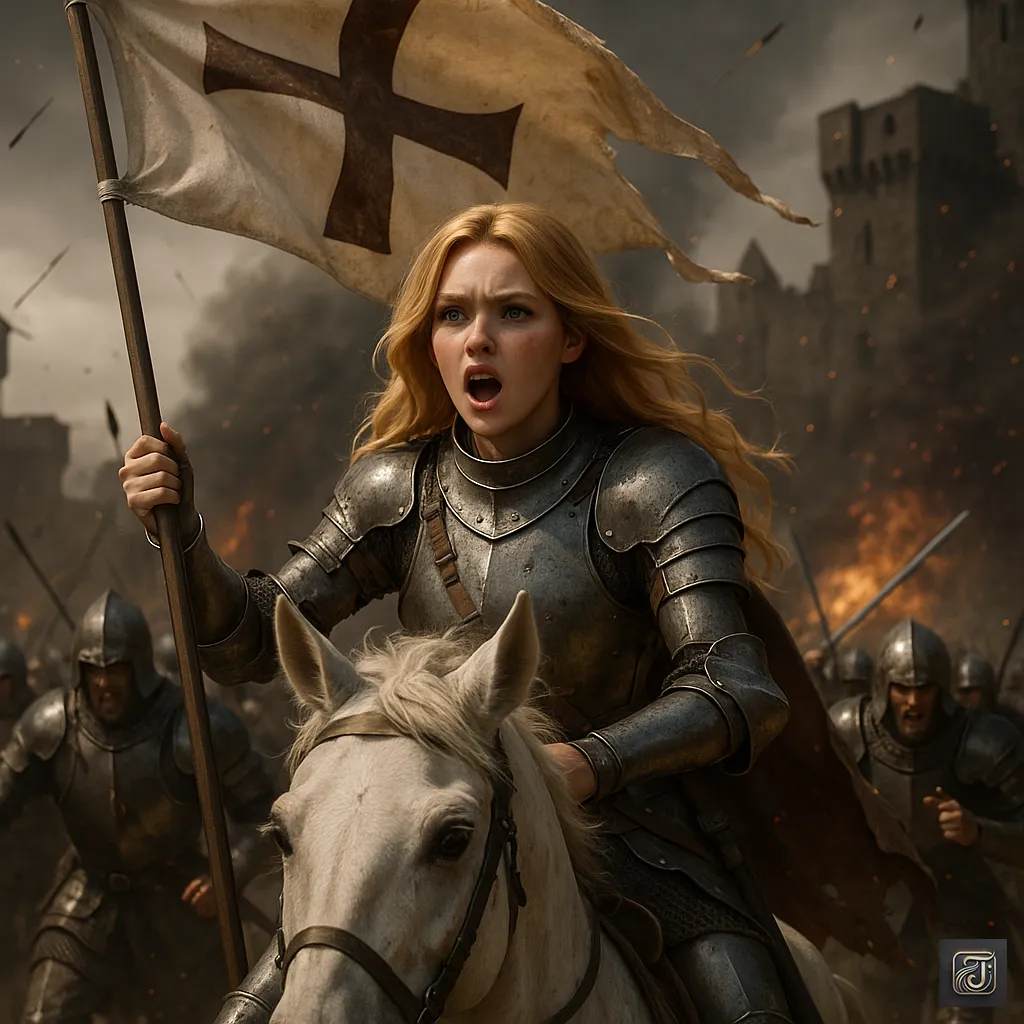
Joan of Arc:
“We move now.”
“That’s our next target!”
Jeanne shouted from the front lines.
The soldiers followed.
Arrows flew.
Stones rained down.
But she showed no fear.
In the midst of battle,
An arrow struck—
piercing between her shoulder and chest.
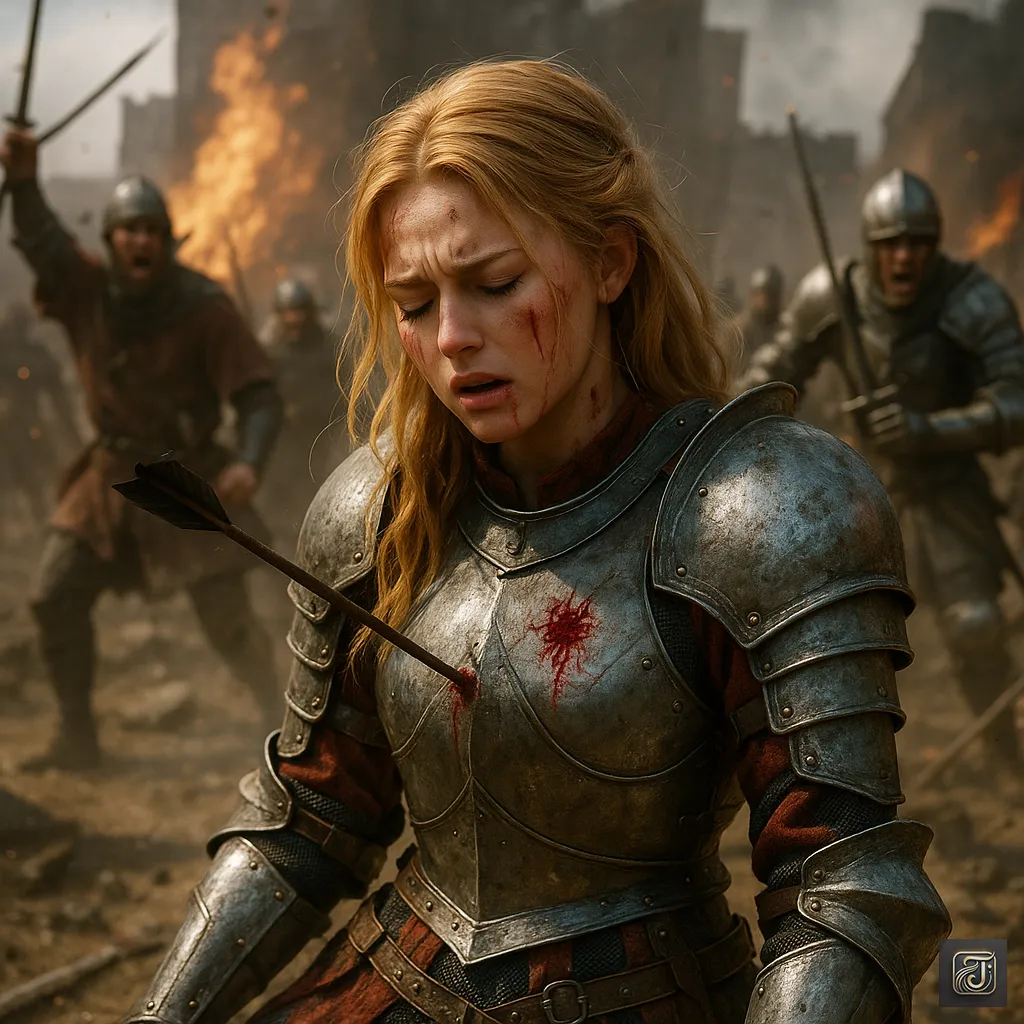
Joan of Arc:
“Jeanne is down!”
The soldiers wavered in panic.
But just minutes later—
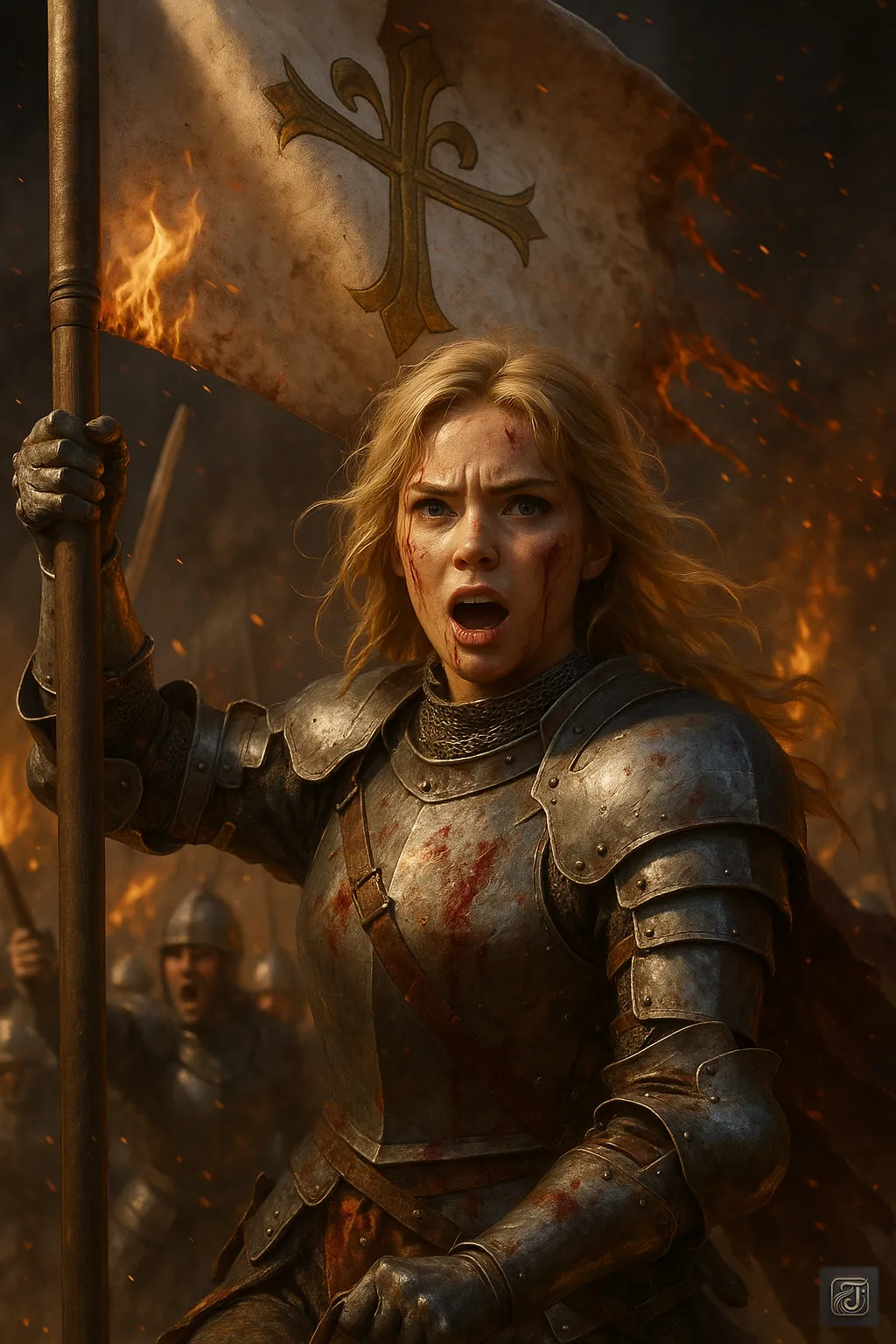
Joan of Arc:
“…It’s not over yet!!”
Covered in blood, Jeanne raised her banner once more.
At the sight of her, the soldiers found their courage again.

Soldiers:
“Follow her!! Follow the Maid!”
And then—
Victory.
The fortress fell, and the English forces retreated.
The Battle of Beaugency

Next, she marched toward Beaugency.
There too, she charged at the front—not with a drawn sword, but waving her banner high.
“Follow the will of God! Cast away your doubt!”
Overwhelmed by her momentum, the English forces faltered once again, and the French army claimed another victory.
The Battle of Patay
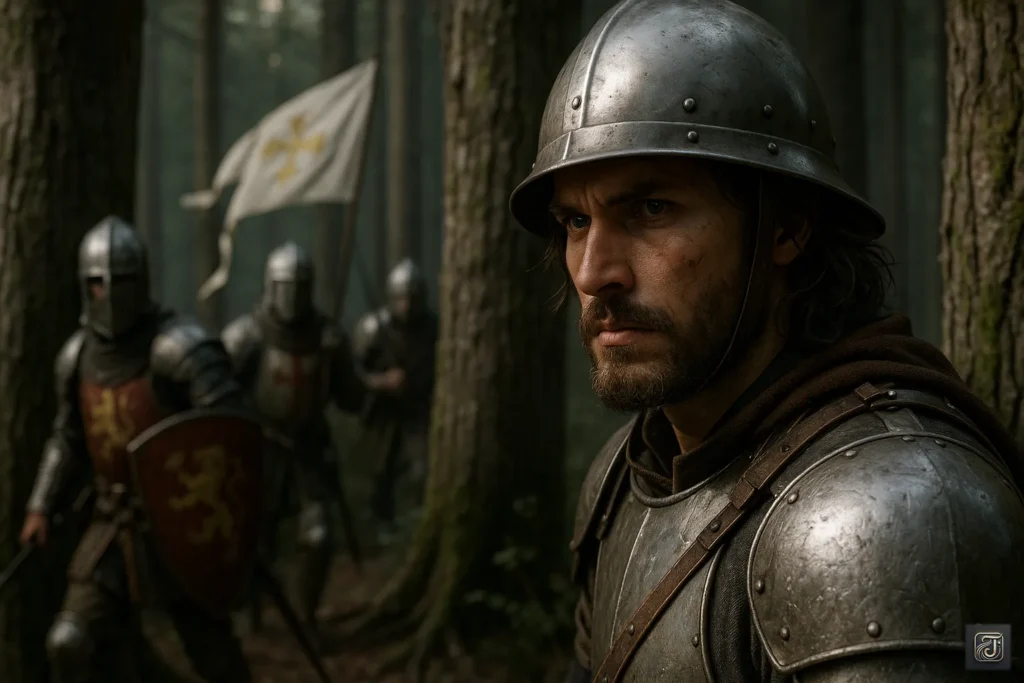
At last came the great battle: Patay.
The English forces had hidden ambush troops in the forest, planning a surprise attack on the French army.
But—

English sentries:
“…What?”
Suddenly, a gust of wind swept through the trees, and a herd of deer burst out of the forest.
Startled, the English sentries revealed their position.
A French soldier caught sight of them and shouted:

Joan of Arc:
“There are enemies hiding in the forest!!”
The English ambush collapsed—foiled unexpectedly by a herd of wild animals.
Before they could even regroup, Joan’s forces launched a full assault.
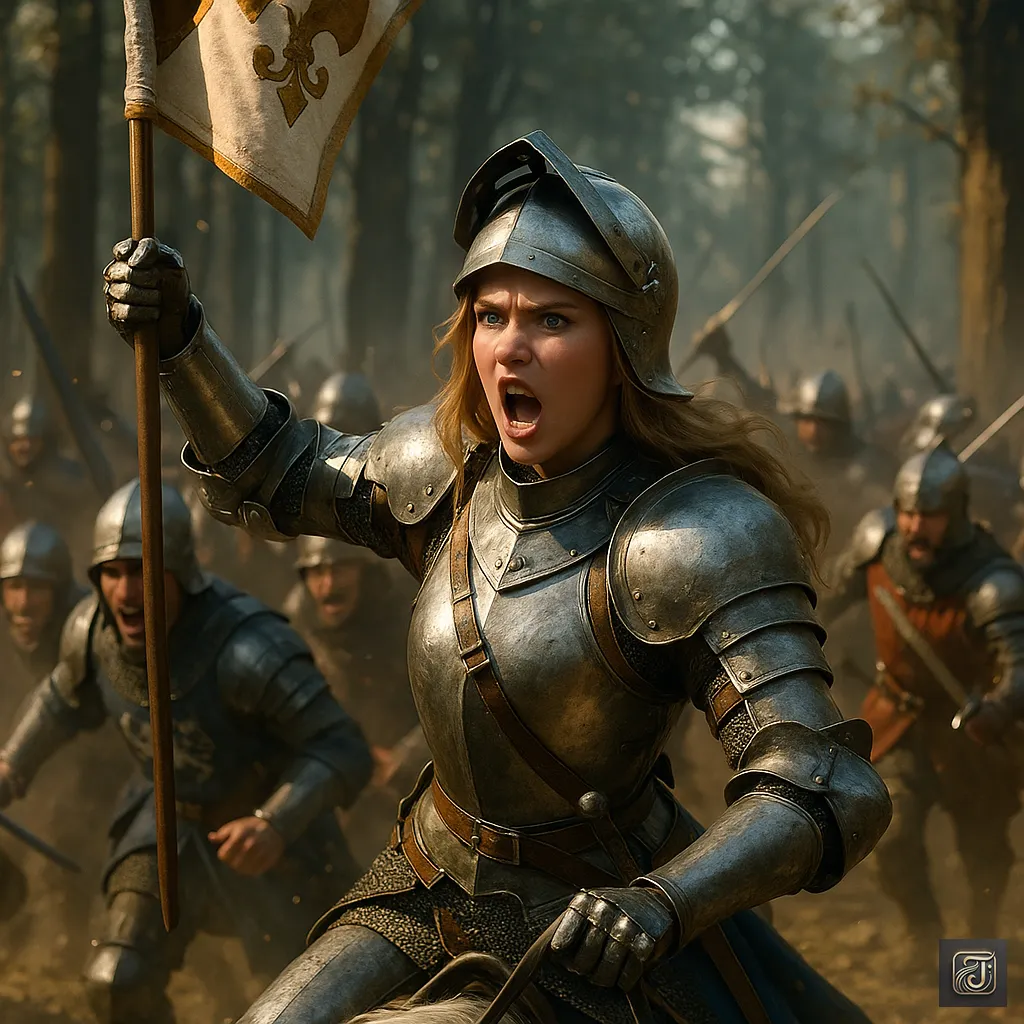
Joan of Arc:
“Now is the time—unleash everything!!”
“Take back the pride of France!!”
The English army was decimated, and many of their soldiers were taken prisoner.

—Another victory, once again.

At this point, Joan had become the undefeated maiden.
Her momentum was unstoppable.
The winds of victory were now steering her straight toward one destiny—the coronation.
Chapter 6: The Birth of a King

Thanks to Joan of Arc’s victories, key strongholds along the Loire Valley were liberated one after another.
Bit by bit, hope returned to the map of France.
But these were merely victories on the battlefield.
For Charles to become king in both name and truth, he had to go to one place—
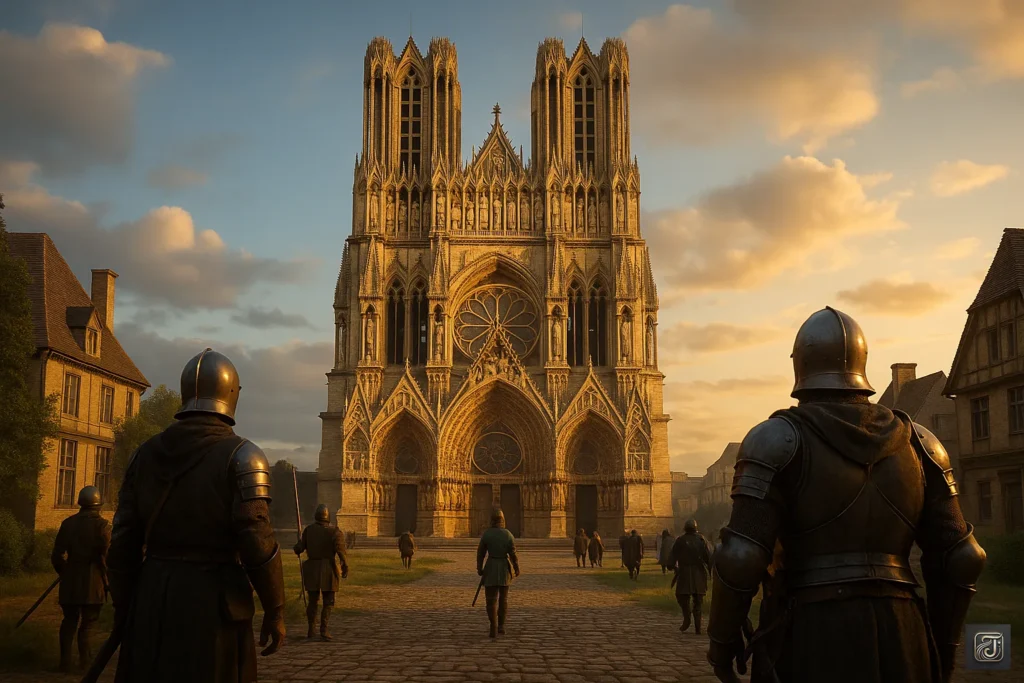
—Reims.
The sacred city where generations of French kings had been crowned.
And yet, Reims still lay deep within enemy territory.
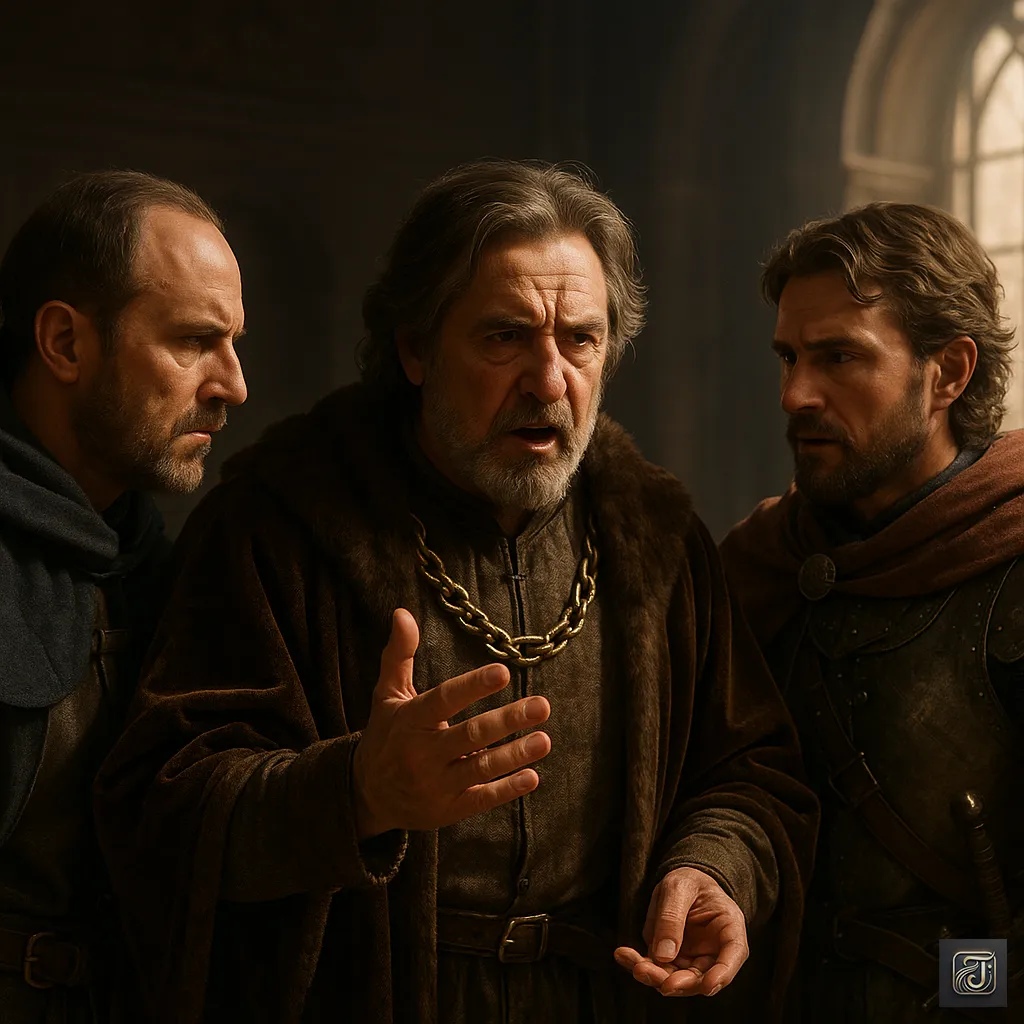
People:
“It’s impossible.”
“It’s reckless.”
“You’ll only get yourself killed along the way.”
That’s what everyone said.
But Joan declared without hesitation:

Joan of Arc:
“I will lead him. Charles shall become the true king.”
“That is God’s command.”
The Road to Coronation

Joan’s army began its march northward toward Reims.
Every step forward meant entering enemy territory—yet, something astonishing happened.
With each advance, cities surrendered.

People:
“Joan has come.”
“The miracle maiden brings the king.”
“France… France is returning!”
At the sight of her, the people laid down their arms.
City gates opened one after another, and the path to Reims unfolded more peacefully than anyone had dared to hope.
—Except for one place.
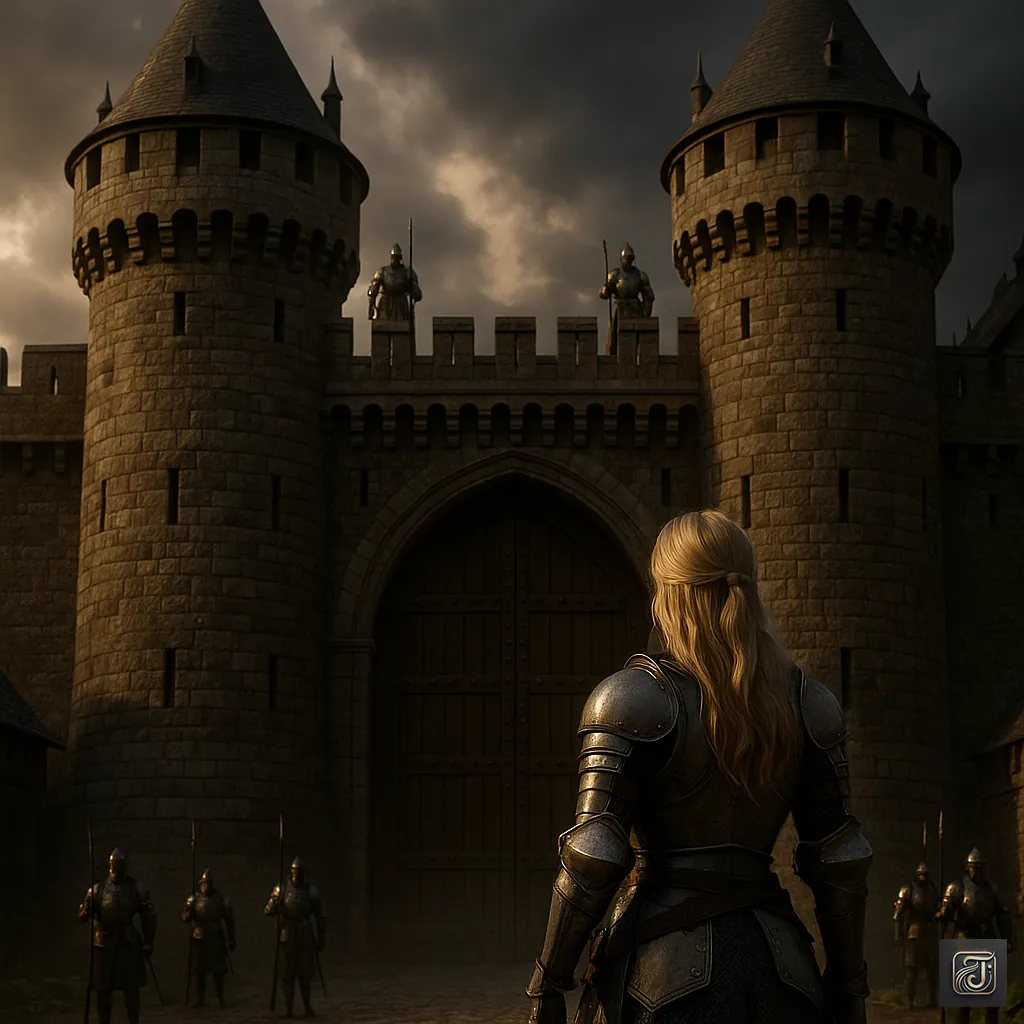
“The city of Troyes has sealed its gates and refuses to receive the king.”
When the general reported this, Joan muttered only one word:
“Then…”

Joan of Arc:
“…Then we have no choice but to fight.”
“All troops, prepare for battle!!”
At Joan’s command, a tense air swept through the army.
Everyone could feel it—this girl was truly ready to act.
Panicking, the citizens of Troyes turned pale and cried out:
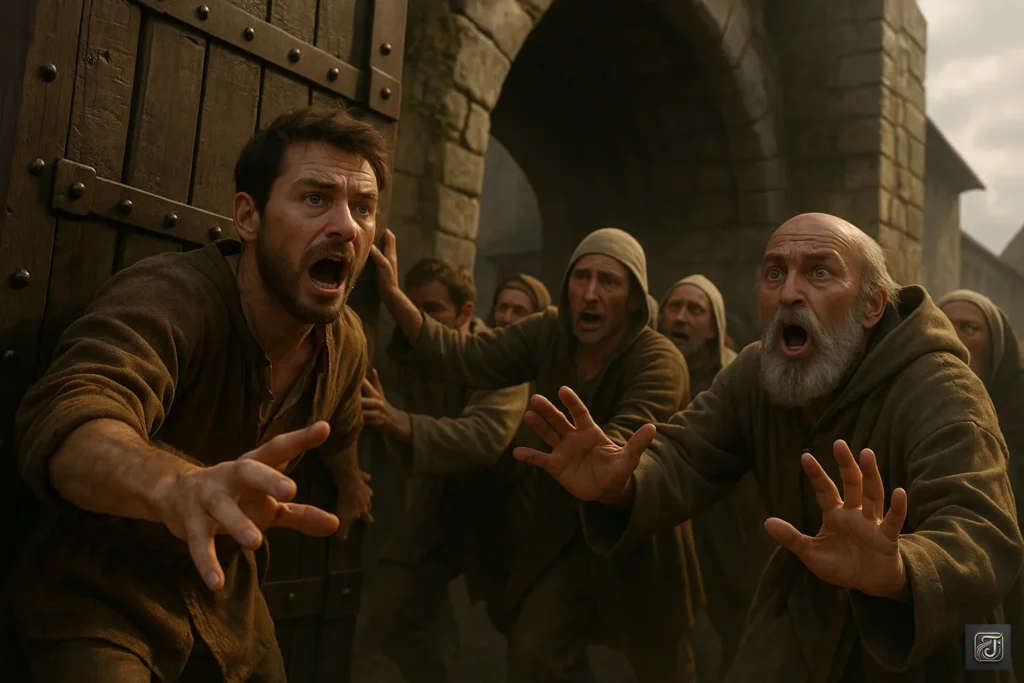
Citizens:
“Wait! Please wait! We surrender! We’ll open the gates!”
And so—Troyes fell without a single drop of blood.
Joan didn’t retreat a single step.
With sheer presence alone, she forced the city to its knees.
At last, Joan and her army arrived at Reims.
The Coronation

July 17, 1429.
Reims Cathedral.
Charles was formally crowned as King Charles VII of France.
The people knelt, and the bells of celebration rang across the land.
And in the midst of it all, Joan knelt alone.

Joan of Arc:
“…One of God’s missions… is now fulfilled.”
Watching her, everyone thought the same thing:
—This girl is the true guiding light of France.
But the light of glory would not last long.
From this very moment, Joan’s fate began to quietly unravel.
Chapter 7: Fractured Bonds
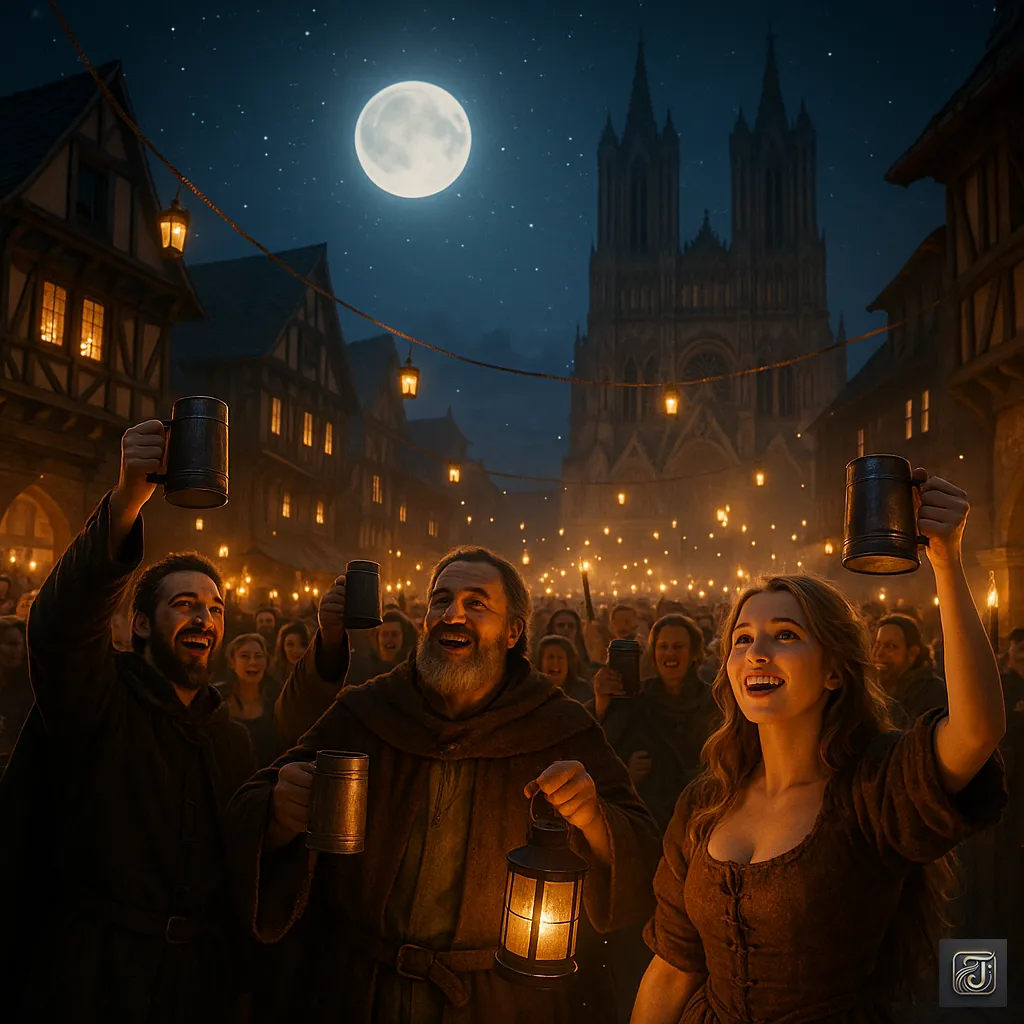
On the night of the coronation,
the skies over Reims were alight with countless lanterns.
People raised their cups in celebration, reveling in the birth of King Charles VII.
Yet in the quiet corner of that grand festivity,
Jeanne d’Arc knelt alone, silently in prayer.
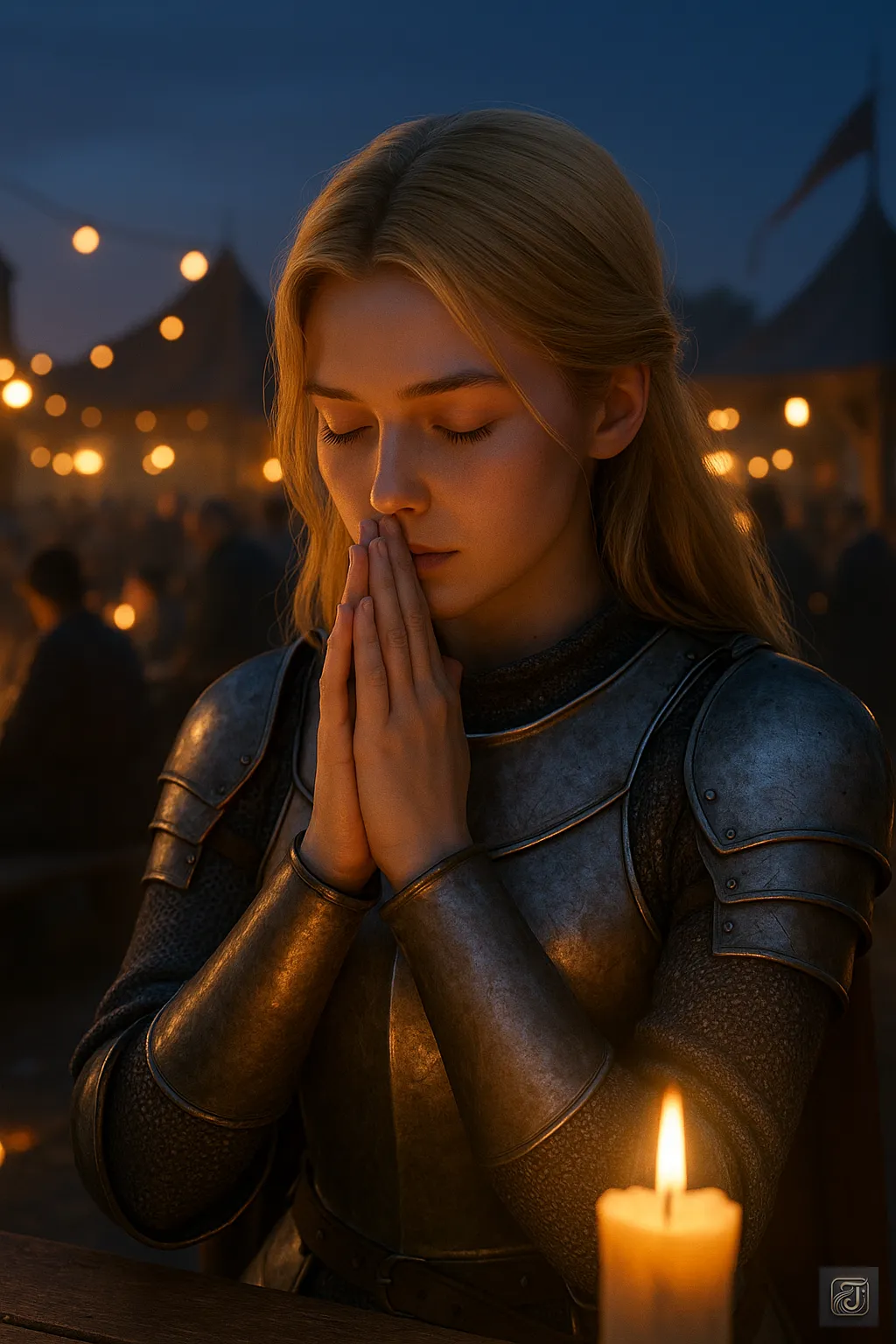
Joan of Arc:
“It’s not over yet… Half of France still lies in enemy hands.”
To Jeanne, making Charles king was only part of the mission.
Her true goal was the complete liberation of France—
And for that, she had no intention of laying down her sword.
But Charles… did not see it the same way.

Charles:
“I’ve done enough. I am king now.”
“The rest should be resolved through peace.”
From the moment Charles was crowned,
he began envisioning a rule without Jeanne.
She sought to reclaim all of France through battle—
He sought to end the war through negotiations.
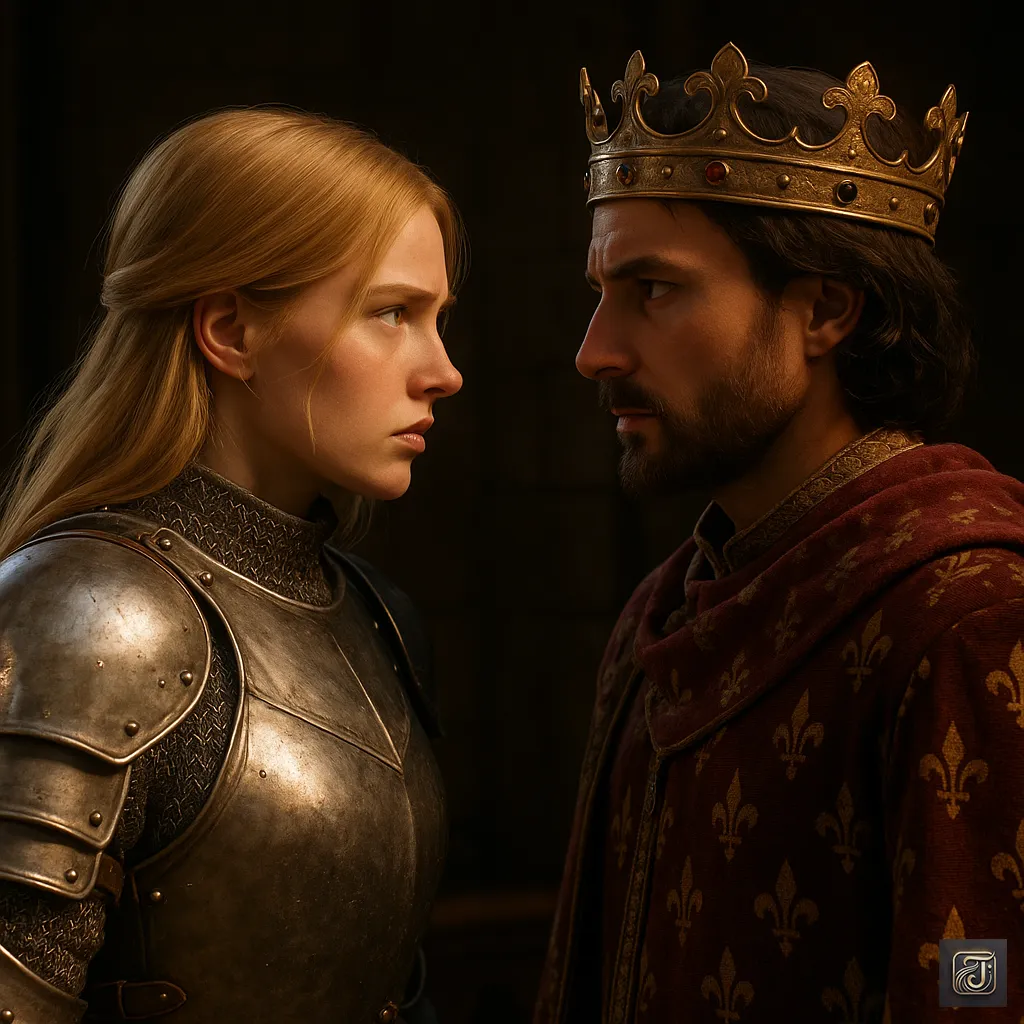
A rift began to form between them.
Jeanne grew anxious.

Joan of Arc:
“The English still hold power, and the Burgundians remain strong.”
“If we let up now, they will strike back.”
“Now is the time to attack. We must reclaim Paris—the capital!”
She pleaded once more with Charles.

Charles:
“…Joan, please—stop this.”
Joan of Arc:
“Stop? Stop what?”
Charles:
“Your war… it has become inconvenient for my kingdom.”
At those words, Joan fell silent.
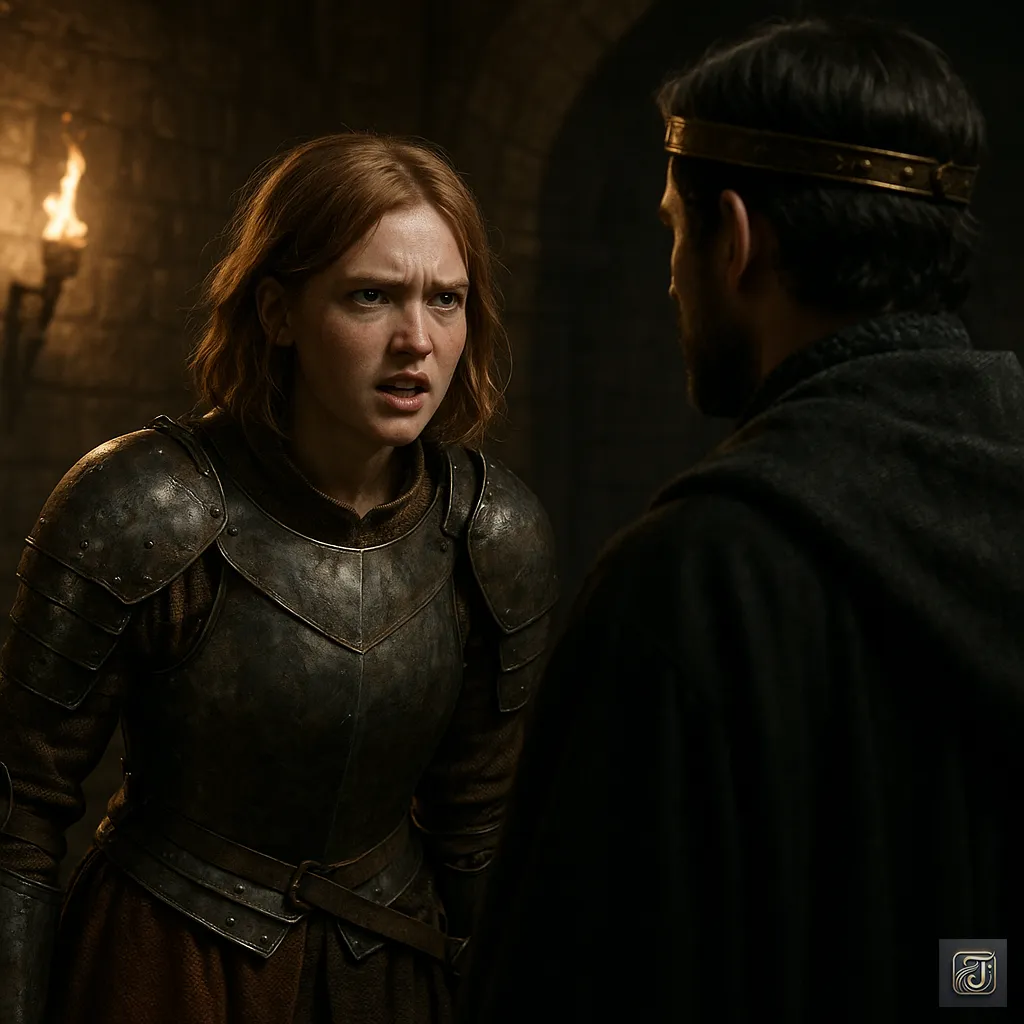
Joan of Arc:
“Inconvenient?”
“I’ve risked my life to bring you this far.”
“And now you—the one I helped crown king—call me… inconvenient?”
Before long, Charles even began to resist maintaining the front lines.
No supplies. No reinforcements.
He grew cold toward Joan’s campaigns.
The March on Paris

Joan of Arc:
“To protect the lives of the people, we must not delay.”
“If we wait, the enemy will only fortify their defenses, and reclaiming Paris will become impossible.”
“We must not give them time.”
“If we are to strike, the time is now!”
Without waiting for the king’s permission, Joan led her troops toward Paris.

However, the English had already fortified Paris, and its walls were nearly impregnable.
After a fierce battle, the French forces failed to break through—
And Joan suffered her first defeat.
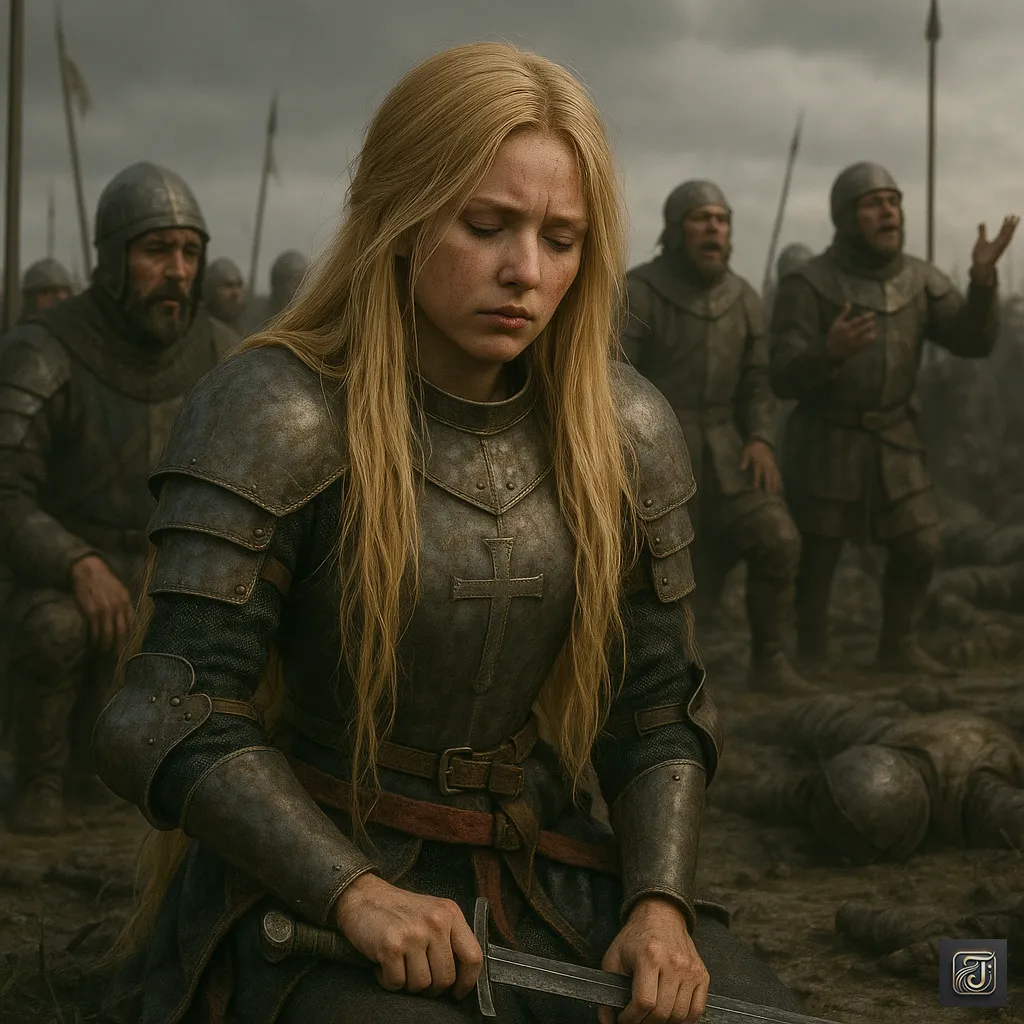
Joan of Arc:
“…If only the reinforcements had arrived…”
The soldiers murmured their frustration.
But no reinforcements came.
They were never meant to.
The king had refused to send them.
Wounded and barely alive, Joan retreated from the battlefield.
She went directly to Charles and pleaded:
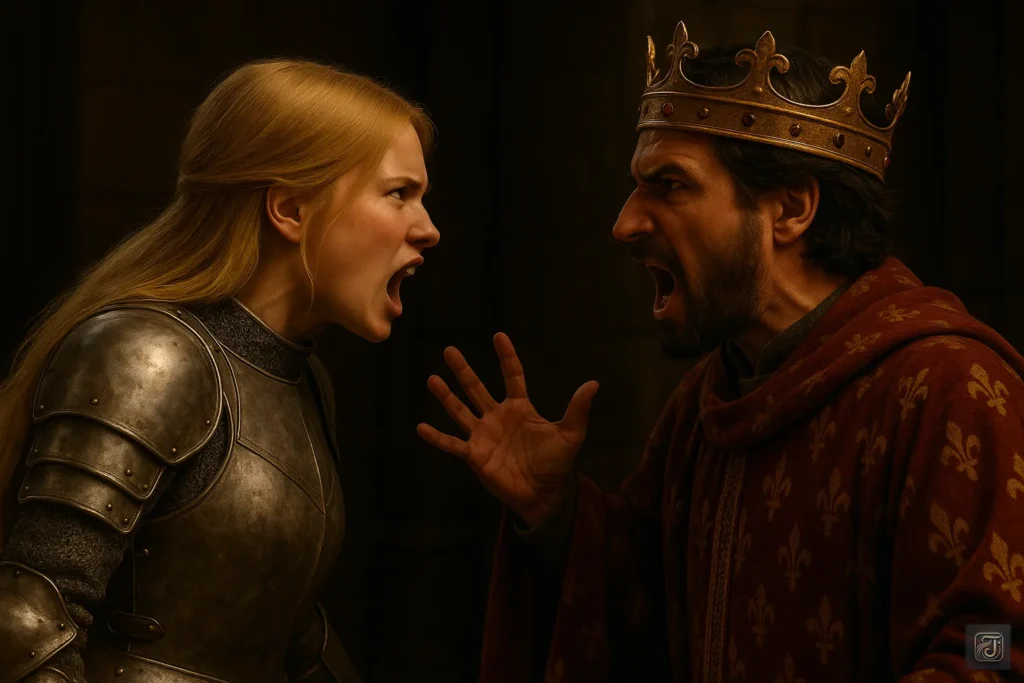
Joan of Arc:
“Why didn’t you send reinforcements back then!?”
“If they had arrived, we might have taken Paris!”
“Don’t be ridiculous!”
“I was negotiating peace—you ruined everything by attacking Paris without permission!”

But the people and the army supported not Charles—but Jeanne.
And it was only natural.
All the victories, the very fact that Charles had secured his crown, were thanks to Jeanne.
Before she appeared, Charles had known nothing but defeat—
There was no one who still supported a king who owed everything to another.
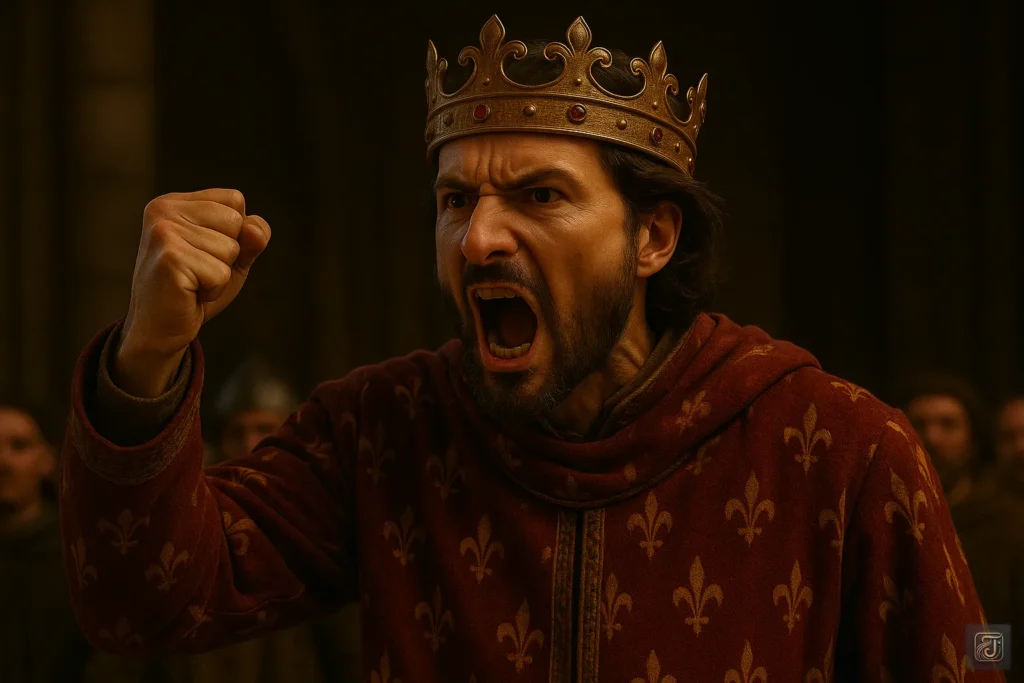
Charles:
“Jeanne, Jeanne, Jeanne, Jeanne, Jeanne!”
“Everyone parrots her name like mindless fools!”
“They should be supporting me! I am the King!”
And then, Charles finally declared:
“Jeanne d’Arc. The army is hereby disbanded.”
“As such, you no longer hold command.”
It was, in truth, a dismissal.
Disbandment of the Army and Isolation
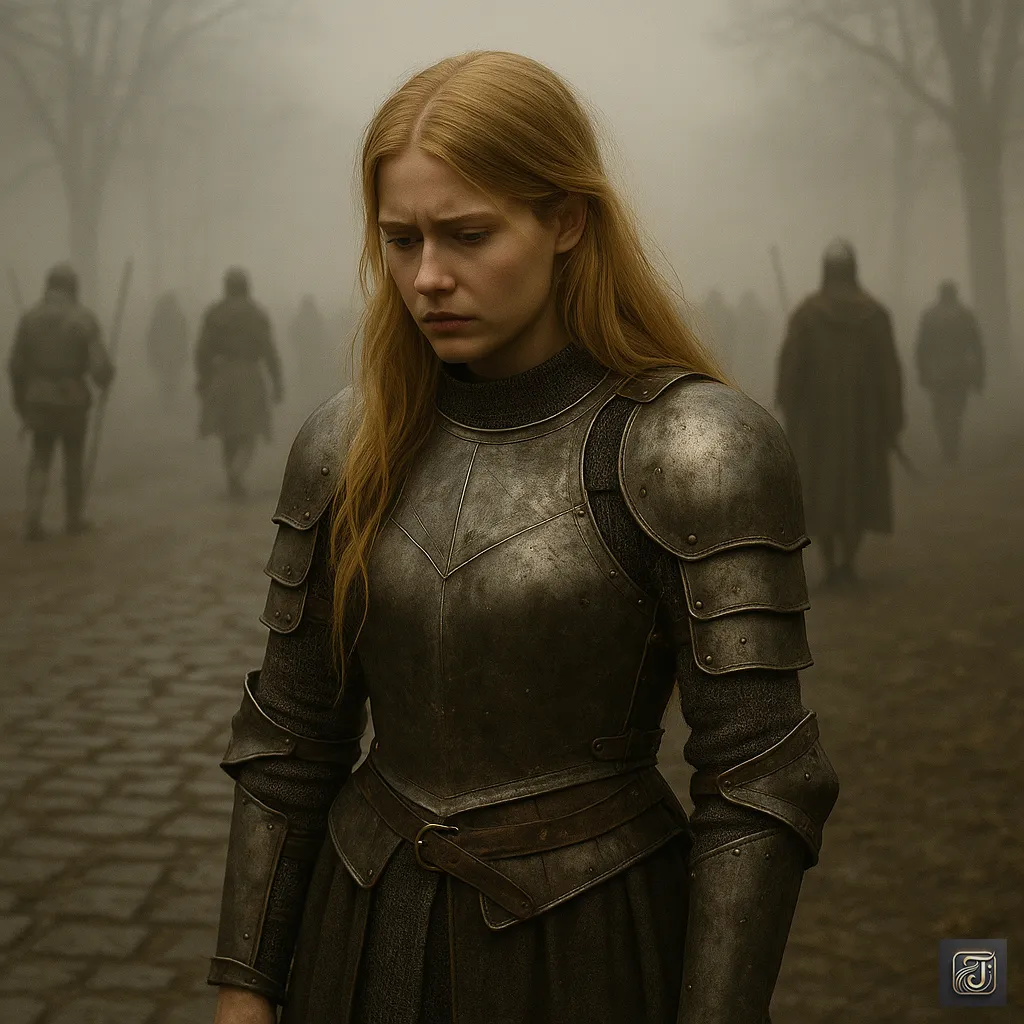
By the king’s order, the army Jeanne once led was disbanded.
Comrades who had fought and bled beside her were scattered.
And Jeanne herself was left in growing solitude.
—As if they were trying to erase her very existence.
Yet Jeanne’s wish remained unchanged:
“To reclaim this country.”
But now, that wish had become an inconvenience in the eyes of the king.
And the next mission entrusted to her was—
“Go to Compiègne. Suppress the Burgundian forces.”
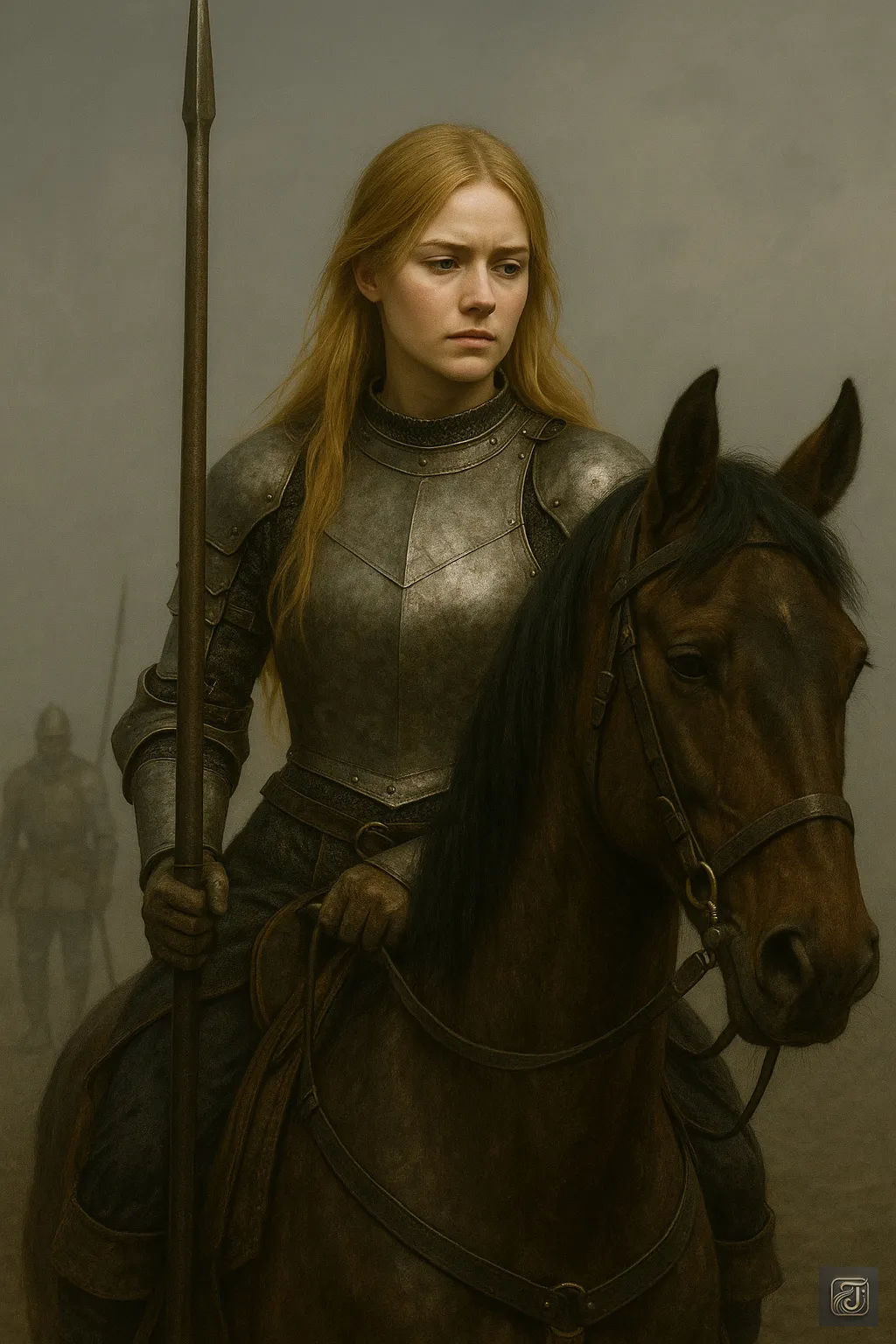
An impossible order—given without reinforcements or supplies.
Jeanne understood exactly what it meant.
She had been abandoned.
Cast aside.
And yet, she obeyed.
Because—
She was the one chosen by God.
Chapter 8: The Order of Betrayal

“Joan, go to Compiègne.”
“Stop the movements of the Burgundians.”
The king’s envoy delivered the message and rode off without another word.
No supplies. No reinforcements. No promise of support. Only an order.
Joan understood what it meant.
—She had been abandoned.
Yet, she did not lay down her sword.
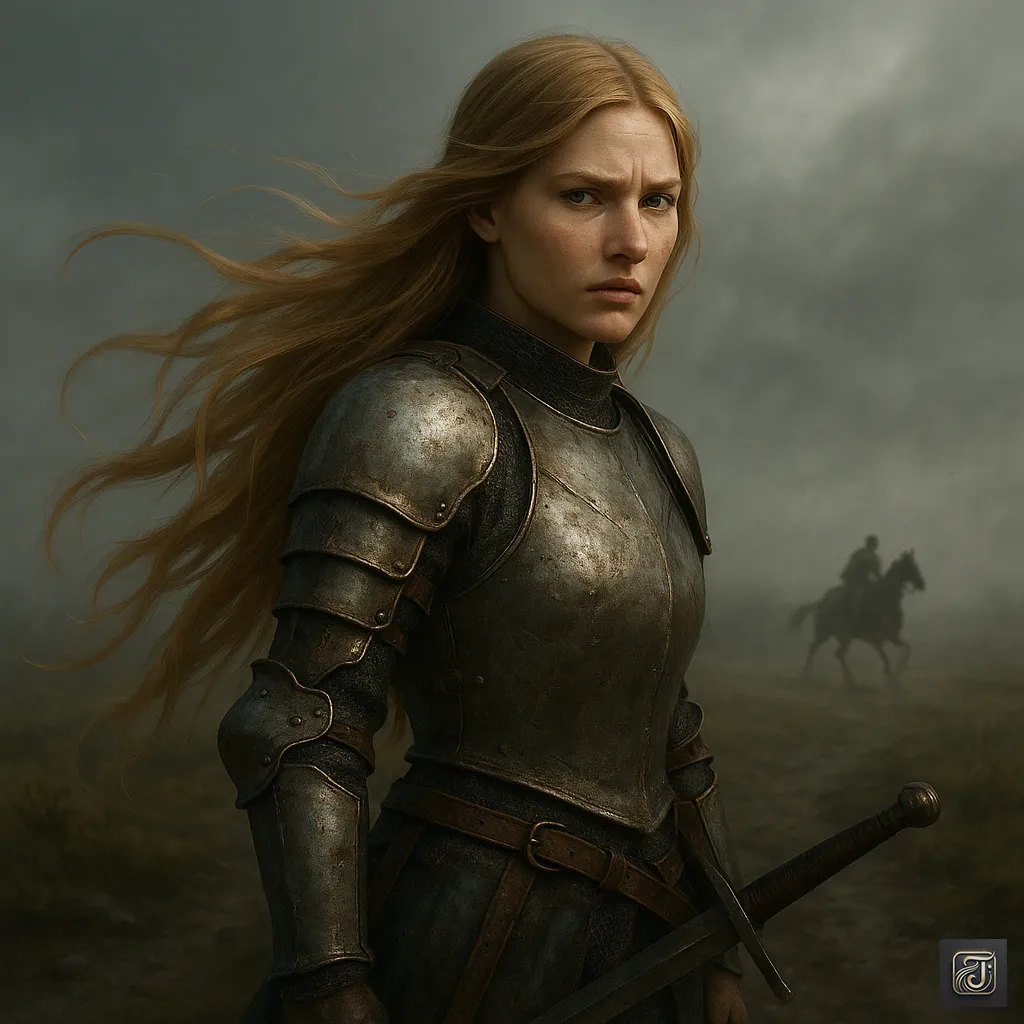
Joan of Arc:
“Even if the king has cast me aside, God still watches over me.”
With only a handful of soldiers, Joan set out for Compiègne.
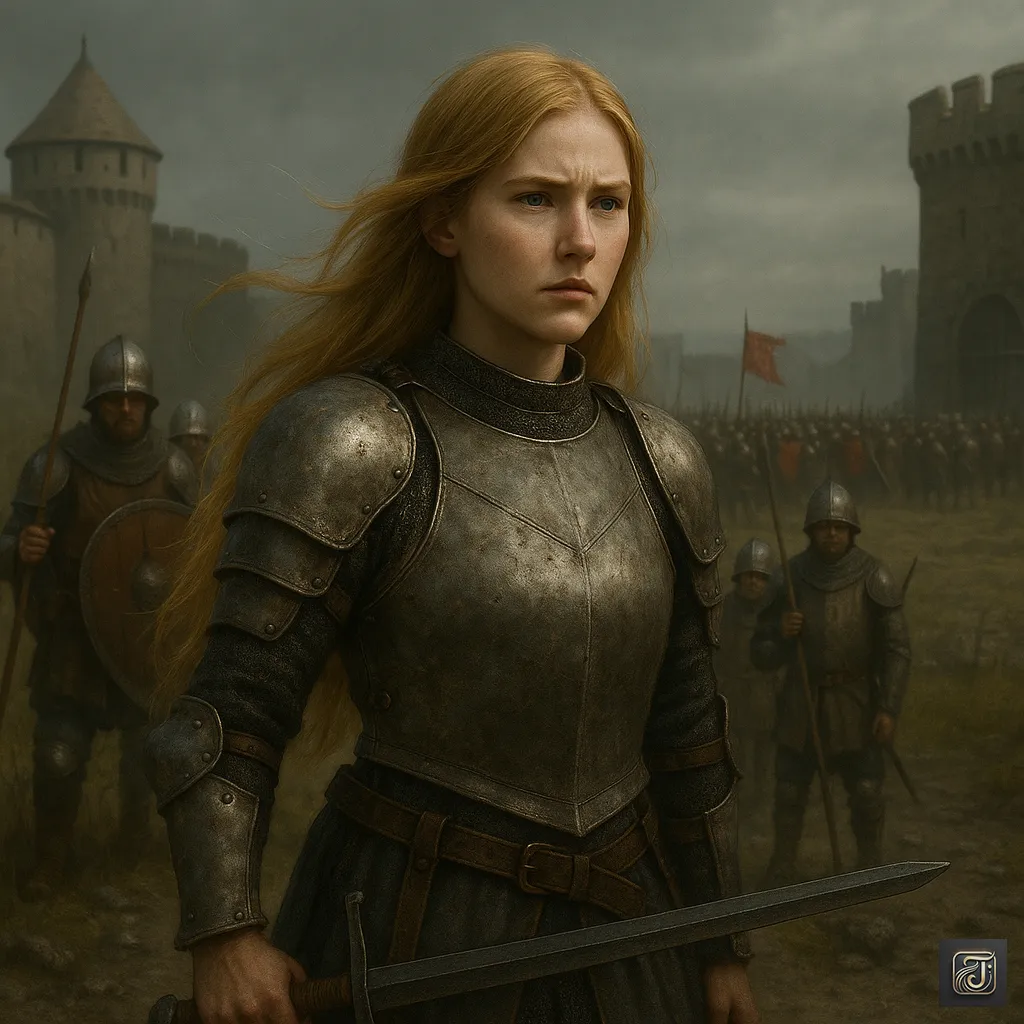
The Burgundian forces had already taken position in the area, and the difference in numbers was overwhelming.
The city gates were shut, allies were few, and the situation was utterly hopeless.
Then, one day—
While Joan was scouting the front lines,
The unthinkable happened.
The city gates suddenly slammed shut behind her.
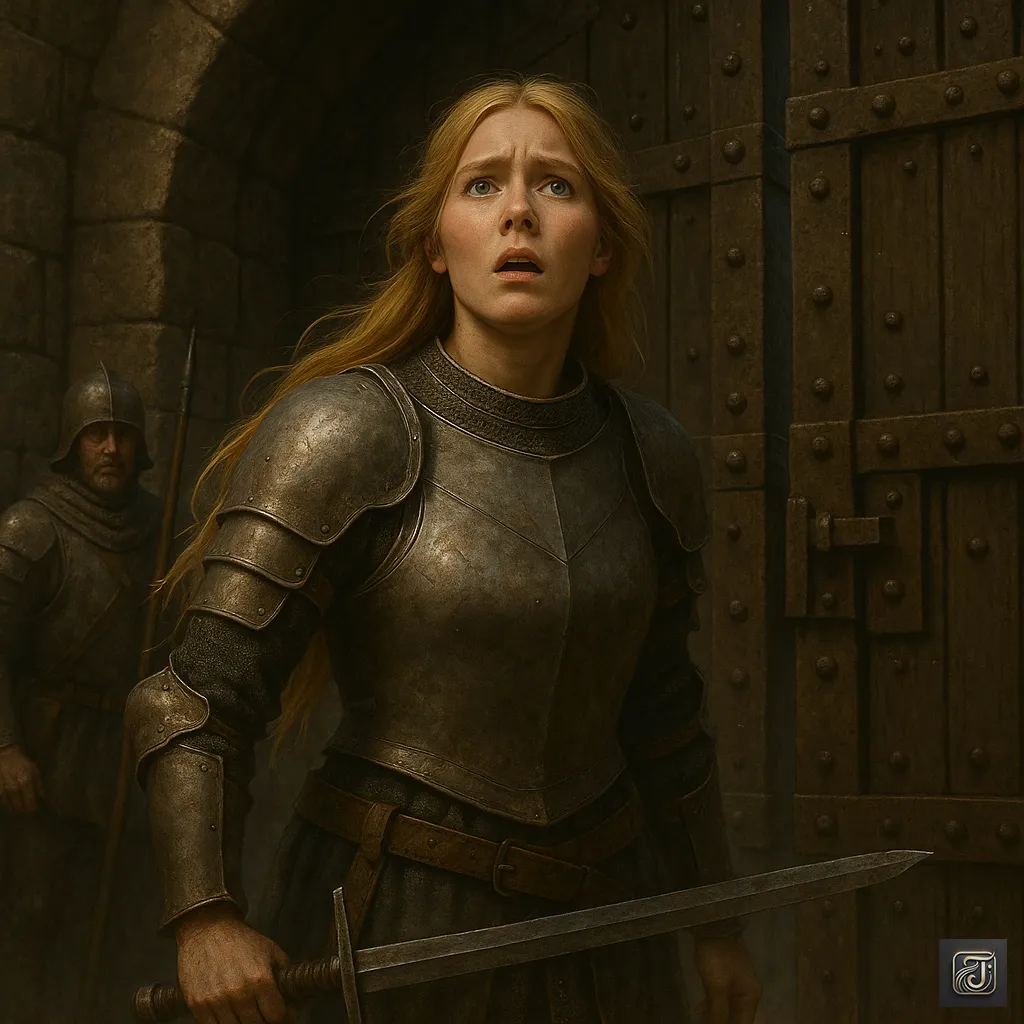
Joan of Arc:
“What…!?”
The heavy clang of iron echoed behind Joan.
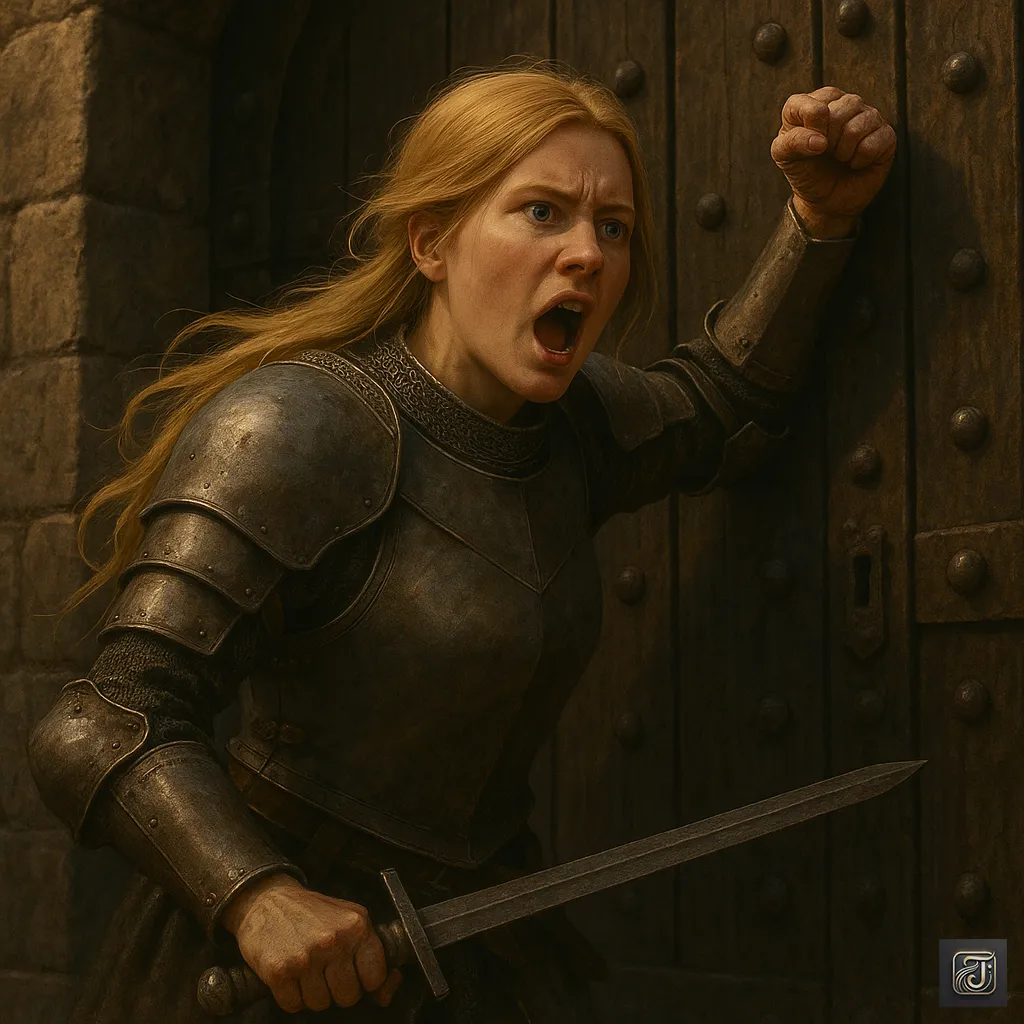
Joan of Arc:
“Open the gate!!”
“There are still people outside!!”
But the gate remained shut.
And in the next moment, the Burgundian army charged from all sides.
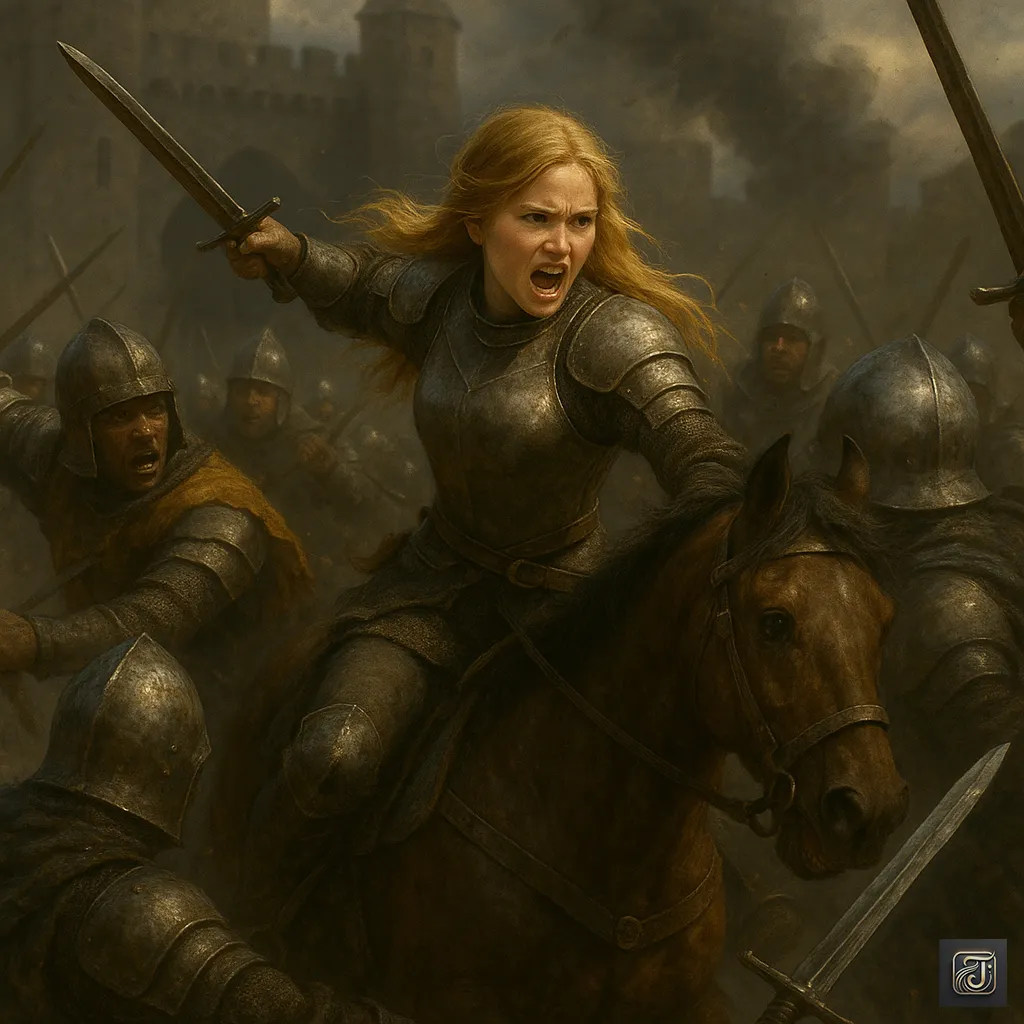
Joan of Arc:
“Kh…!!”
Joan fought fiercely.
She rode her horse, drew her sword, and faced forward until the very end.
But she could not overcome the overwhelming numbers.
Her horse was shot down, and she was thrown violently to the ground.
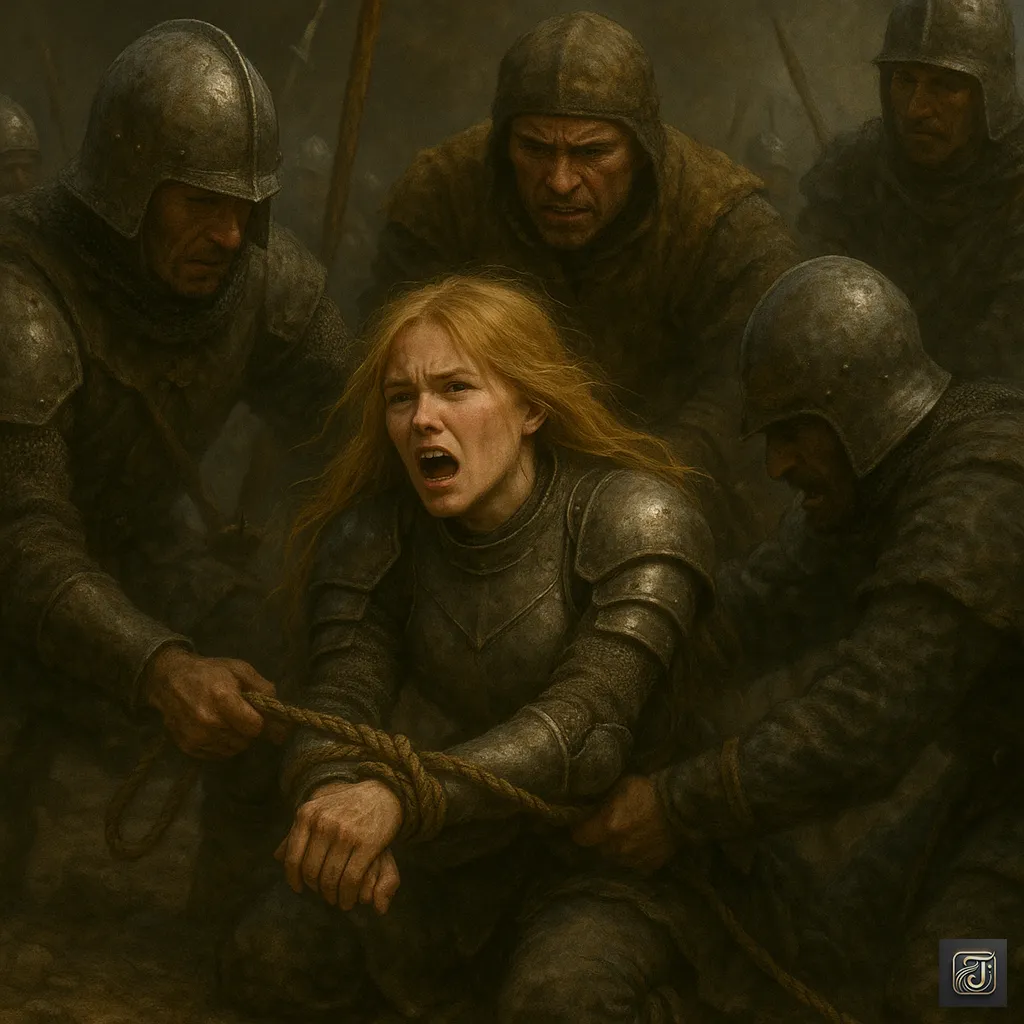
Joan of Arc:
“…Stop it…! Let me go!!”
The soldiers surrounded her and bound her with rope.
—Joan of Arc, captured.
It was the moment France’s hope was shackled in chains.
King Remains Silent.
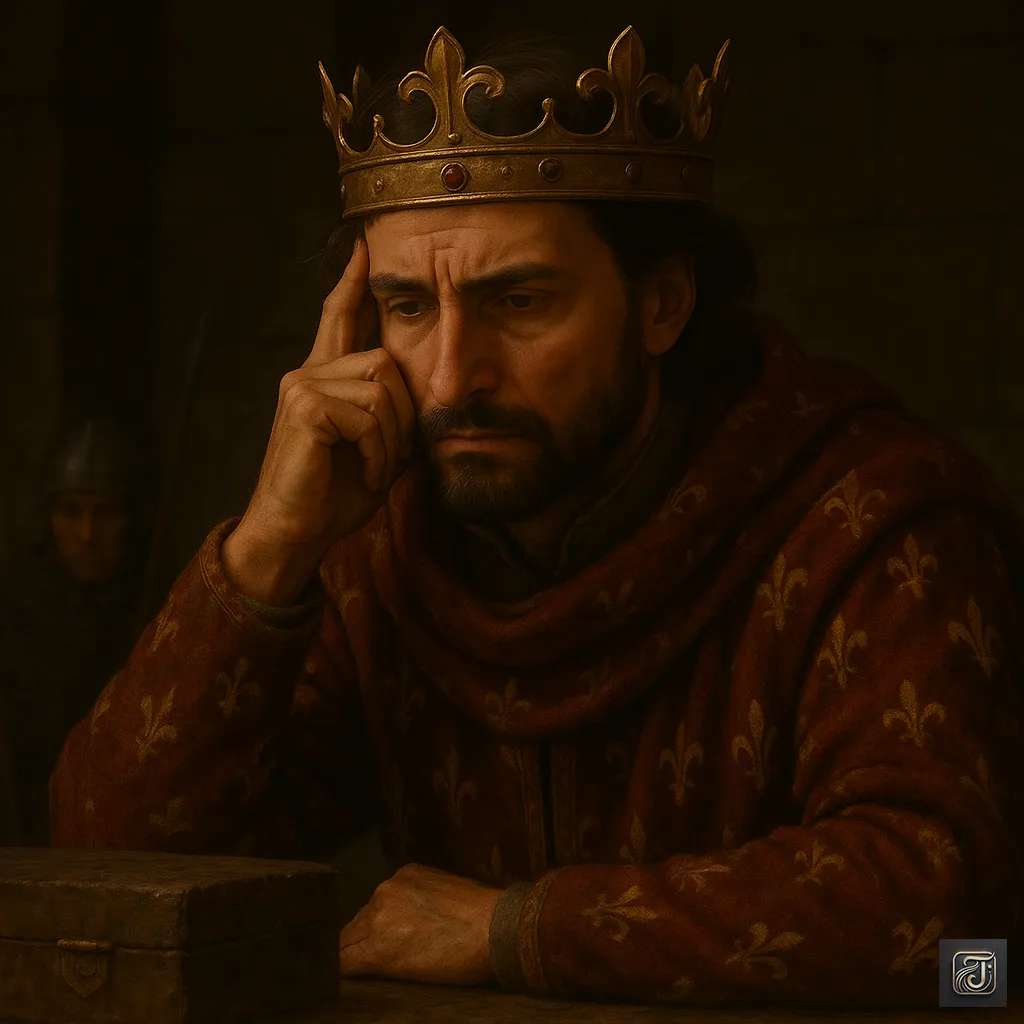
Joan’s capture quickly reached the ears of Charles VII.
The Burgundians demanded a ransom:
— 15,000 livres.
It was not a sum beyond the king’s reach.
On the contrary, had he welcomed her back as a hero, the people’s loyalty would have deepened all the more.
But Charles did nothing.
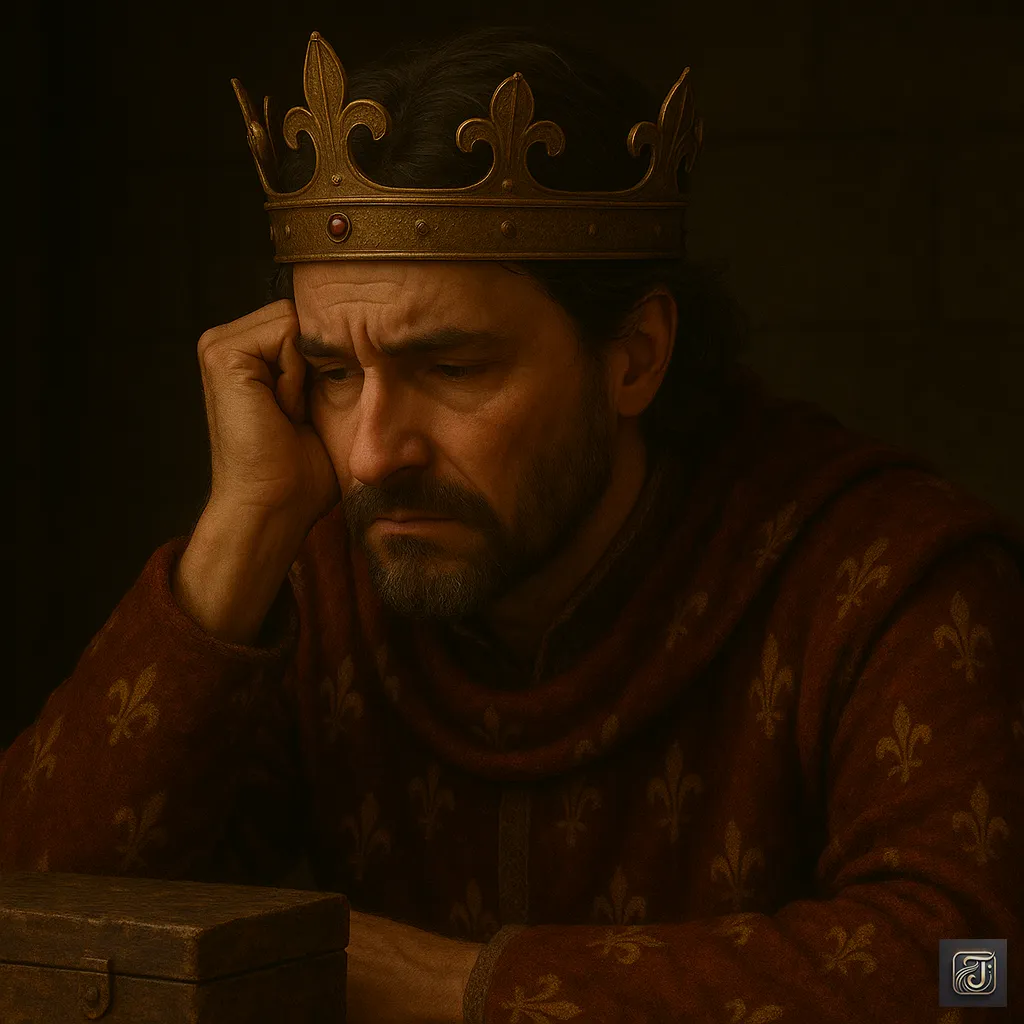
Charles:
“…She’s no longer of use to me.”
To Charles, Joan had become a tool of the past.
Worse—her presence dimmed his own light. That was the truth he dared not speak aloud.
And then came the cruelest blow.
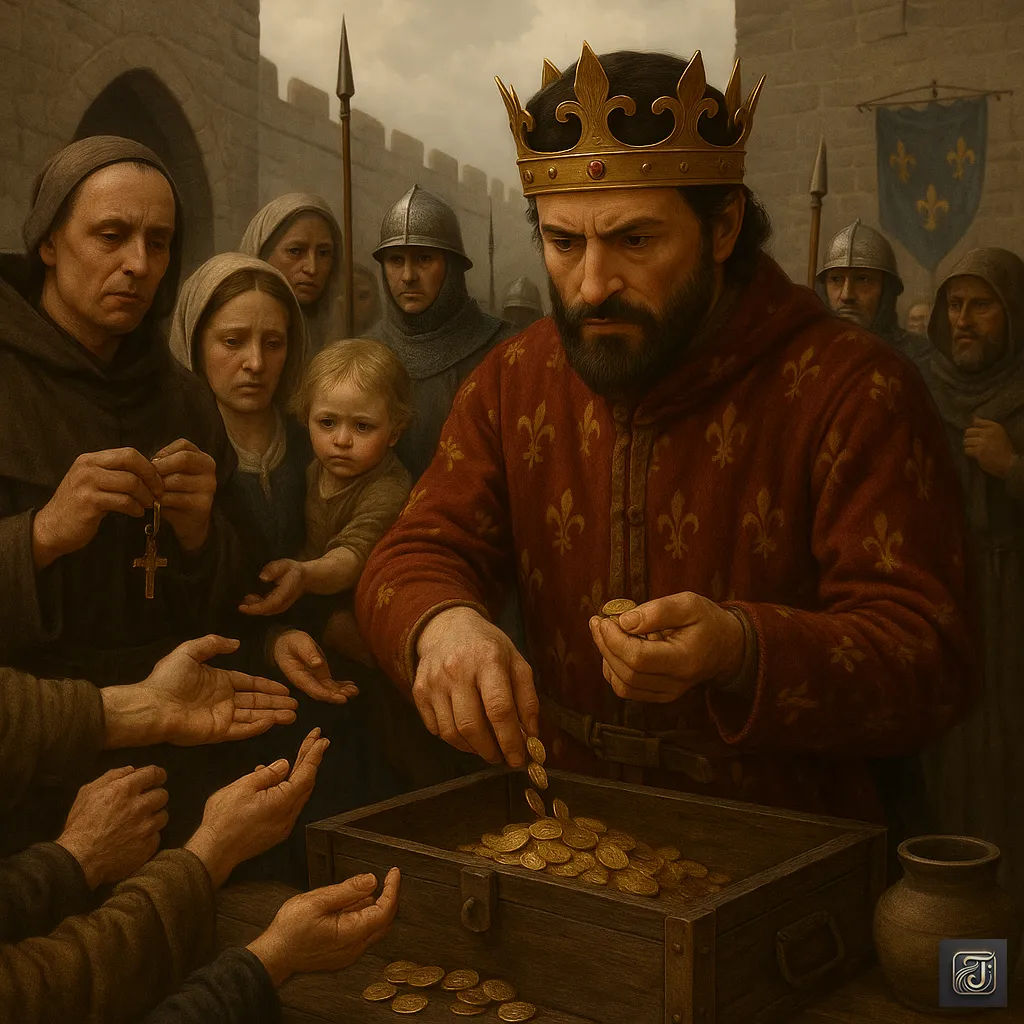
Joan’s supporters scraped together the ransom.
Piece by piece, prayer by prayer, until they had it all.
And just as they reached the sum—
Charles VII seized it.
The gold meant to save a saint was taken by royal decree.
The hands that reached out to rescue her were slapped away—by the very king she had crowned.
And then—
Purchase by England
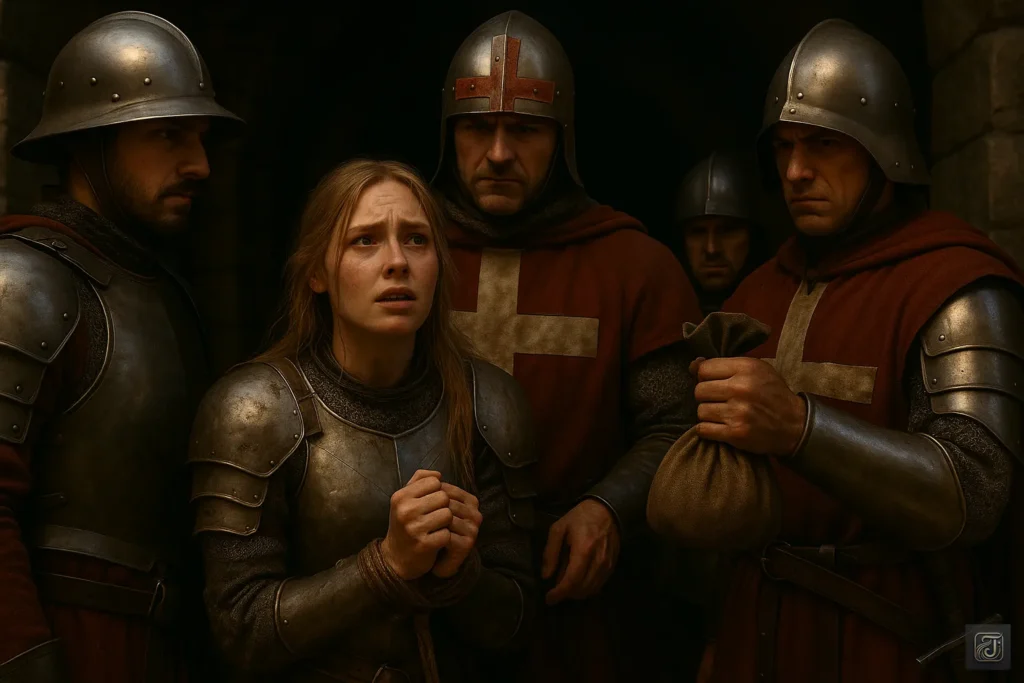
There was one more party that still needed Jeanne—
The English army.
To destroy the Saint of France.
This was no military operation.
It was a political execution meant to shatter the faith and hope of the French people by killing their spiritual pillar.
England paid the ransom and purchased Joan.
“For the sole purpose of executing her.”
That was the fate that awaited her.
Chapter 9: Judgment and Betrayal
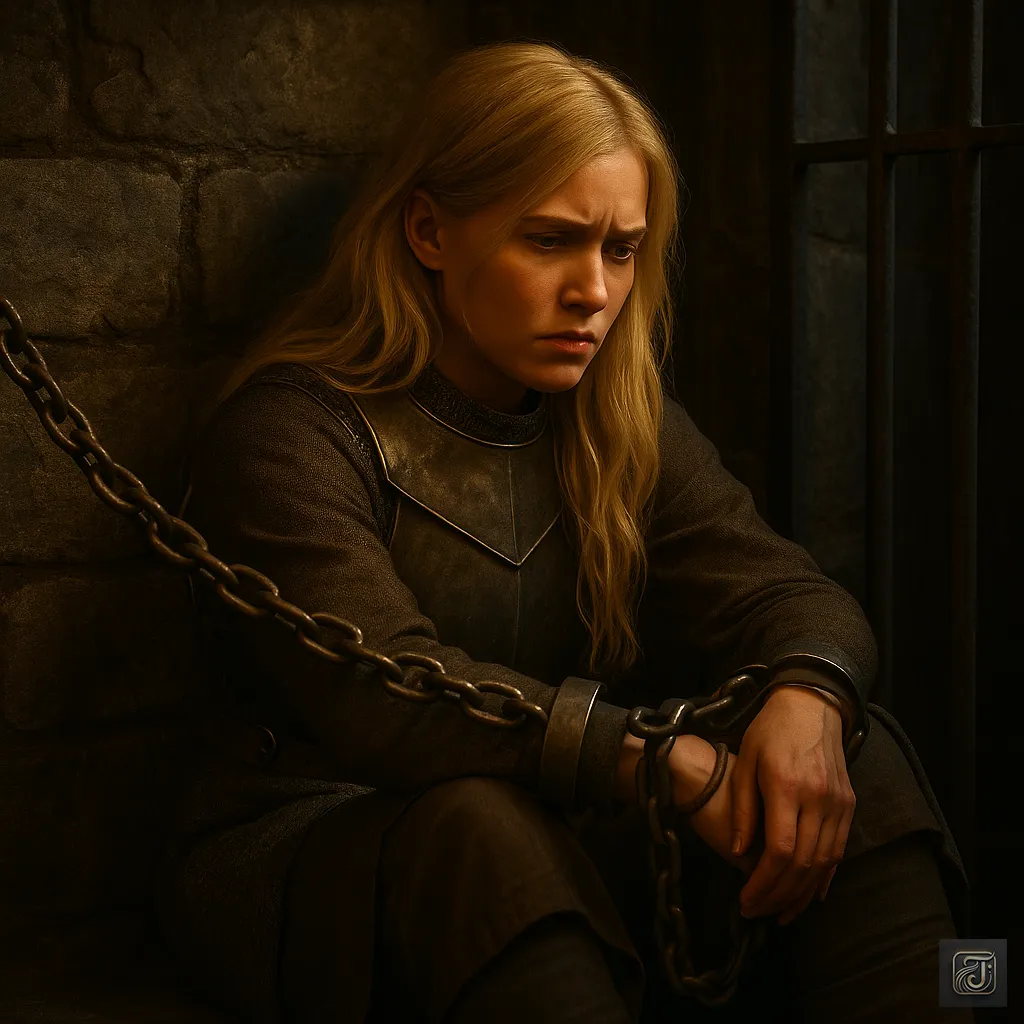
Rouen Castle.
There, Jeanne was no longer the “Holy Maiden.”
Shackled and confined to a crude cell, she was kept under constant watch by the English army.
Her crime — heresy.
For claiming to have “heard the voice of God” and leading an army without the Church’s permission.
For “wearing men’s clothing as a woman.”
For “speaking on behalf of God’s will” without ecclesiastical authority.
Each of these was considered a grave offense under Church law at the time.
The Inquisition
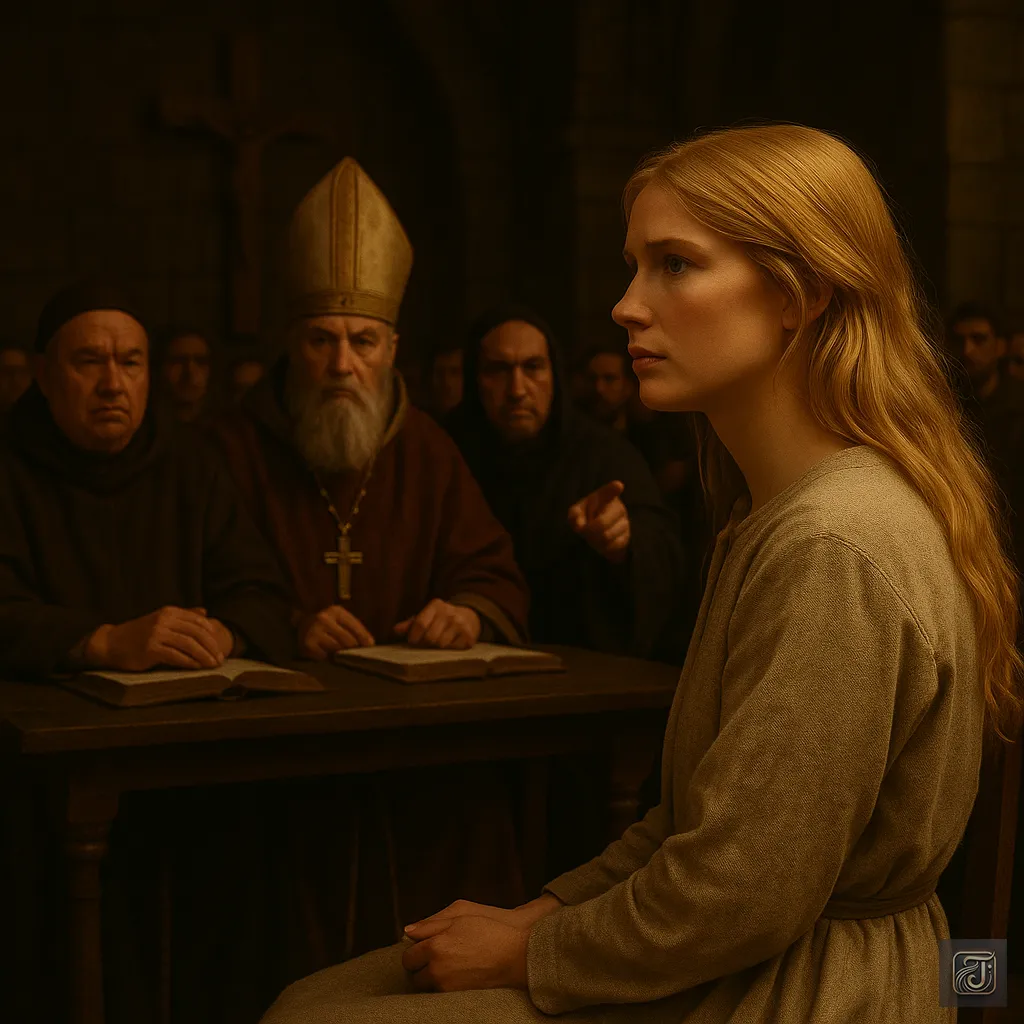
Joan’s trial was, in form, a “religious inquisition.”
The charge: heresy.
But in truth, it was pure political theater.
“If she is a heretic, then Charles—crowned by her—has no rightful claim to the throne.”
“If she is executed, the hope of the French people will be shattered.”
In short, it was about destroying the spiritual foundation of France.
That was England’s true aim.
At Rouen Castle, a church court was convened.
Joan was interrogated dozens of times.
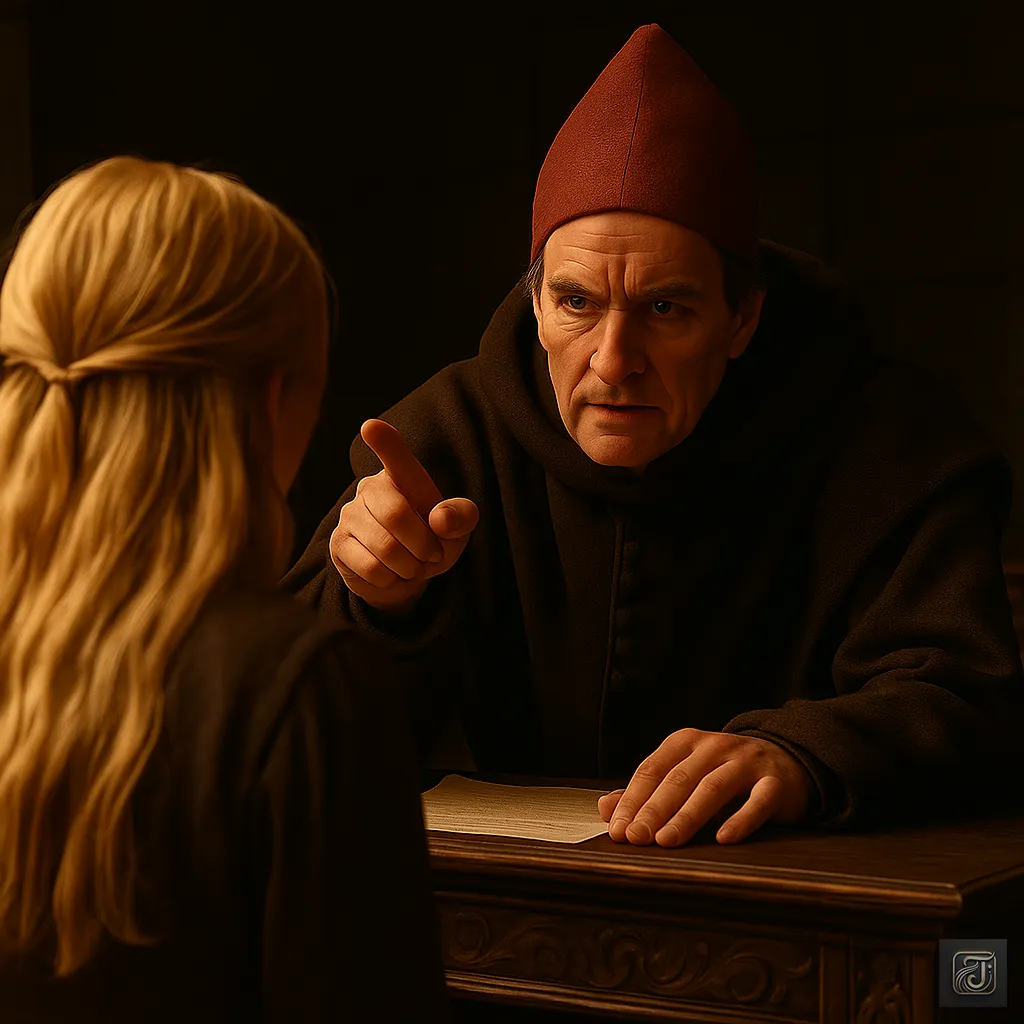
Church court:
“You claim to have heard the voice of God—where is your proof?”
“Why did you, as a woman, persist in wearing men’s clothing?”
“Could that voice not have been the whisper of the Devil, rather than of God?”
Joan answered with dignity, though weariness weighed heavy on her.
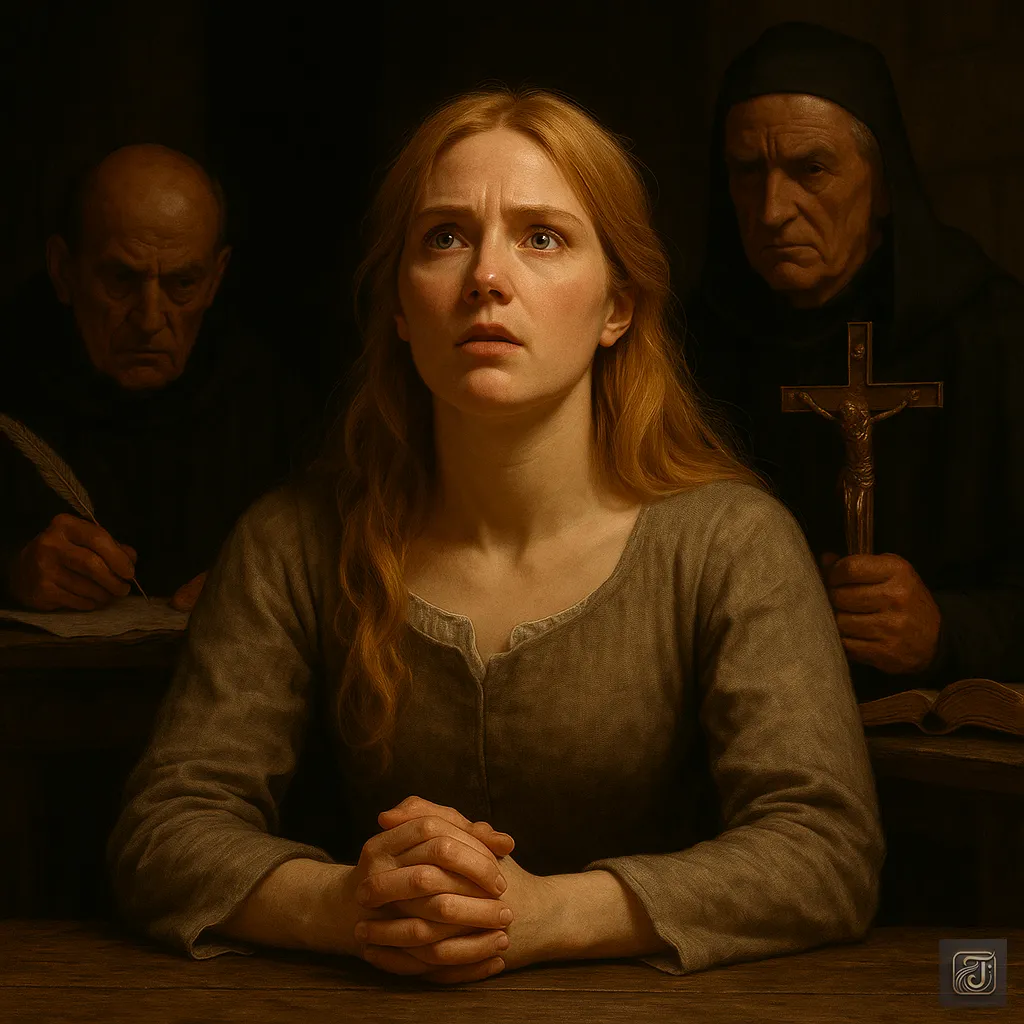
Joan of Arc:
“I fought under God’s guidance.”
“I saved France in His name.”
But to admit that was to be guilty of defying the authority of the Church.
And to deny it was to be guilty of false testimony of divine revelation.
It was a trial designed as a trap—no matter which path she chose, it led to condemnation.
The Clergy’s Dilemma
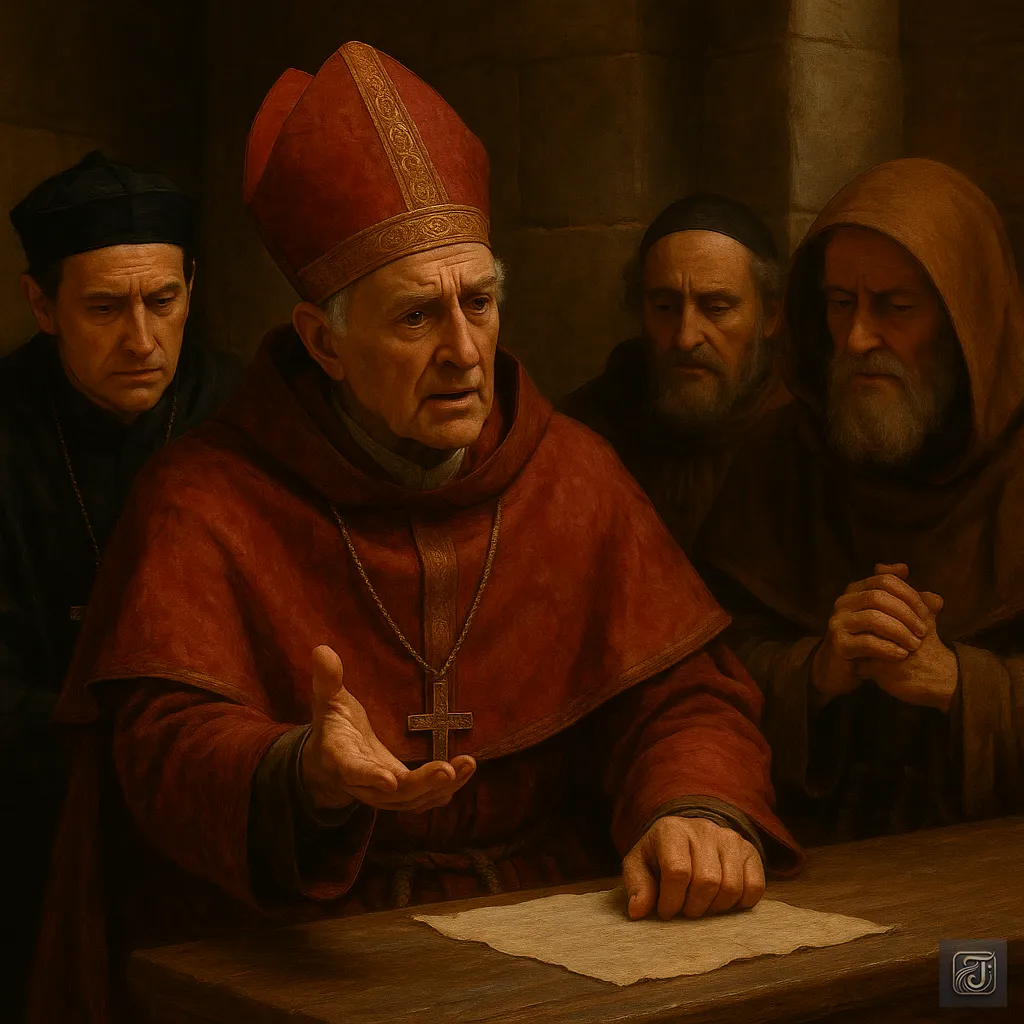
Church court:
“She may have broken the rules, yes—but she didn’t understand them to be sinful.”
“If she repents with sincerity, then she is no longer guilty.”
“The Church never abandons those who truly repent.”
Among the clergy present at the trial, there were those who wished desperately to save Joan.
They fought to the last—because above all, they wanted to prevent her execution.
Then, one of the English-appointed judges declared coldly:
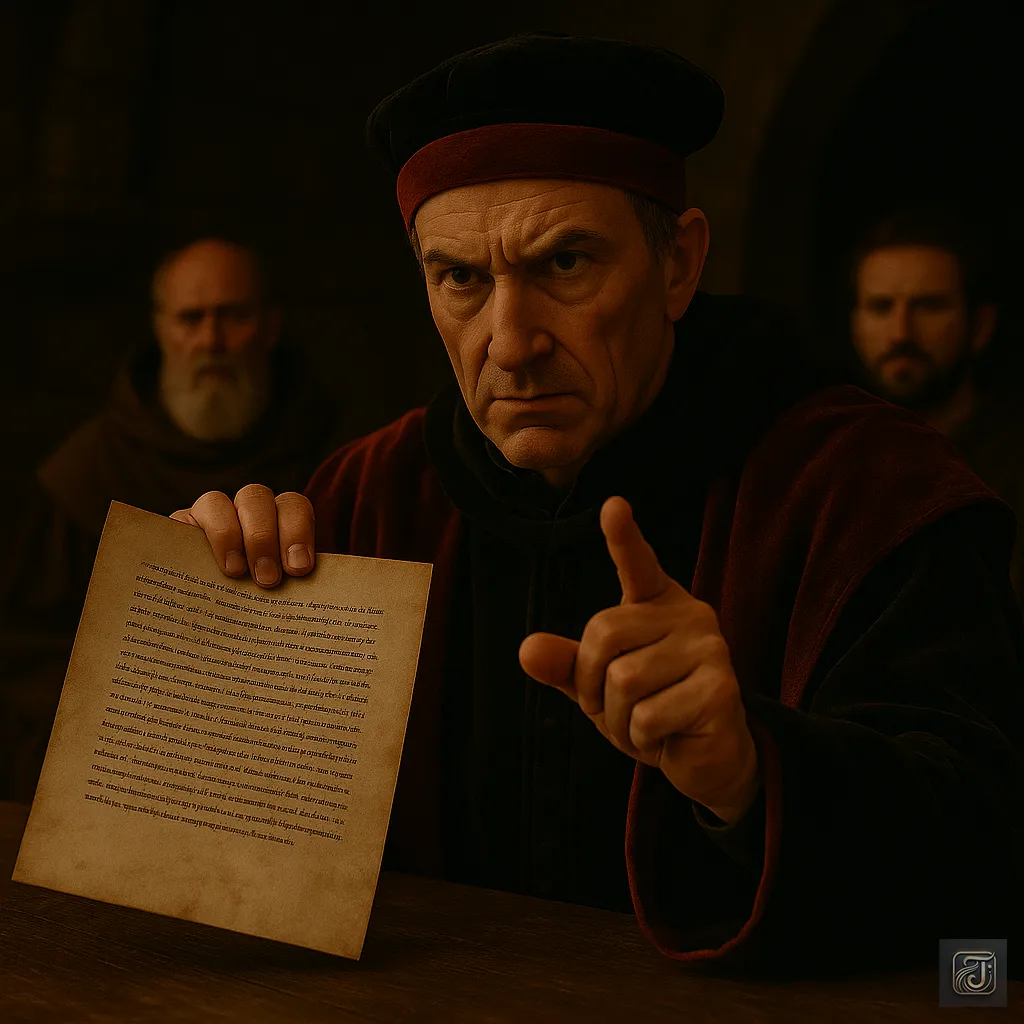
Judge:
“I, Jeanne, do solemnly swear before God and the Holy Church that I renounce all heresies and errors.”
“I shall never again claim to hear the voice of God.”
“If I should return to my former ways, I accept the punishment that follows—including death by fire.”
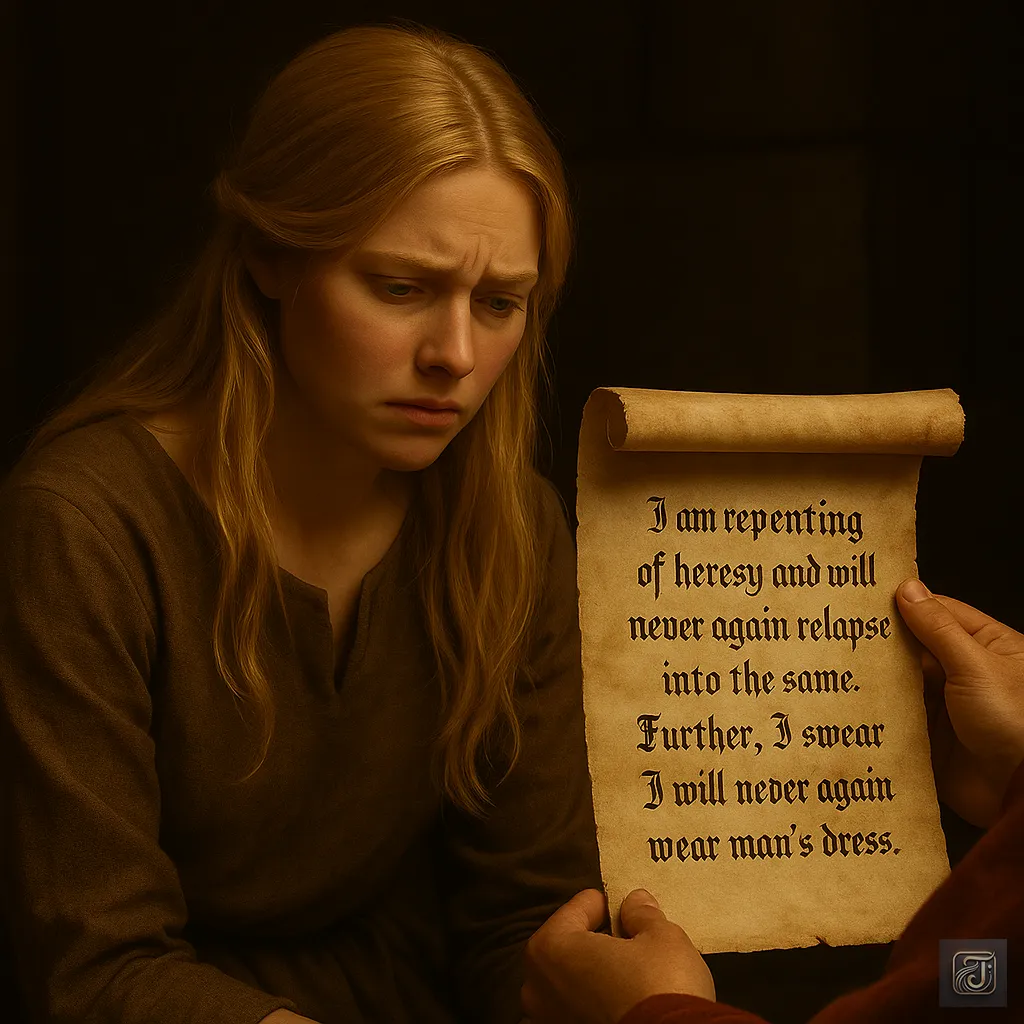
“You only need to sign this, and you will live.”
“This is not a betrayal of your faith. It’s just a formality.”
“You’ll be spared from the fire. Please, Jeanne—trust us.”
Believing in their sincerity—and desperate to avoid more suffering—Jeanne took the pen.
She signed.
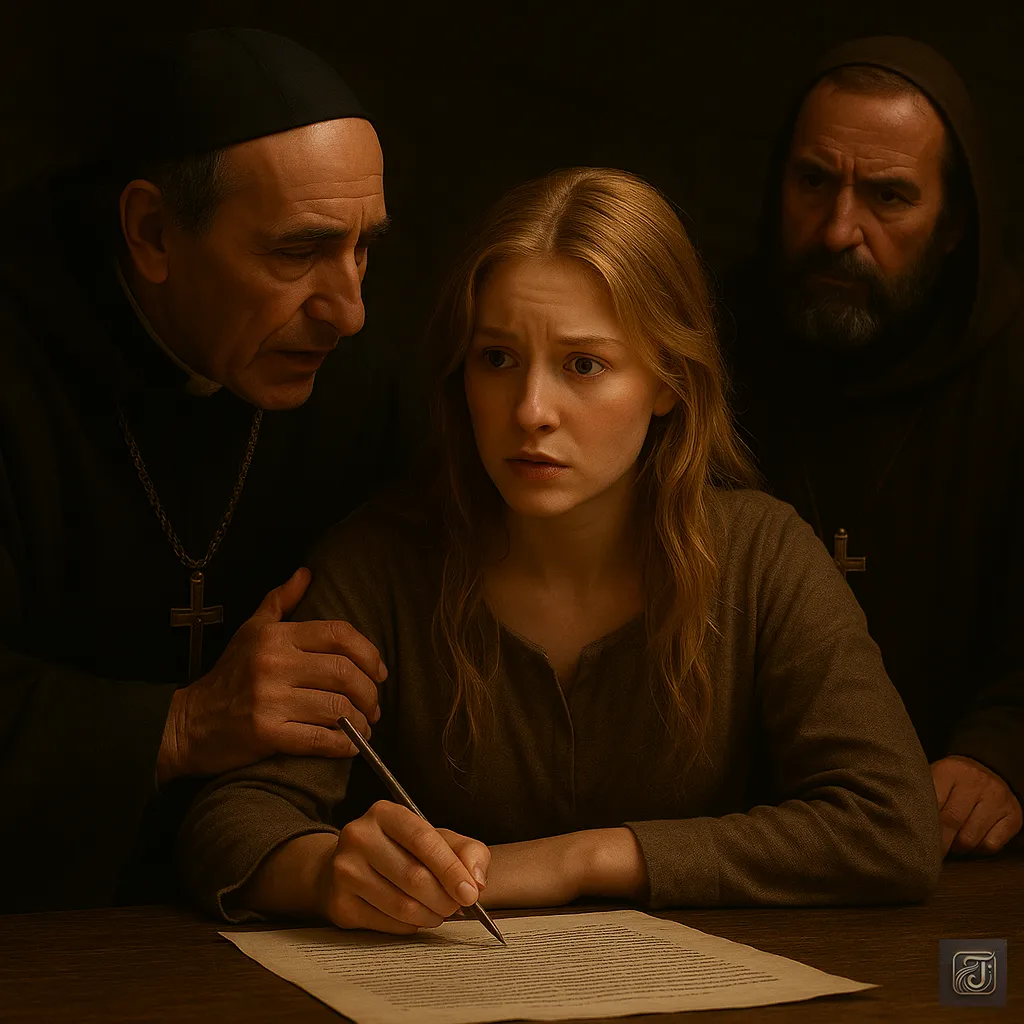
Church court:
“Sign it, Jeanne. This will save your life.”
“It only shows that you repent—nothing more.”
“If you do, there will be no reason to execute you.”
They only wanted to save her life. To prevent her from being burned alive—that was their sole wish.
And Jeanne… she believed them.
To protect her life. To protect her faith.
—She signed.
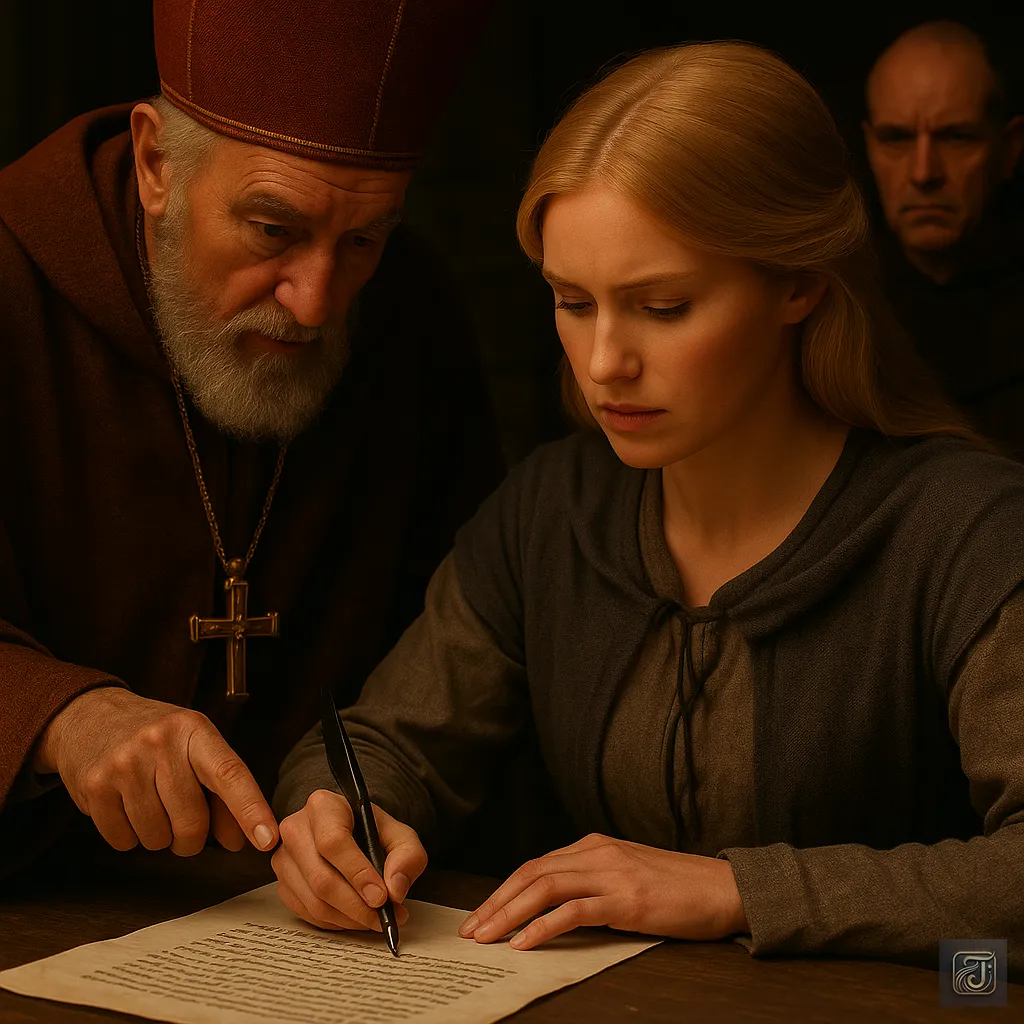
Joan of Arc:
“…Very well. I will sign it.”
The moment her signature was placed on the paper, the priest raised his voice toward the heavens and cried out:
“She has repented! Jeanne has returned to the Church!”
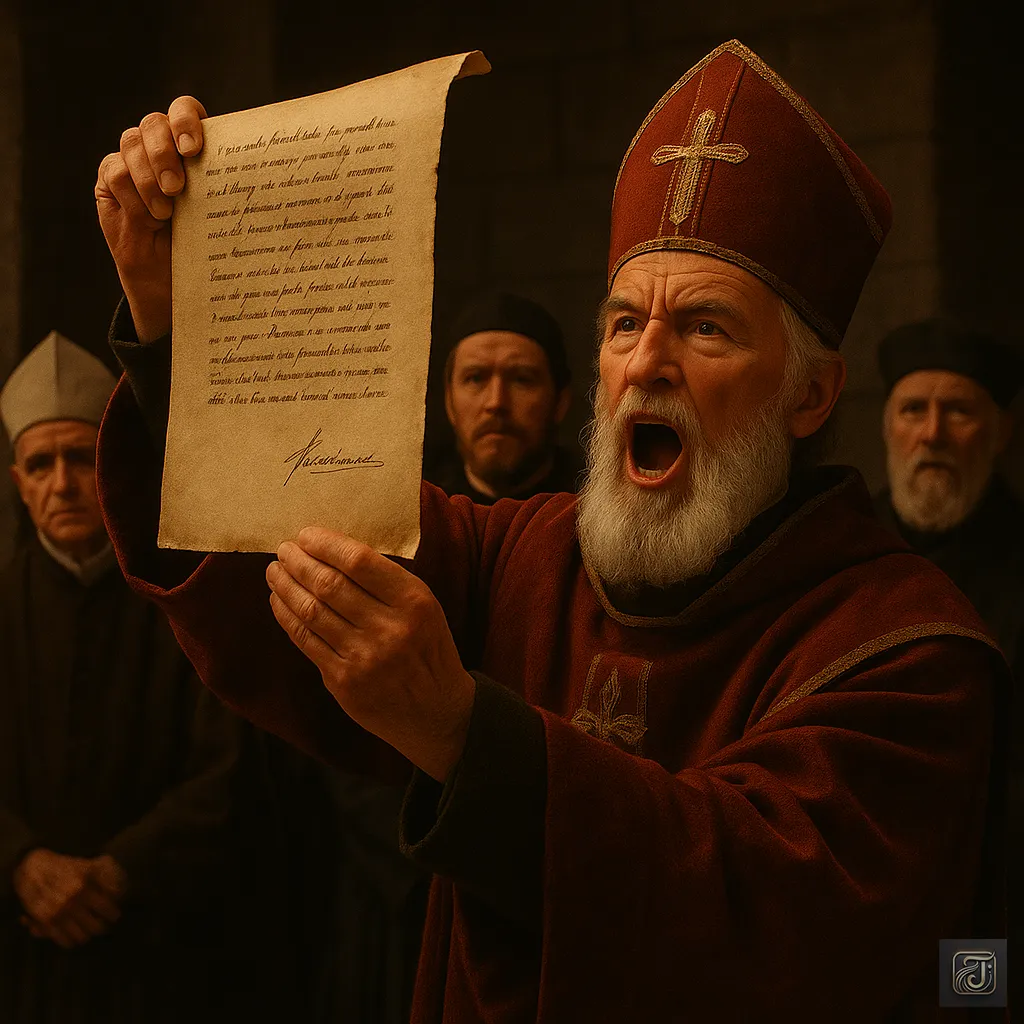
Church court:
“Look! She has repented for her sins!”
“She is no longer a sinner!”
“The Church never abandons those who truly repent!”
The abjuration document was held high, and for a moment, hope began to spread among the people…
But it was a trap.
The Final Trap

That night, in her cell, Jeanne was forcibly stripped and left naked.
The only clothing given to her—was a man’s outfit.
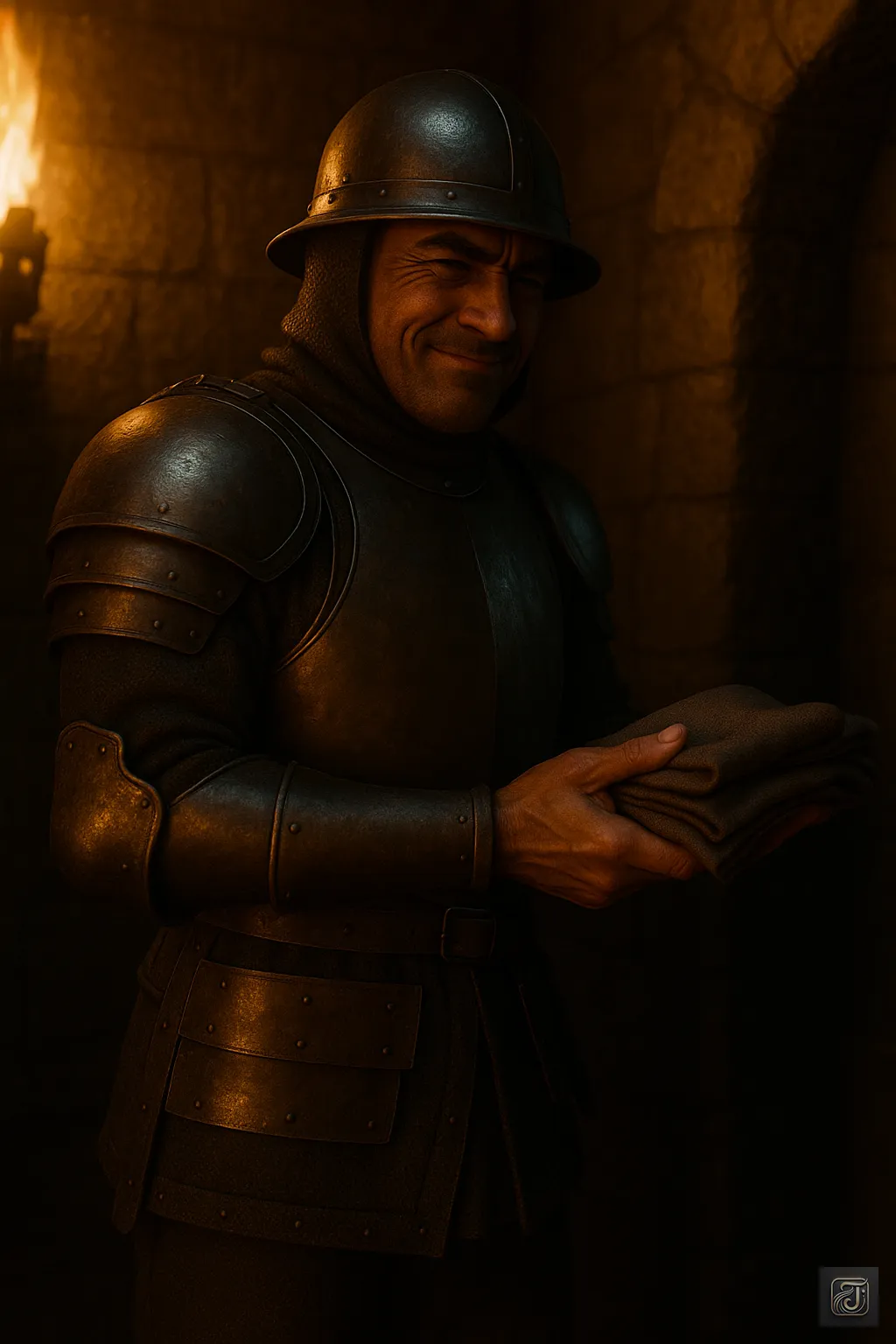
English Soldiers:
“You want clothes, don’t you?”
“Then wear this.”
“It’s perfect for someone like you.”
It was a trap.
For Jeanne, wearing men’s clothing was considered the very proof of her heresy.
By forcing her to wear it again, the English aimed to label her a relapsed heretic—a crime punishable by death.
Just days earlier, Jeanne had been coerced into signing a declaration stating she would never again wear male attire.
But being unable to read, she had no way of understanding the weight of those words.
And then—
Jeanne put on the clothes.
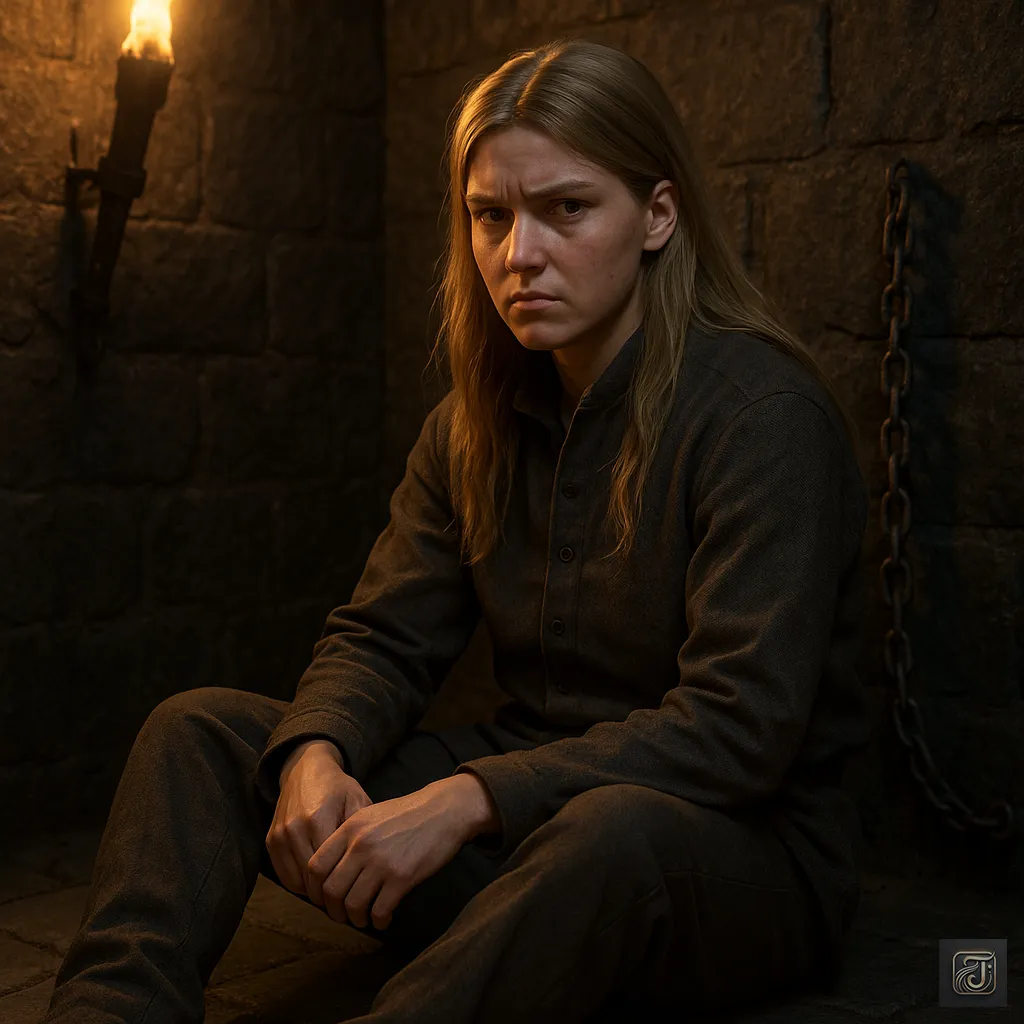
Jeanne knew nothing.
She did not know that the declaration she had signed included a clause forbidding her from ever wearing men’s clothing again—
Nor did she know that breaking that clause would label her a relapsed heretic, punishable by death at the stake.
With trembling hands, she put on the clothes.
To shield herself from the cold, from humiliation—
But above all, to stay alive.
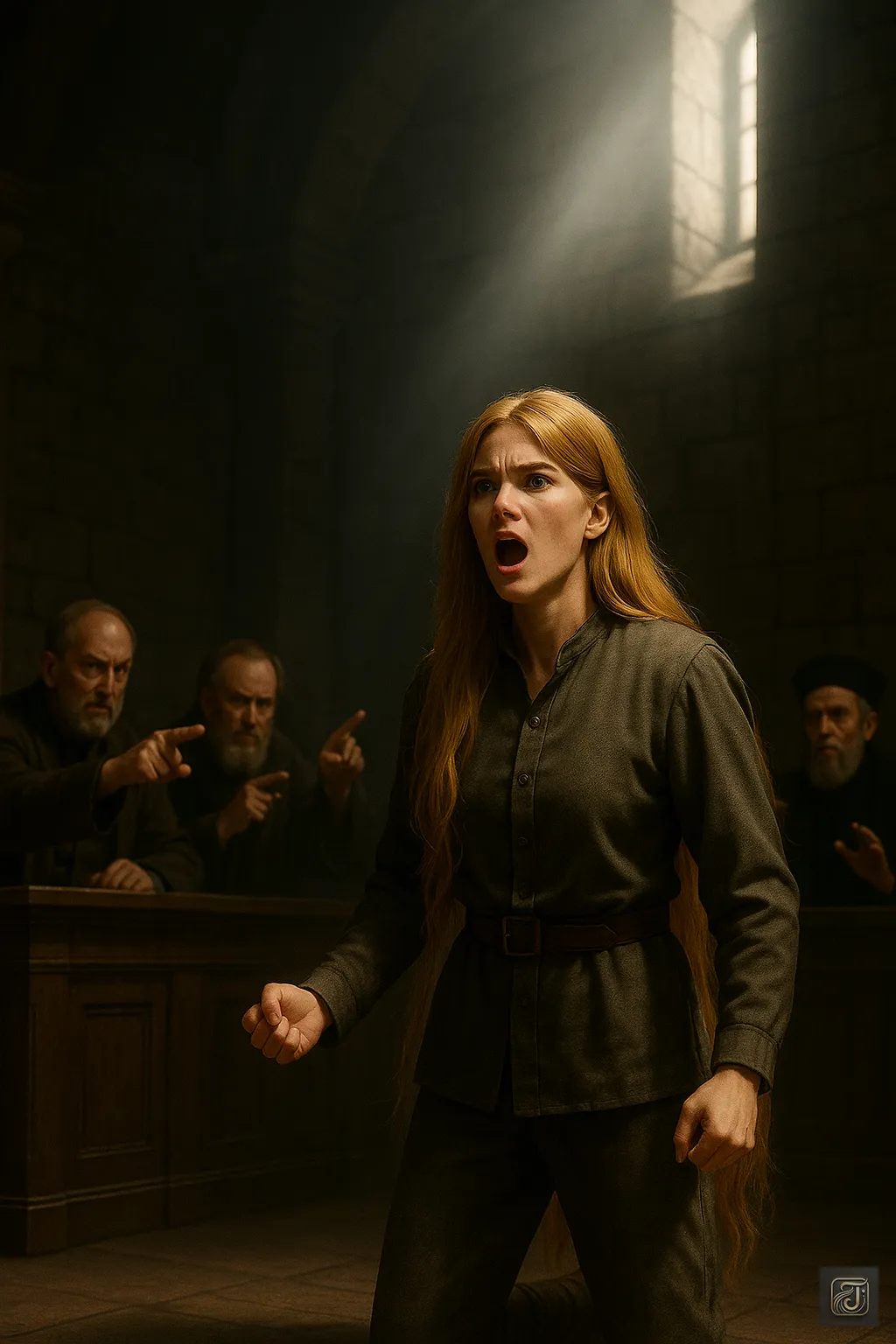
Judge:
“Did you see that?!”
“She’s wearing men’s clothing again!”
“She has broken her sacred vow!
“One who repented now commits the same sin anew!”
“This is a relapse into heresy!”
“She is a relapsed heretic!”
And a relapsed heretic—meant only one thing: immediate execution by fire.
Jeanne cried out:
“I didn’t know! No one told me about that clause!”
But no one listened.
No one ever intended to.
England had planned it from the beginning.
And so, the verdict was passed:
—Jeanne d’Arc, to be executed as a relapsed heretic.
Thus ended the life of the girl who heard the voice of God.
Chapter 10: The Eternal Jeanne
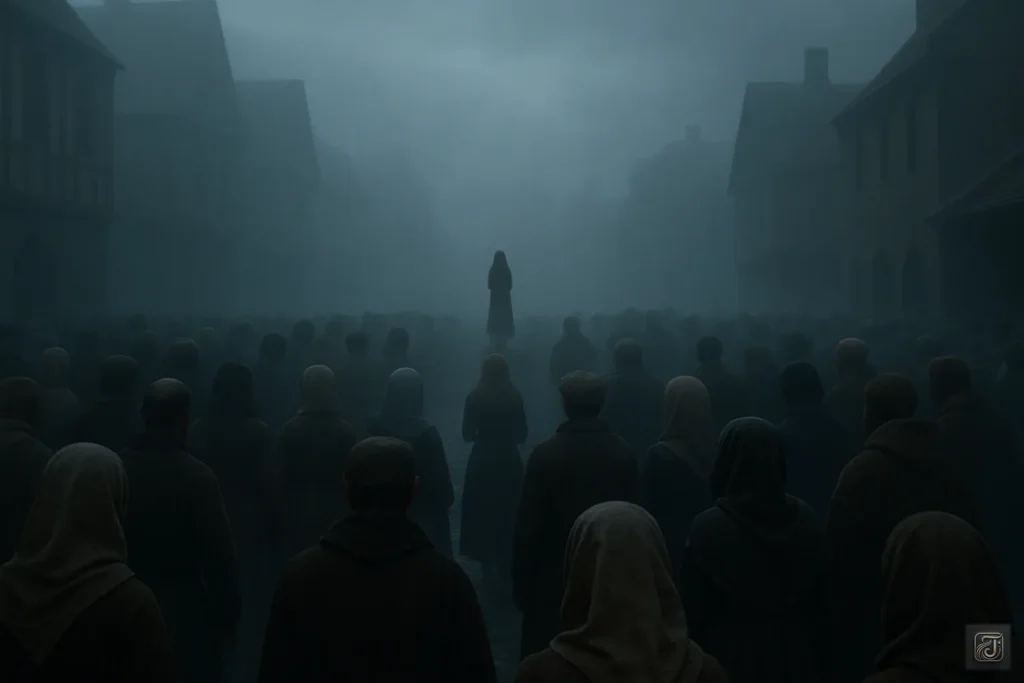
May 30, 1431 — Rouen.
The morning was gray.
Damp air blanketed the city, and the people gathered in silence.
— An execution by fire.
That day felt as though even God had fallen silent —
Heavy. Cold. Relentless.
The Pyre
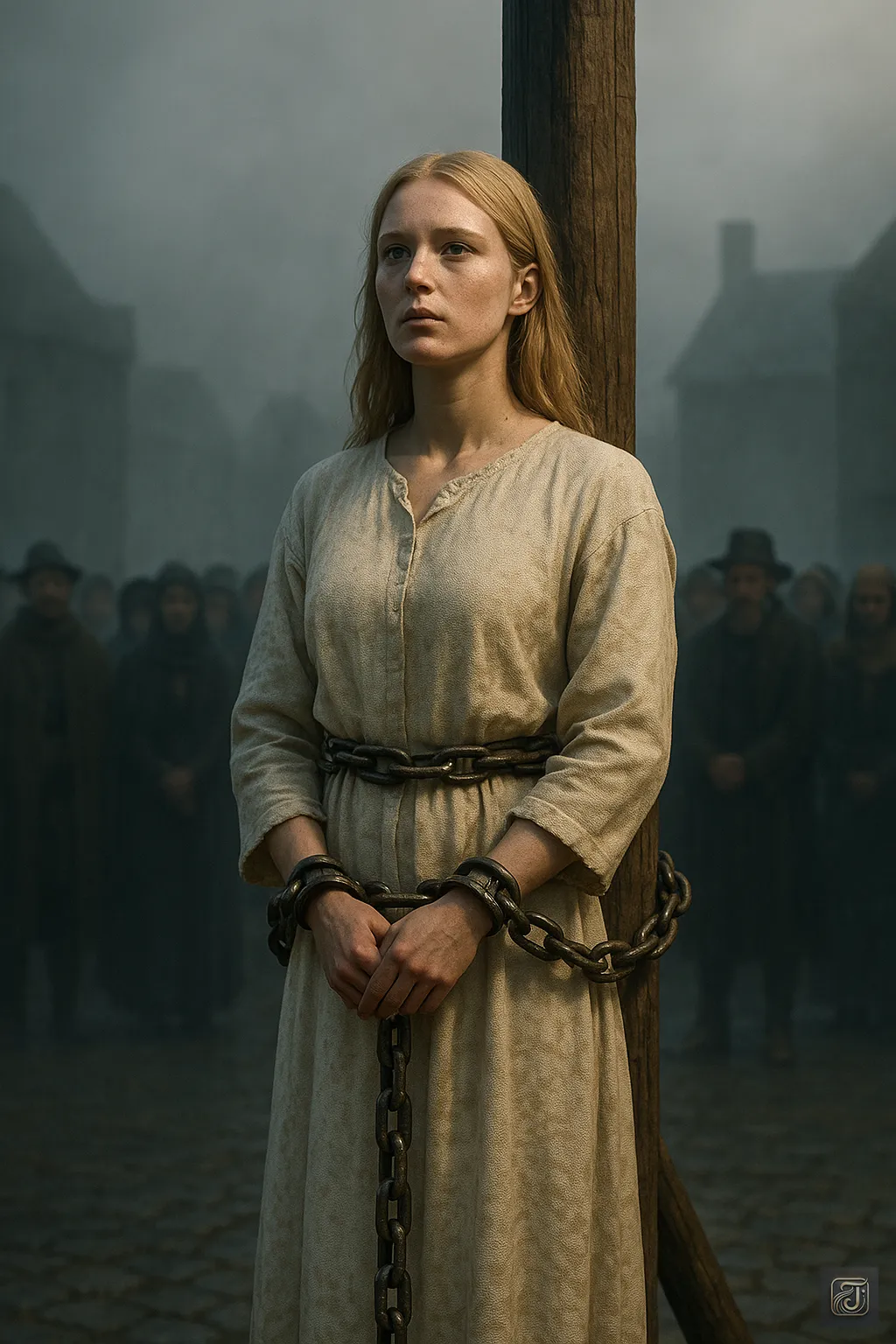
Joan of Arc was dressed in a plain white robe and led to the stake erected in the central square.
Her hair had been cut, and her arms were bound to the pillar with iron chains.
At the sight of her, many in the crowd fell silent, their voices caught in their throats.
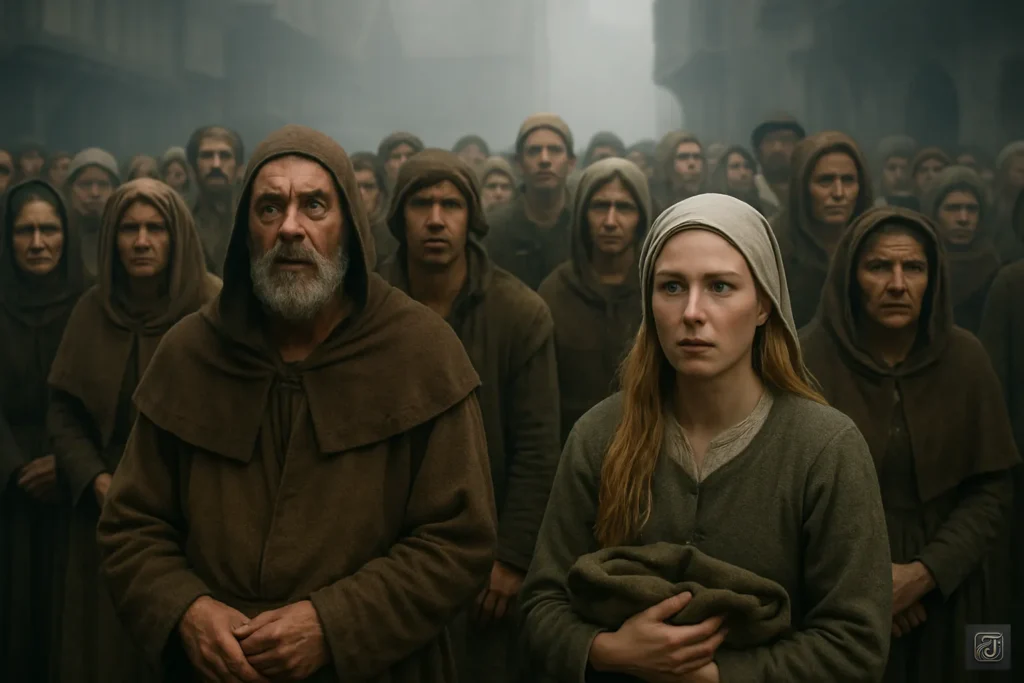
Citizens:
“…That girl… why her…?”
“She’s the saint who saved France…”
But no one could stop it now.
England had passed judgment.
The Church remained silent.
And the King turned a blind eye.
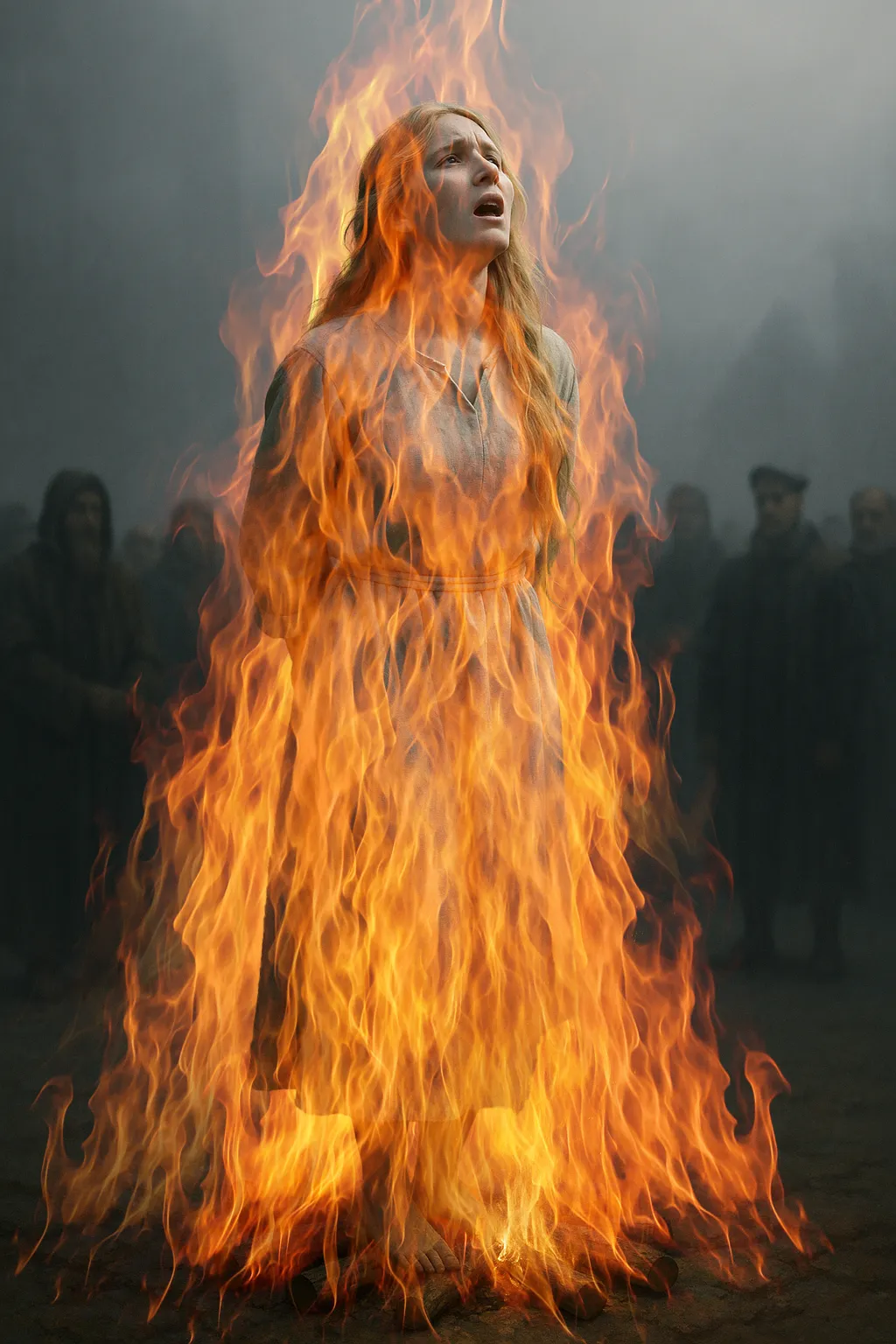
The executioner lit the wood beneath her.
Flames licked up from Jeanne’s feet, slowly and surely devouring her body.
“God… please… save France…”
That was her final prayer.
There were no screams.
She did not cry. She did not beg.
She simply prayed, as the fire engulfed her.
She was just 19 years old.
And in that moment, what burned itself into the hearts of the people was—
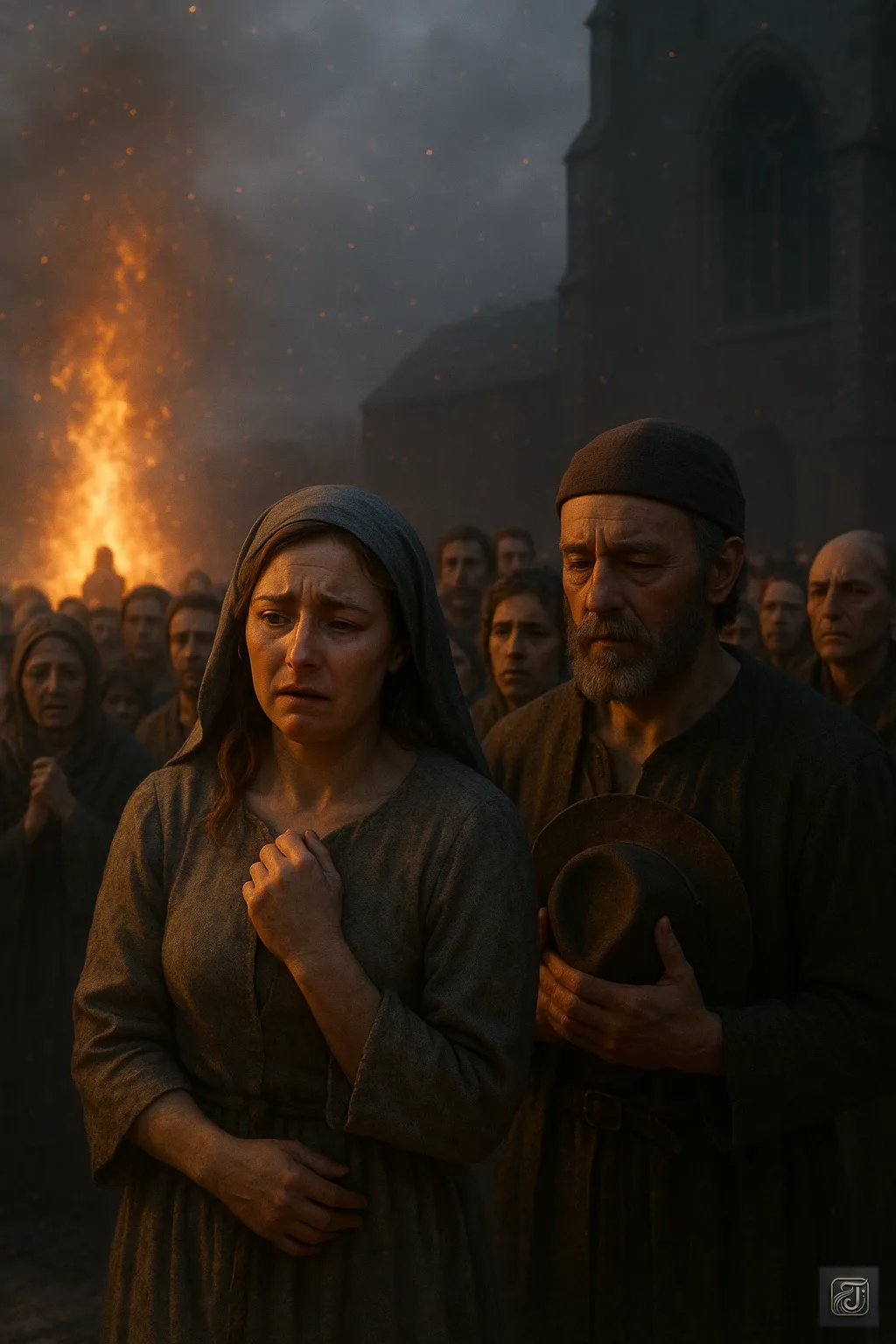
“Was she truly a sinner?”
That lingering doubt—
would never be extinguished.
The Time of Rehabilitation
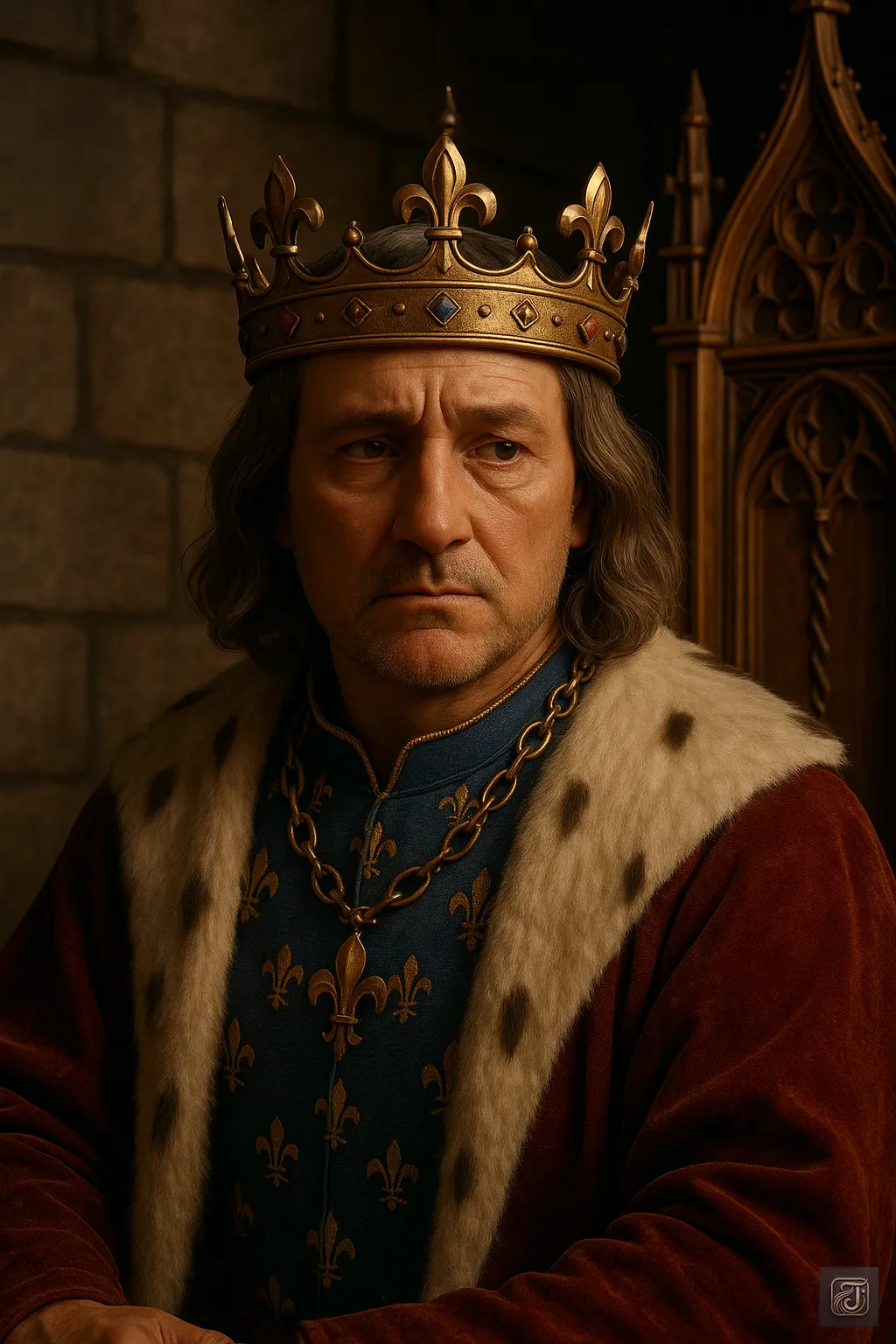
25 years after Joan’s death.
Time passed, and Charles VII remained on the throne.
But the voices of the people would not be silenced.
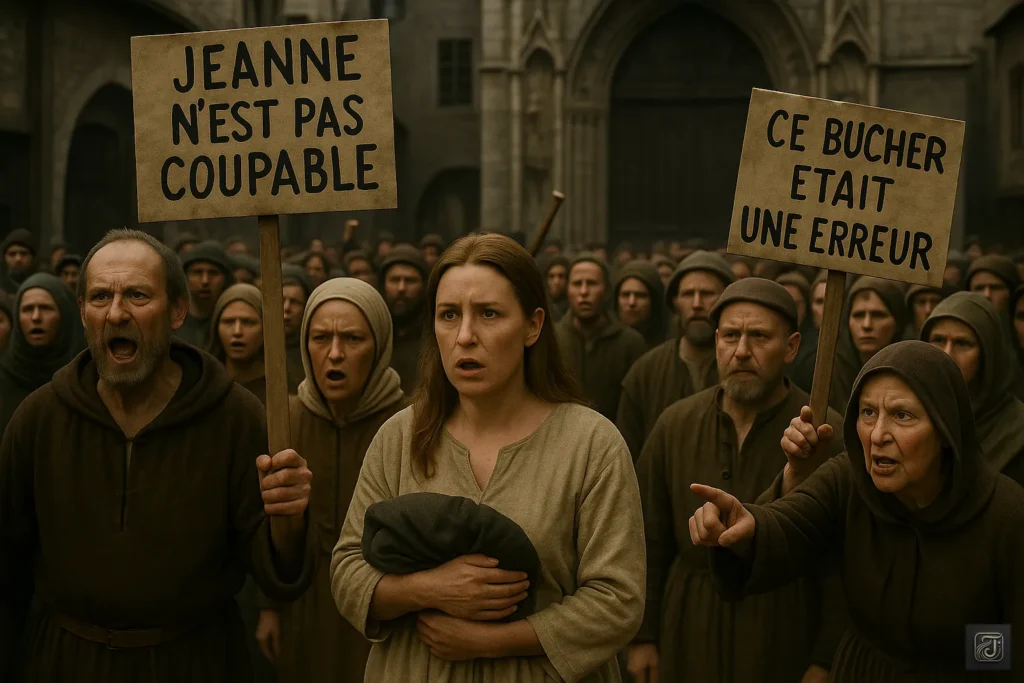
Citizens:
“Joan was not a criminal.”
“Reveal the truth.”
“That execution was a mistake!”
Eventually, Charles VII and Joan’s family petitioned the Roman Papacy.
It was a request to retry Joan’s trial.
In 1456, the retrial began.
Former witnesses, soldiers, clergy, villagers — hundreds came forward to testify.
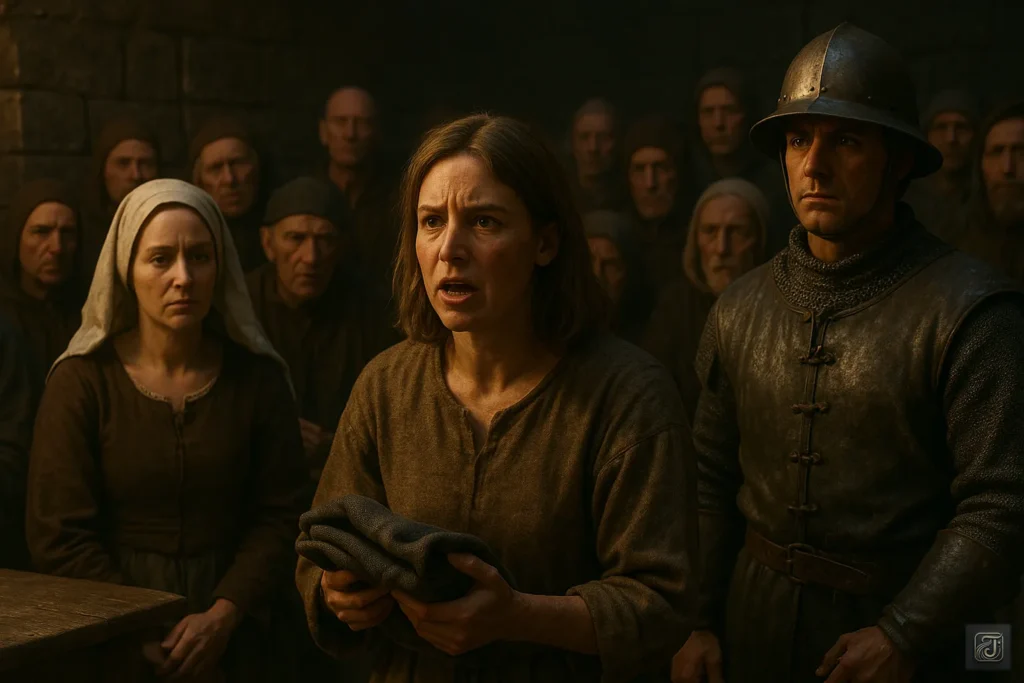
Citizens:
“Joan was not a heretic.”
“She was innocent — in fact, she served God.”
“The trial was a political conspiracy.”
After three months of inquiry, the Papacy delivered its verdict.
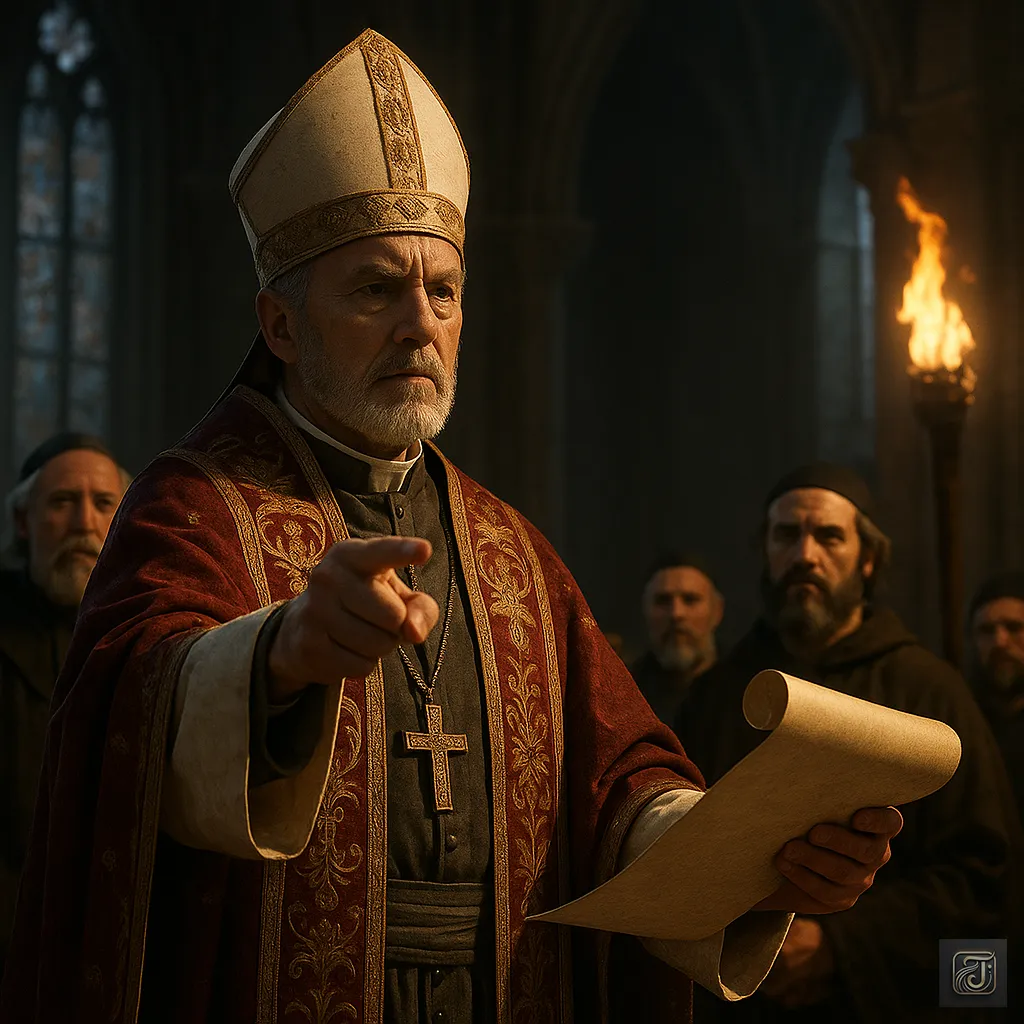
Judge:
“Joan of Arc is innocent and not a heretic.”
“Her execution was unjust.”
Her honor was fully restored — after her death.
The Eternal Saint
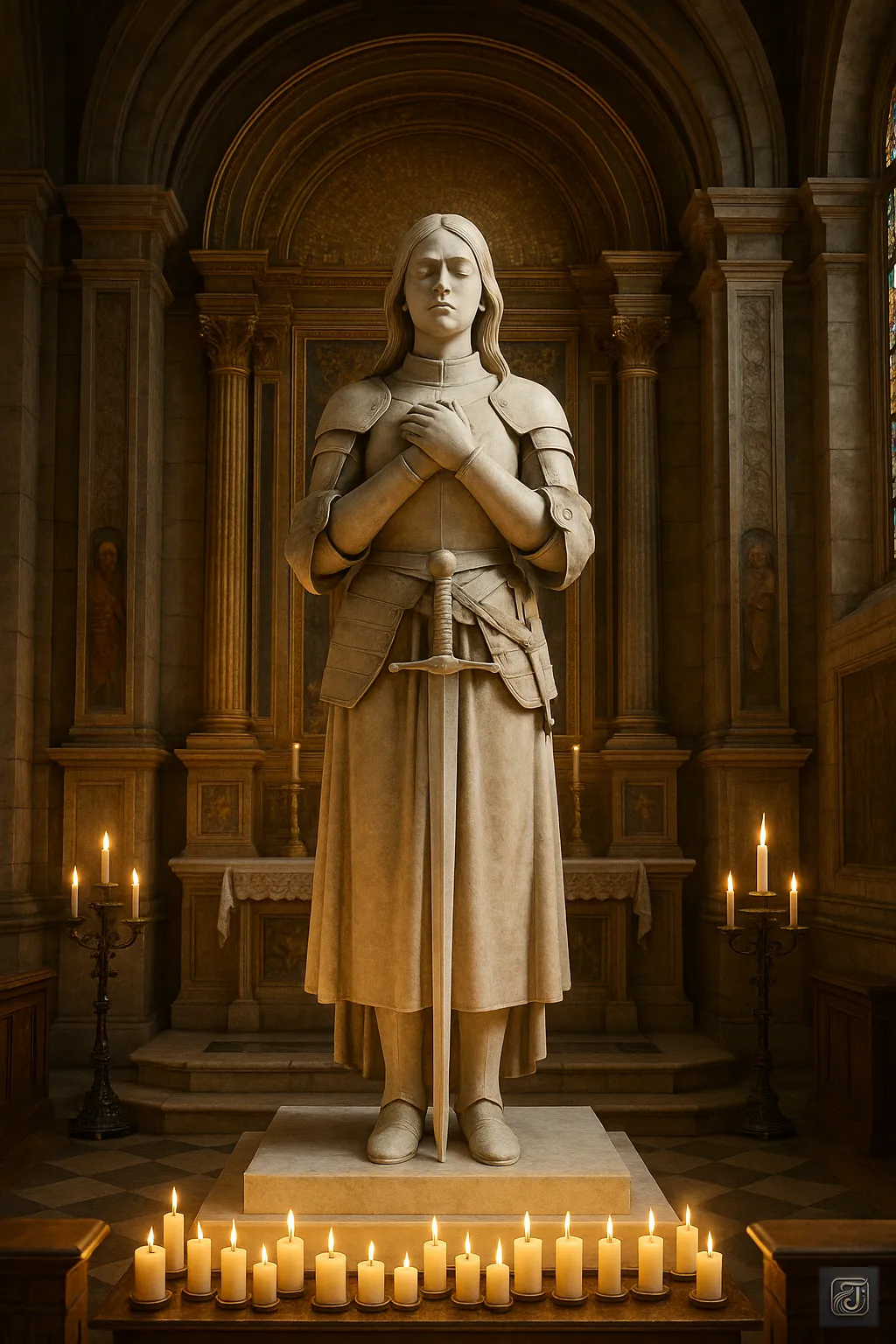
And then, as time passed—in 1920,
the Catholic Church officially canonized Jeanne d’Arc as a saint.
Saint Joan of Arc.
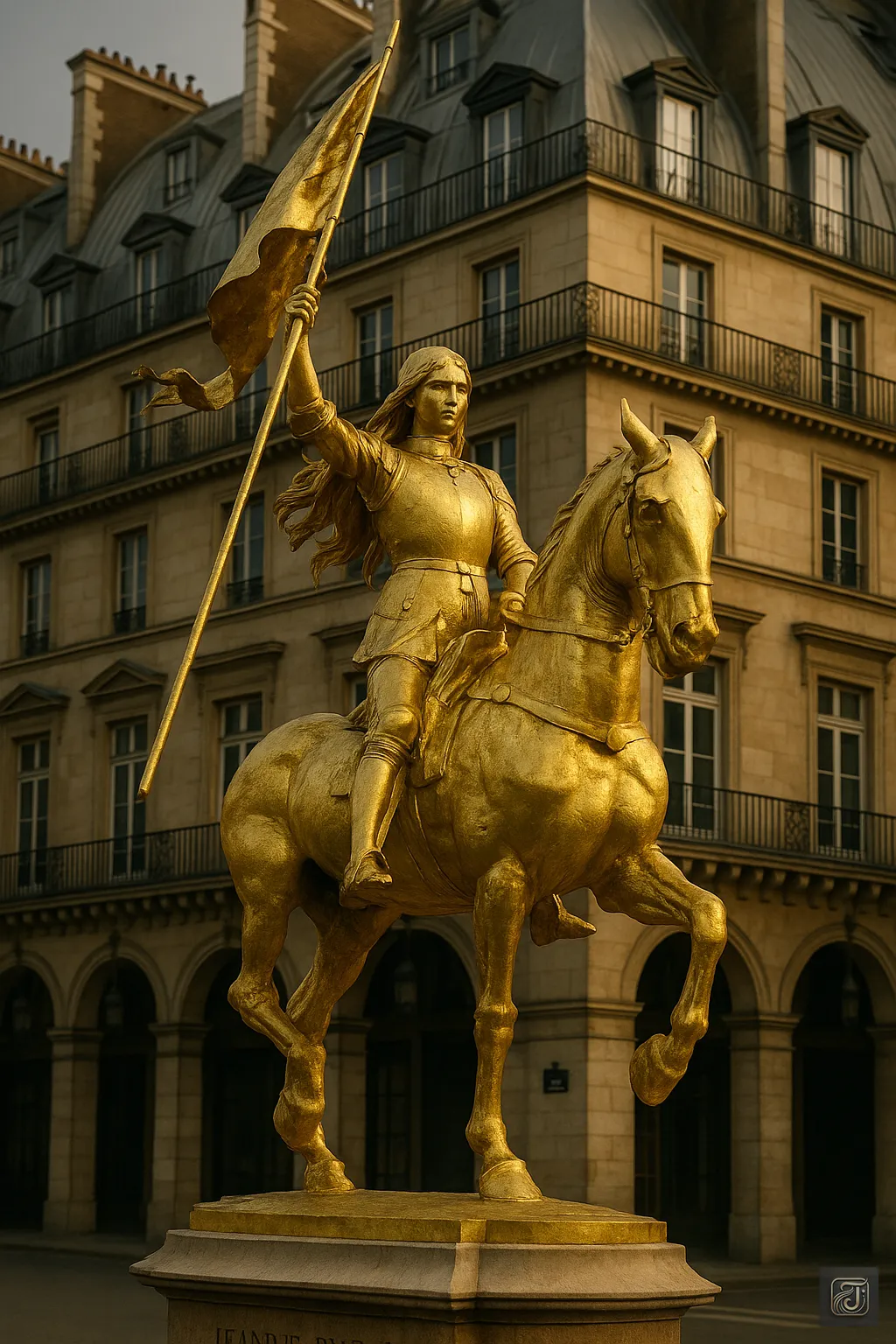
That name belonged to a girl chosen by God,
Who saved her country, was betrayed,
and perished in flames—yet still shines upon the world with her soul.
Even today, her golden equestrian statue stands in Paris’s Place des Pyramides,
Silently watching over those who come to see it.
What is engraved there is not Jeanne’s final prayer—
But her very life itself.
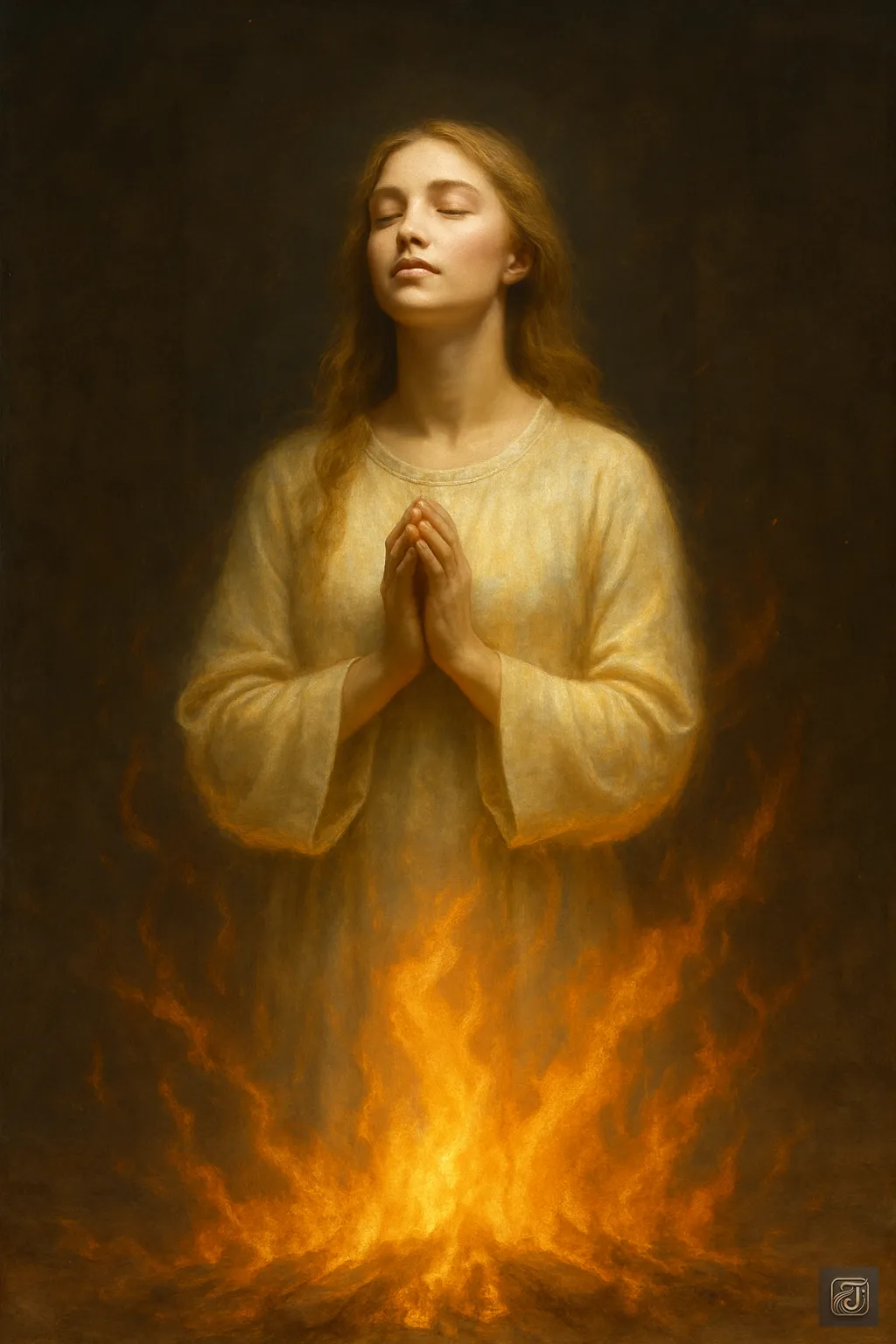
“I heard the voice of God.”
And then, she saved France.
Author’s Afterword

Jeanne d’Arc—
She was chosen by God, saved her nation, and was betrayed by man.
Yet her story is not a tragedy.
She charged through the battlefield with a sword in hand, followed the voice of God,
And even when engulfed in flame, her soul did not burn out.
The homeland she tried to protect, the justice she believed in,
and the faith she devoted herself to—these still resonate in our hearts, even 500 years later.
While writing this story, I paused many times.
What was she thinking? Was she truly unafraid? Why didn’t she try to run?
But she never fled. She never lied to anyone.
Until her very last moment, she walked the path she believed in.
What is “faith”?
What is “courage”?
Jeanne’s life, I believe, was one answer to those questions.
And now, her golden equestrian statue still stands quietly on a street corner in Paris—
as if asking us:
“And you—what do you believe in?”

“What do you fight for?”
To you, who have read this story to the end—thank you from the bottom of my heart.
I hope that one day, Jeanne’s spirit will ignite a new flame within you.
— Author, Fuji
If you found this article helpful or enjoyable, please consider supporting me with a cup of coffee! 👈Click☕🙏
I’m a passionate blogger who loves diving deep into human history and sharing captivating stories about remarkable figures and events from the past.
My blog combines engaging storytelling with beautiful illustrations, making history accessible and enjoyable for everyone.
Currently, I write my blog while managing a full-time job.
Balancing both limits the time I can dedicate to research, writing, and illustrations.
With your support on Ko-fi, I can reduce the time spent on my main job and focus more on blogging, allowing me to increase the frequency of updates and bring you even more captivating stories.
Whether it’s a one-time coffee or a regular contribution, every bit goes directly into making history engaging and fun for my readers.
Thank you for joining me on this journey through time.
Let’s uncover the past together!
If you found this article insightful, please consider supporting me with a cup of coffee! 👈Click☕🙏

Author: Fuji
Human history is truly complex, isn’t it?
There are countless websites introducing historical figures and events,
but many of them are just plain explanations—not exactly exciting to read.
On the other hand, reading books takes a lot of time and effort.
That’s where I come in.
Through “stories that are more engaging than explanations and shorter than books,”
I aim to bring the world’s history and humanity’s records to you in a more accessible and interesting way.
If my stories inspire you to love history a little more, I’d be absolutely thrilled!



Comment